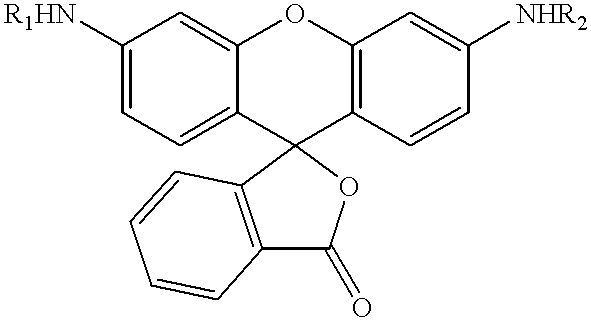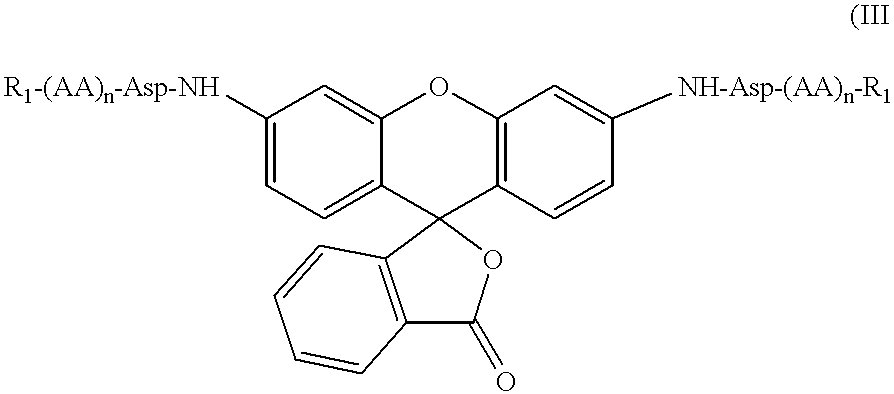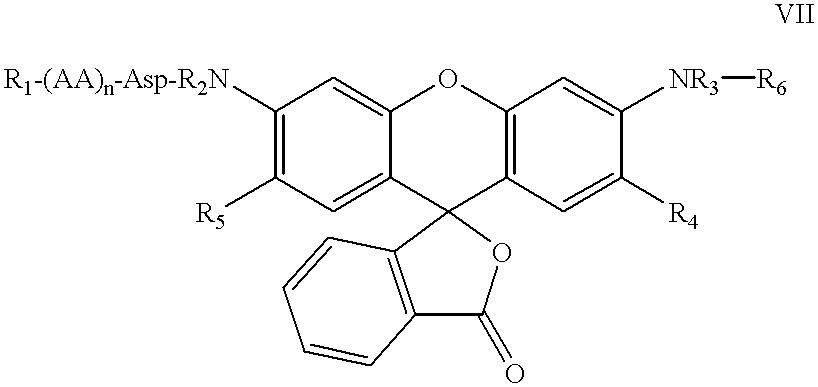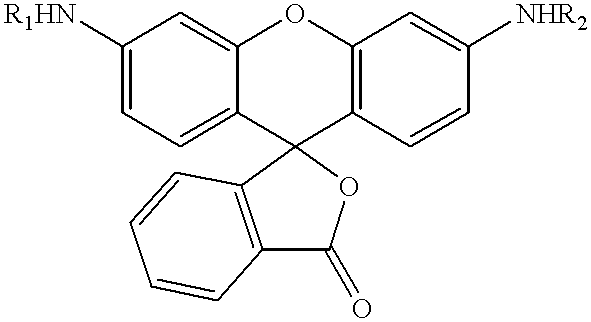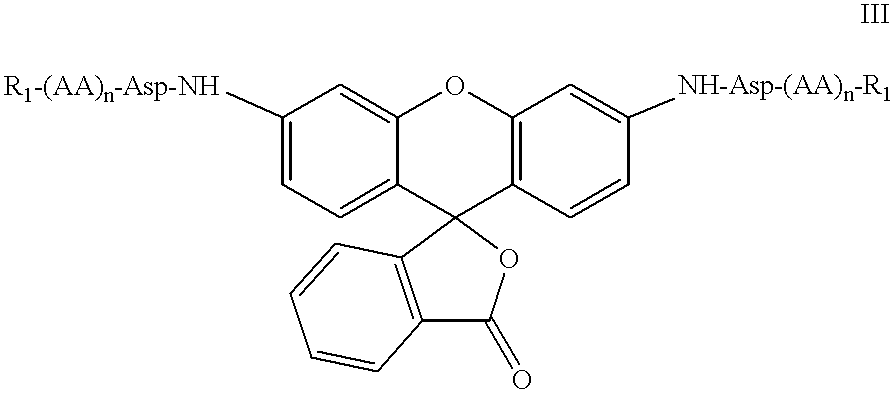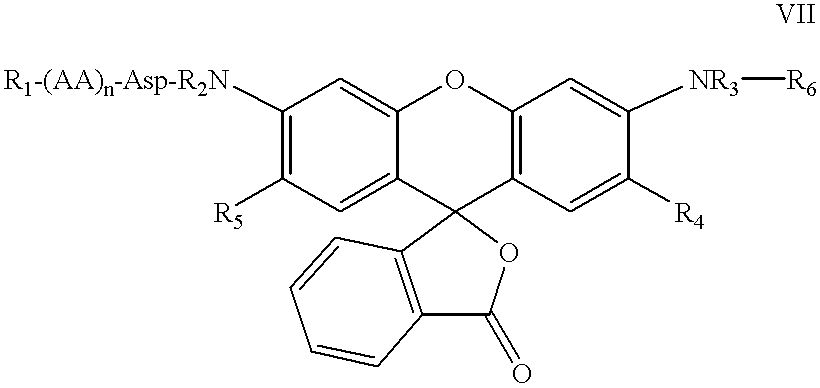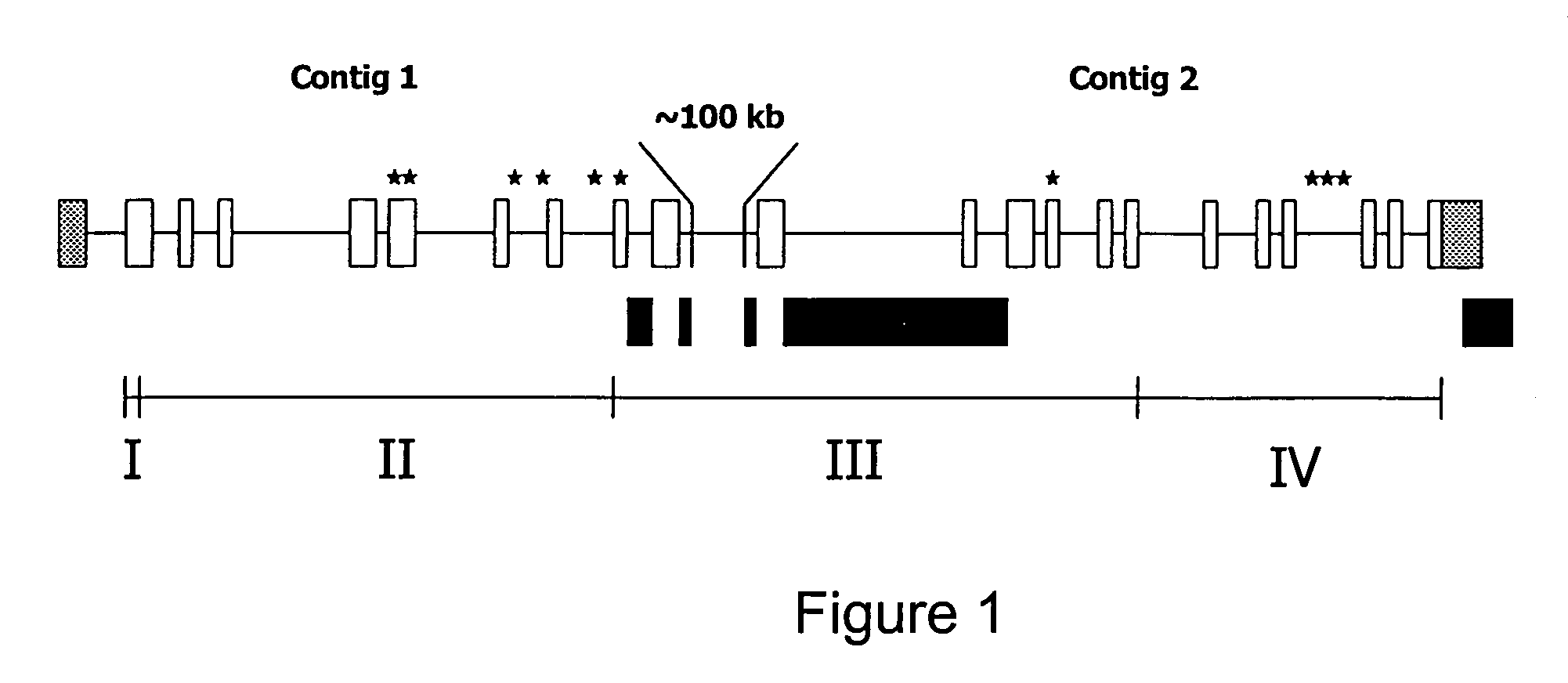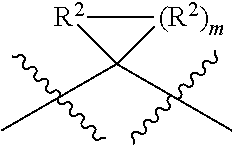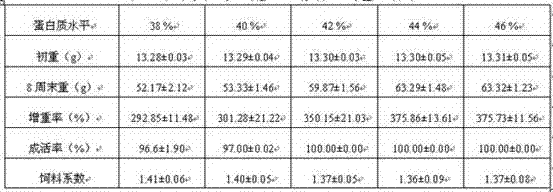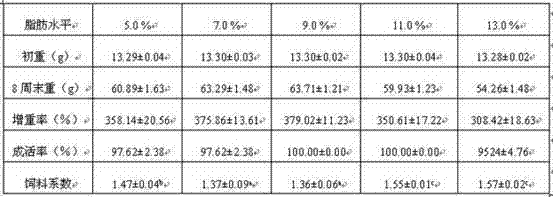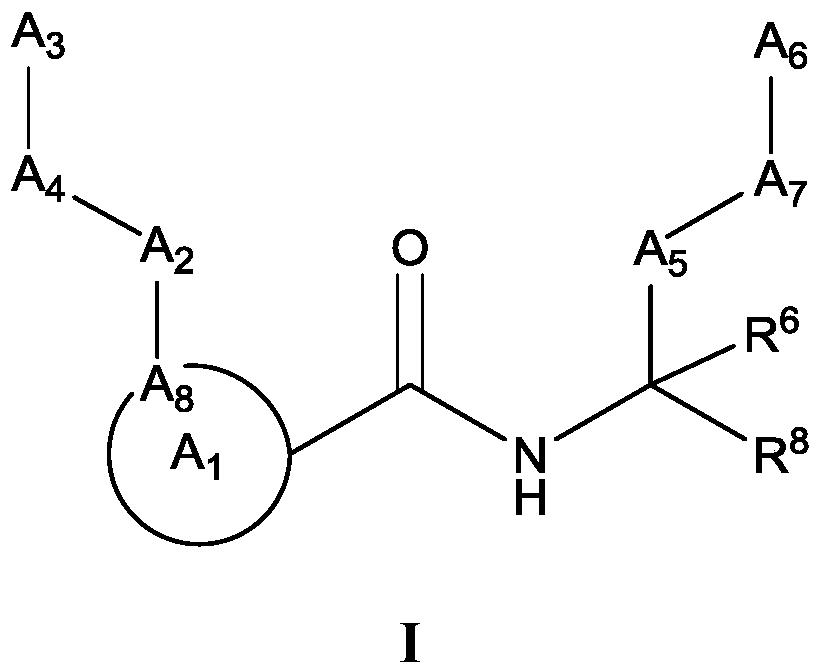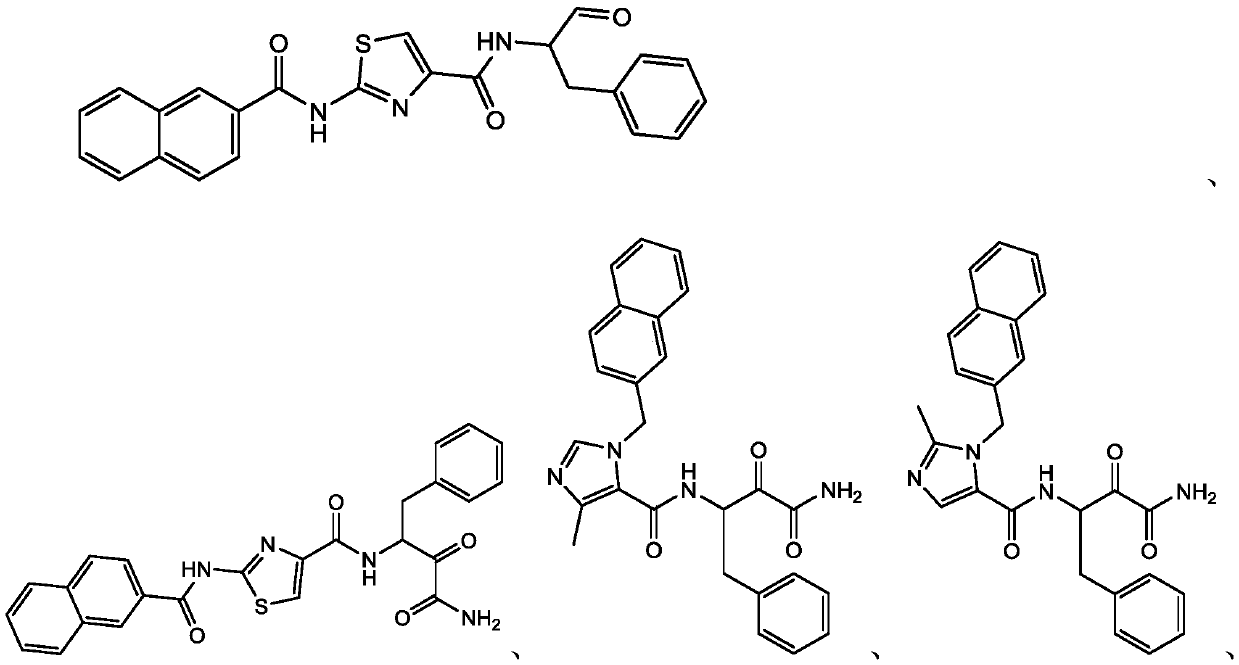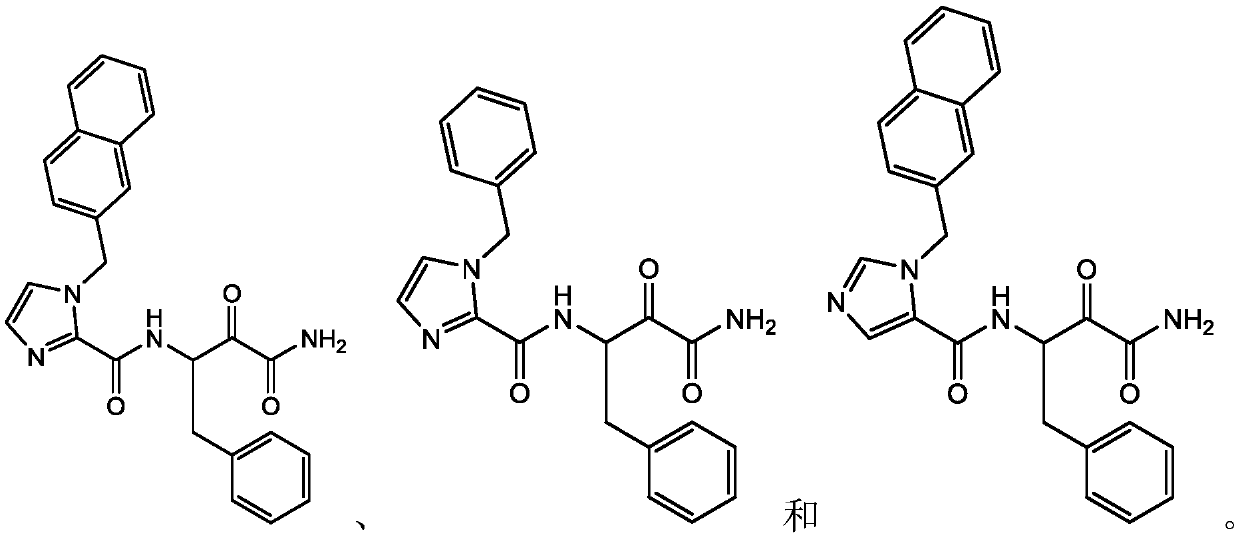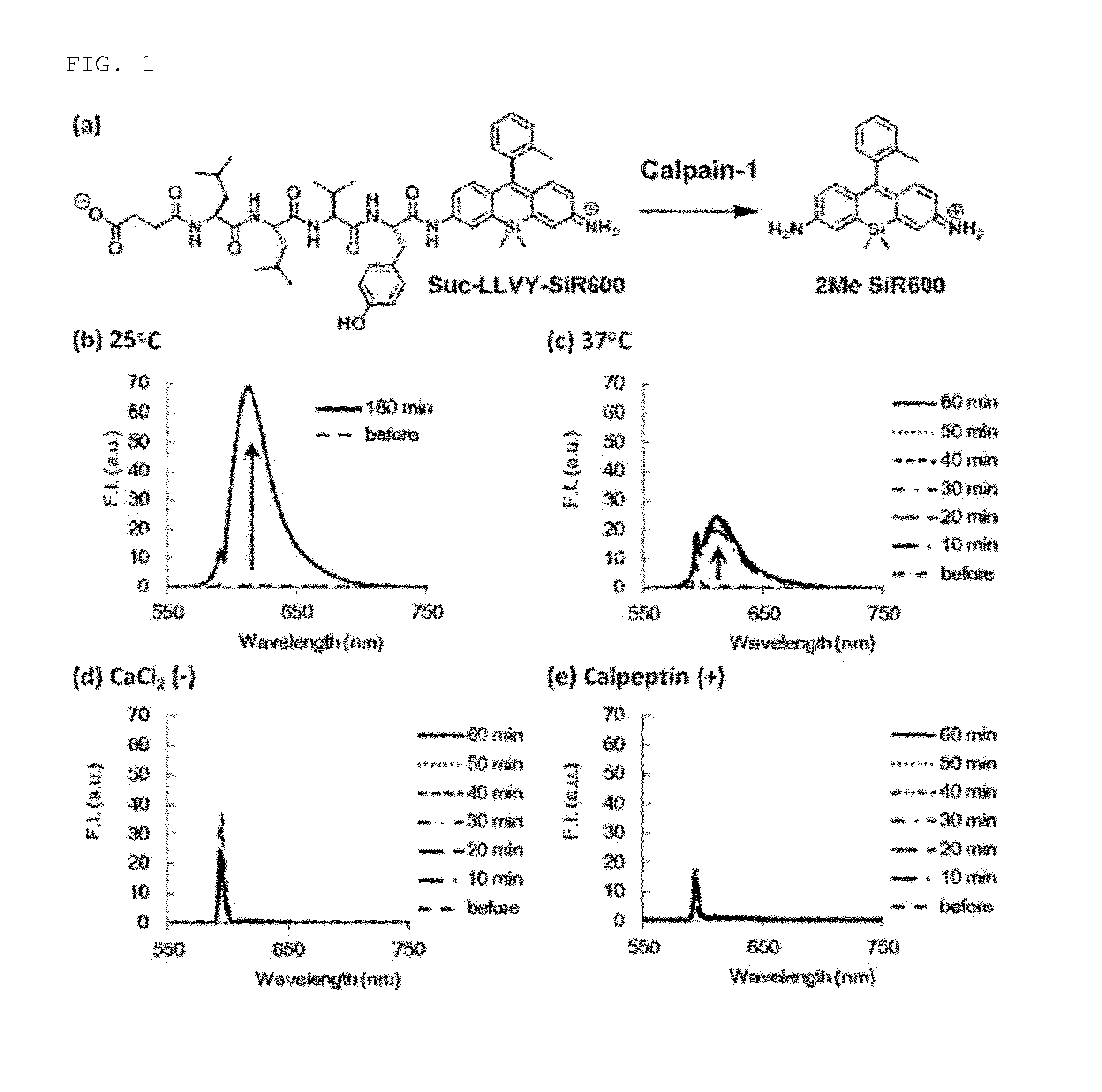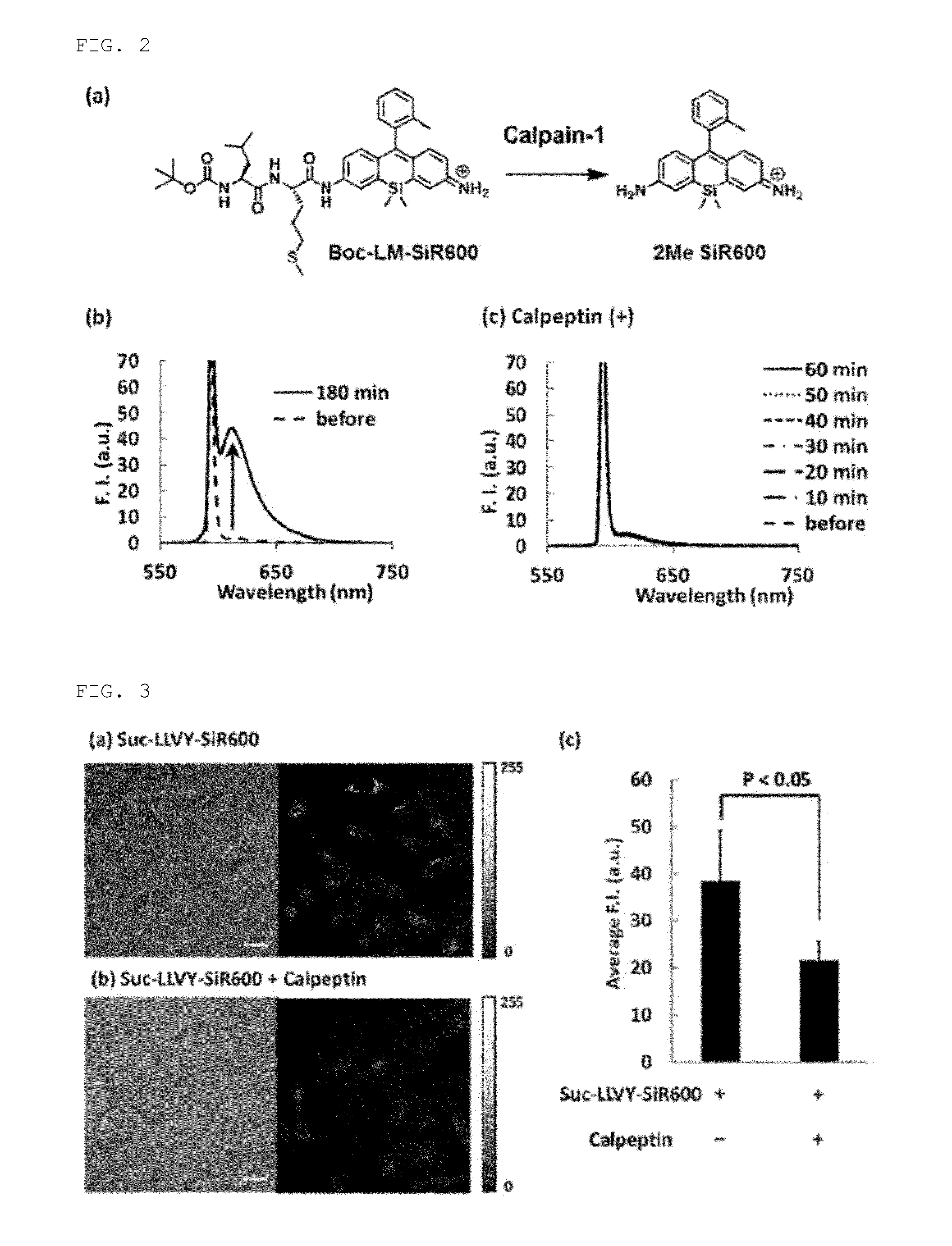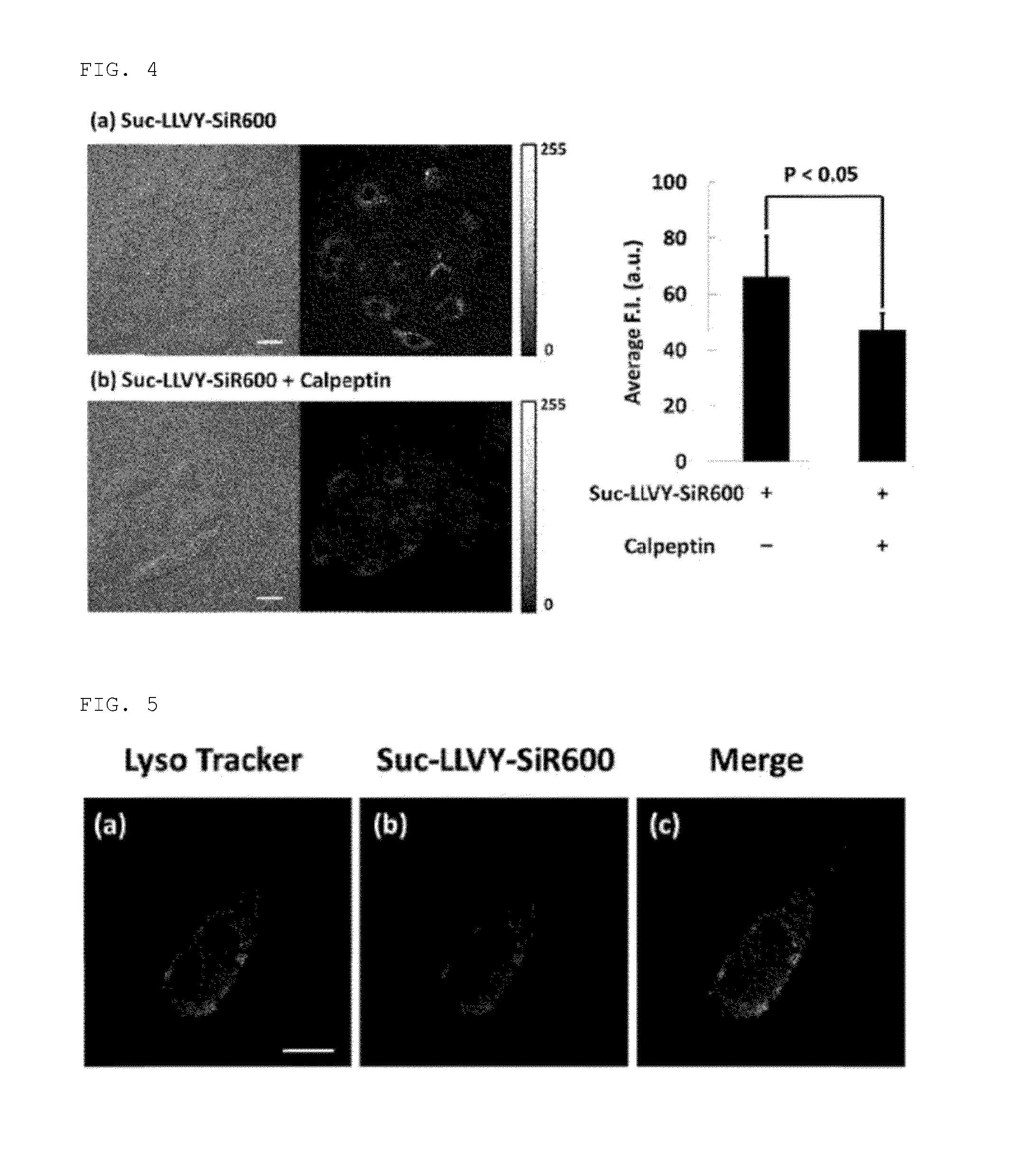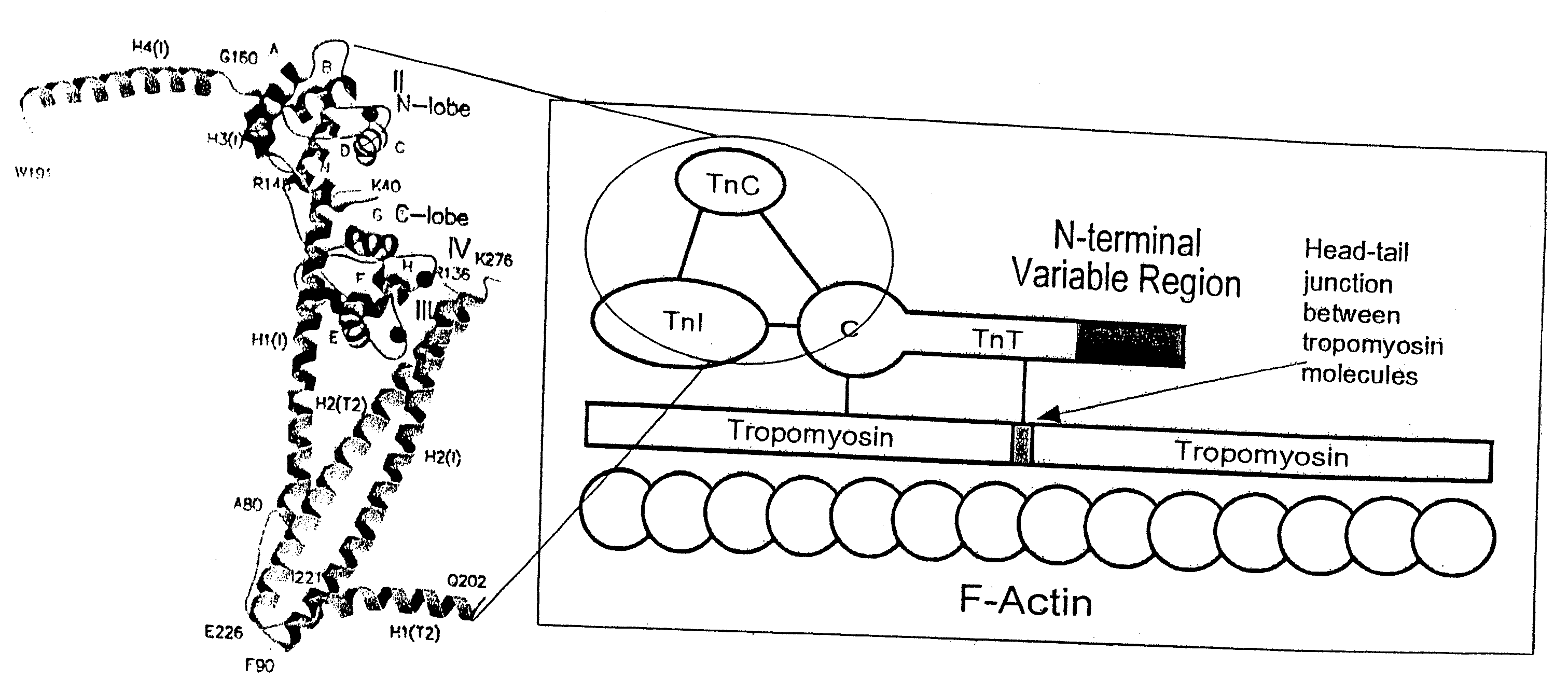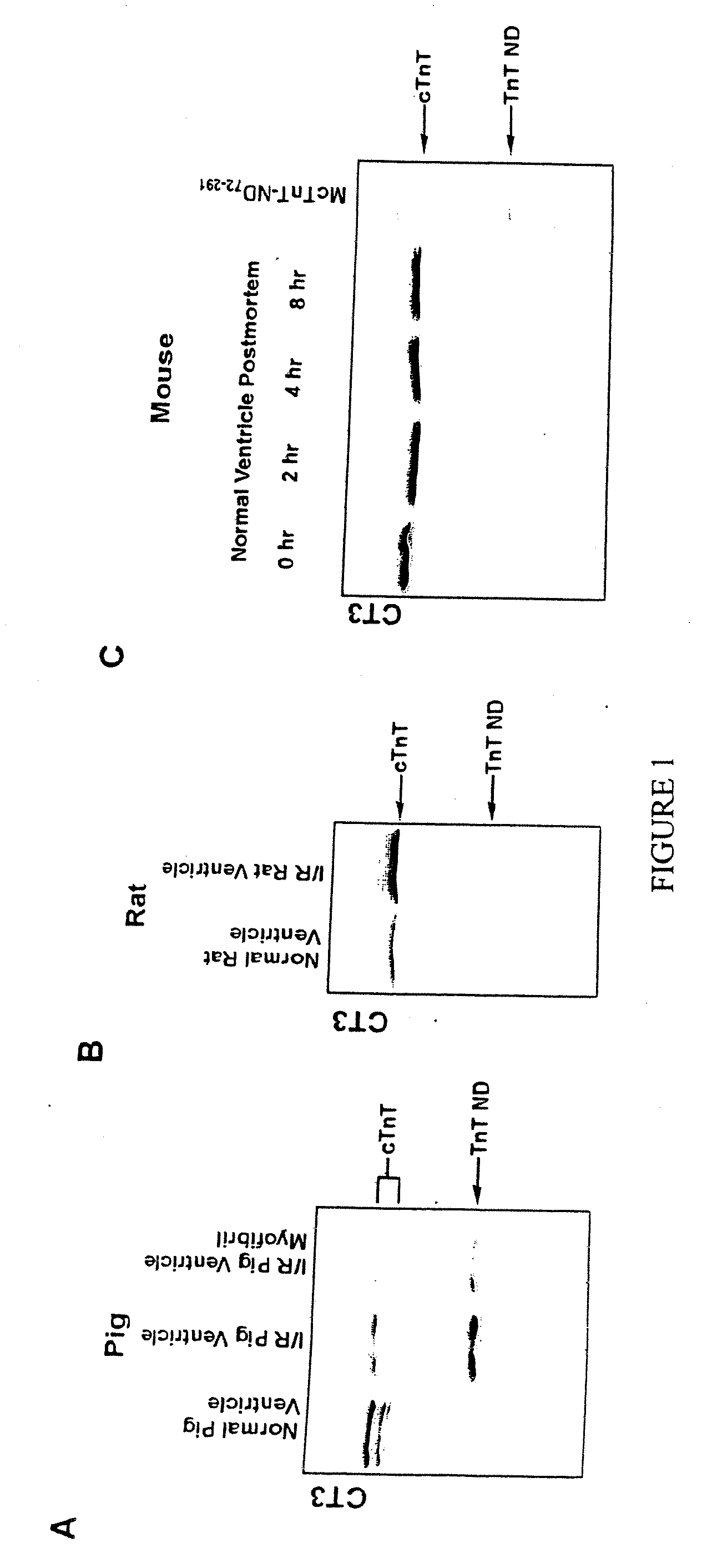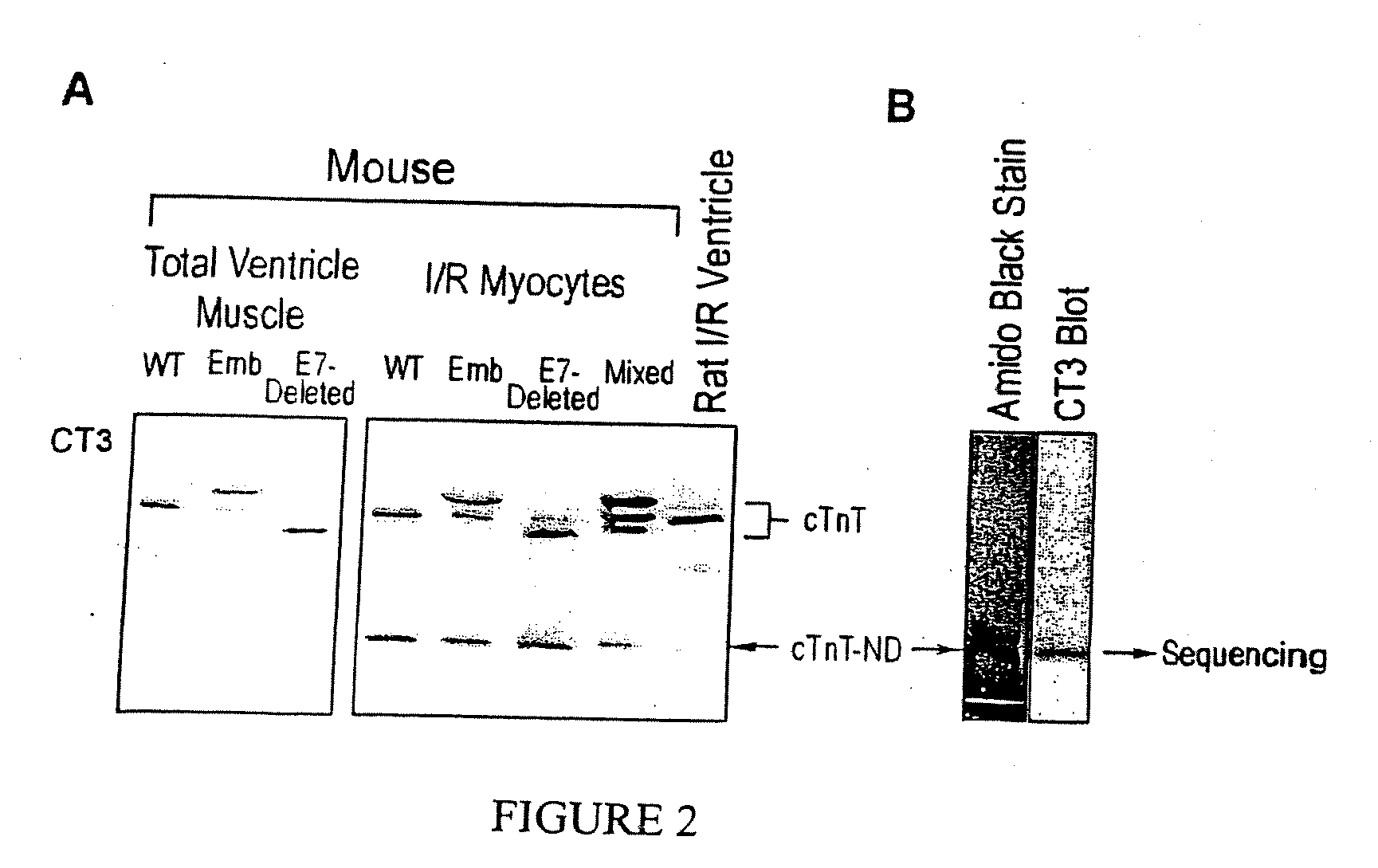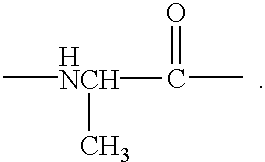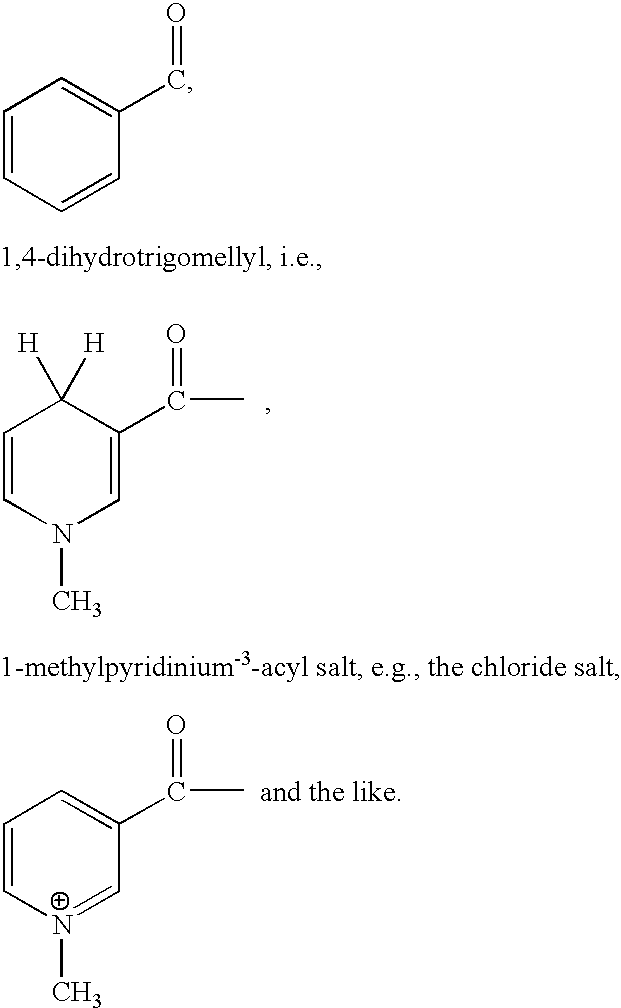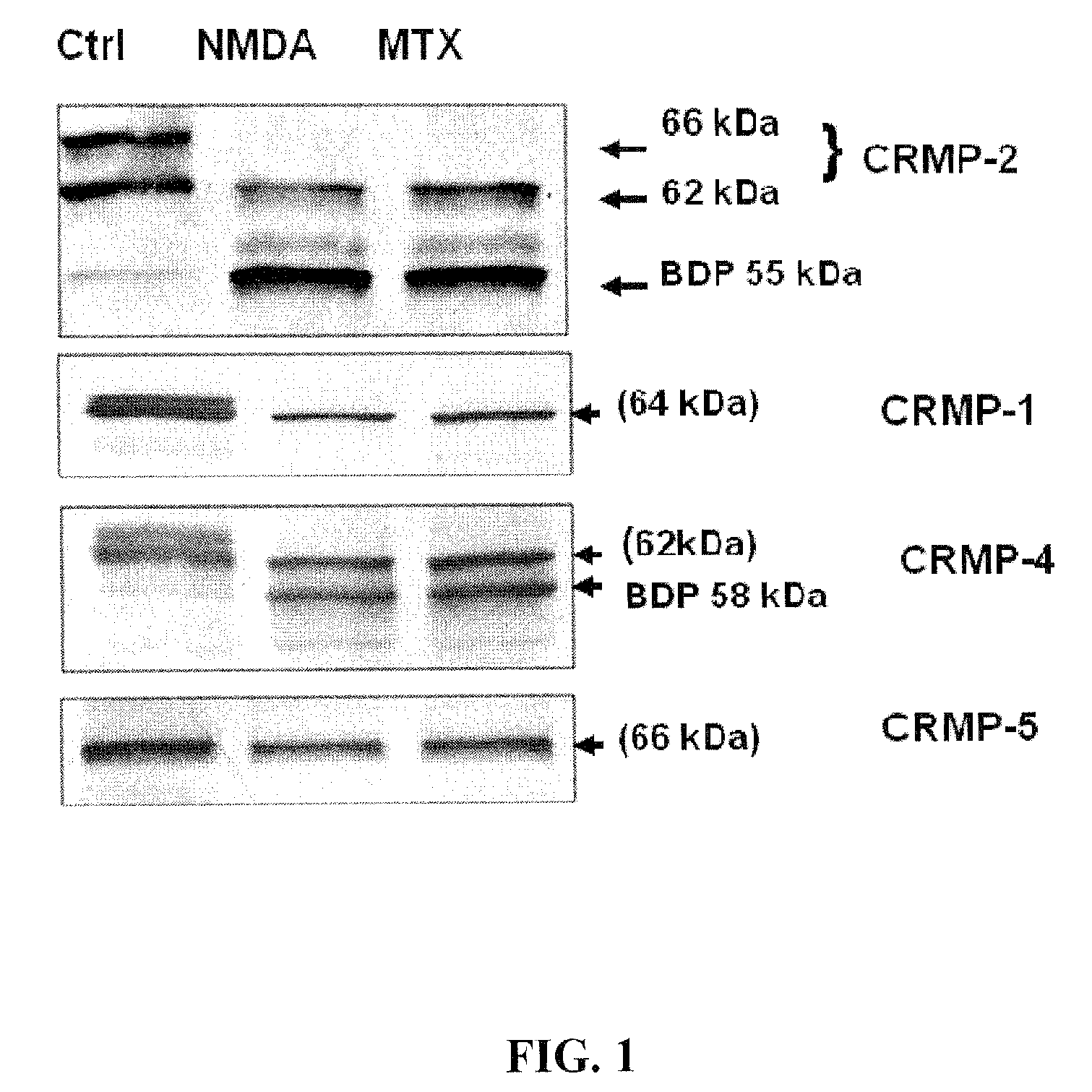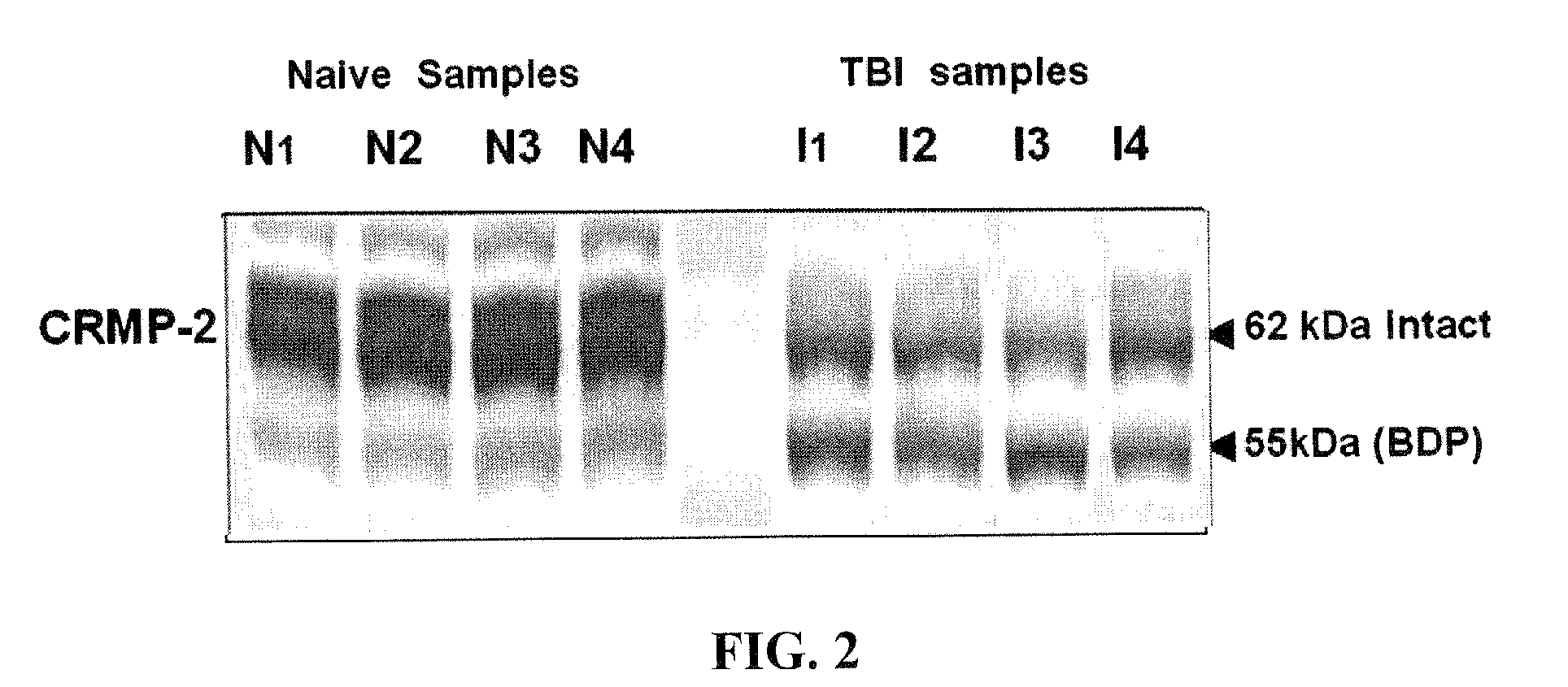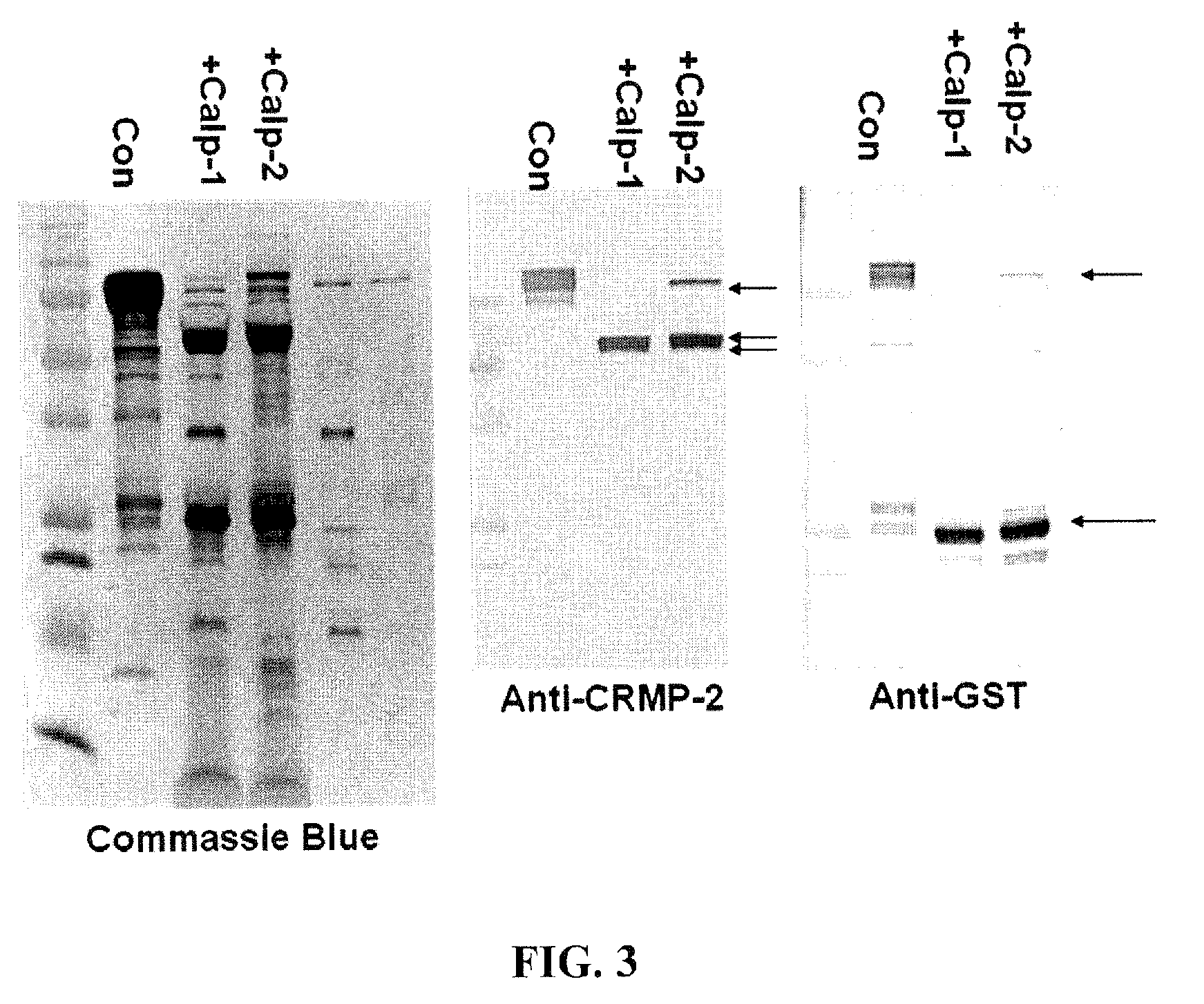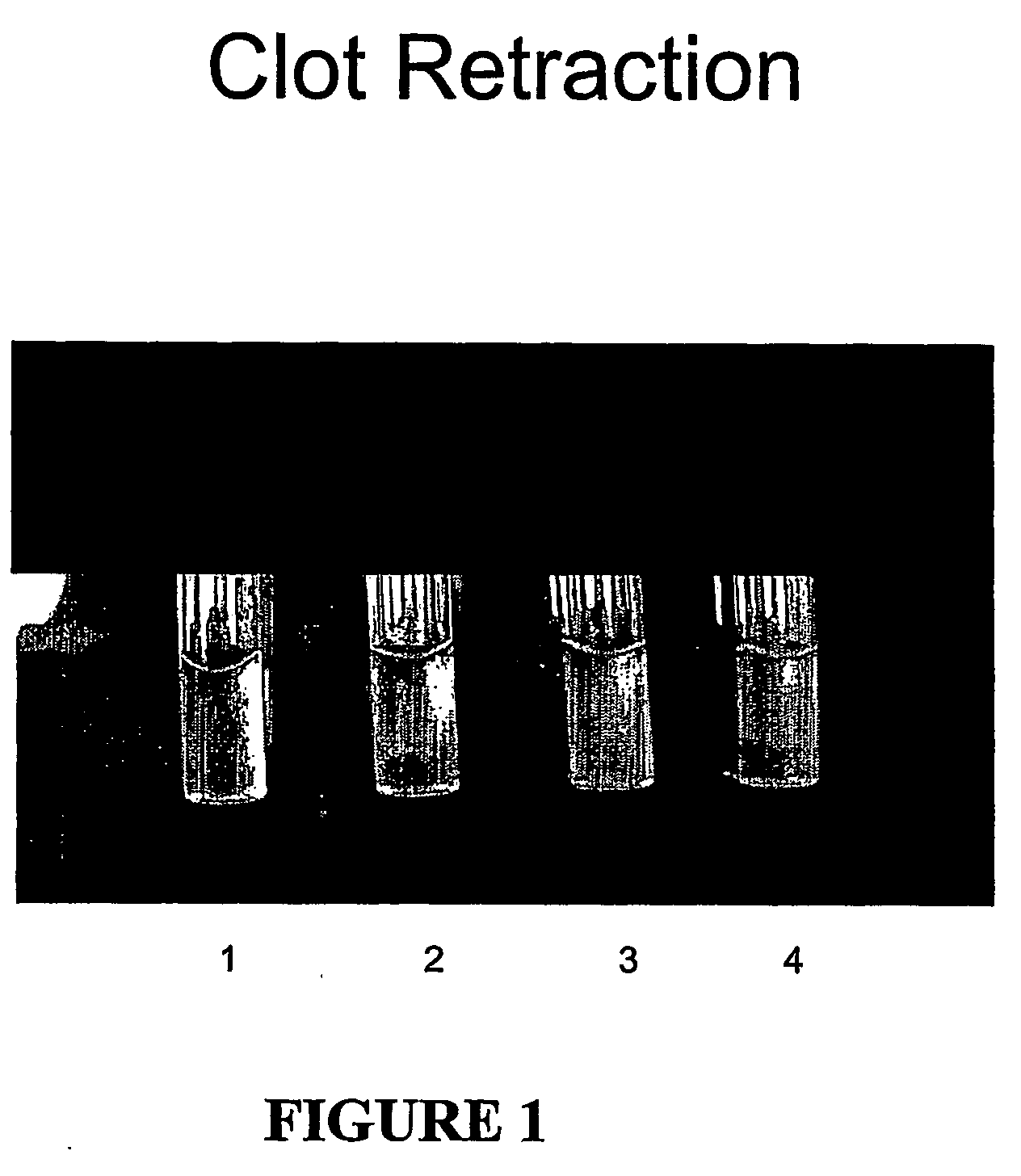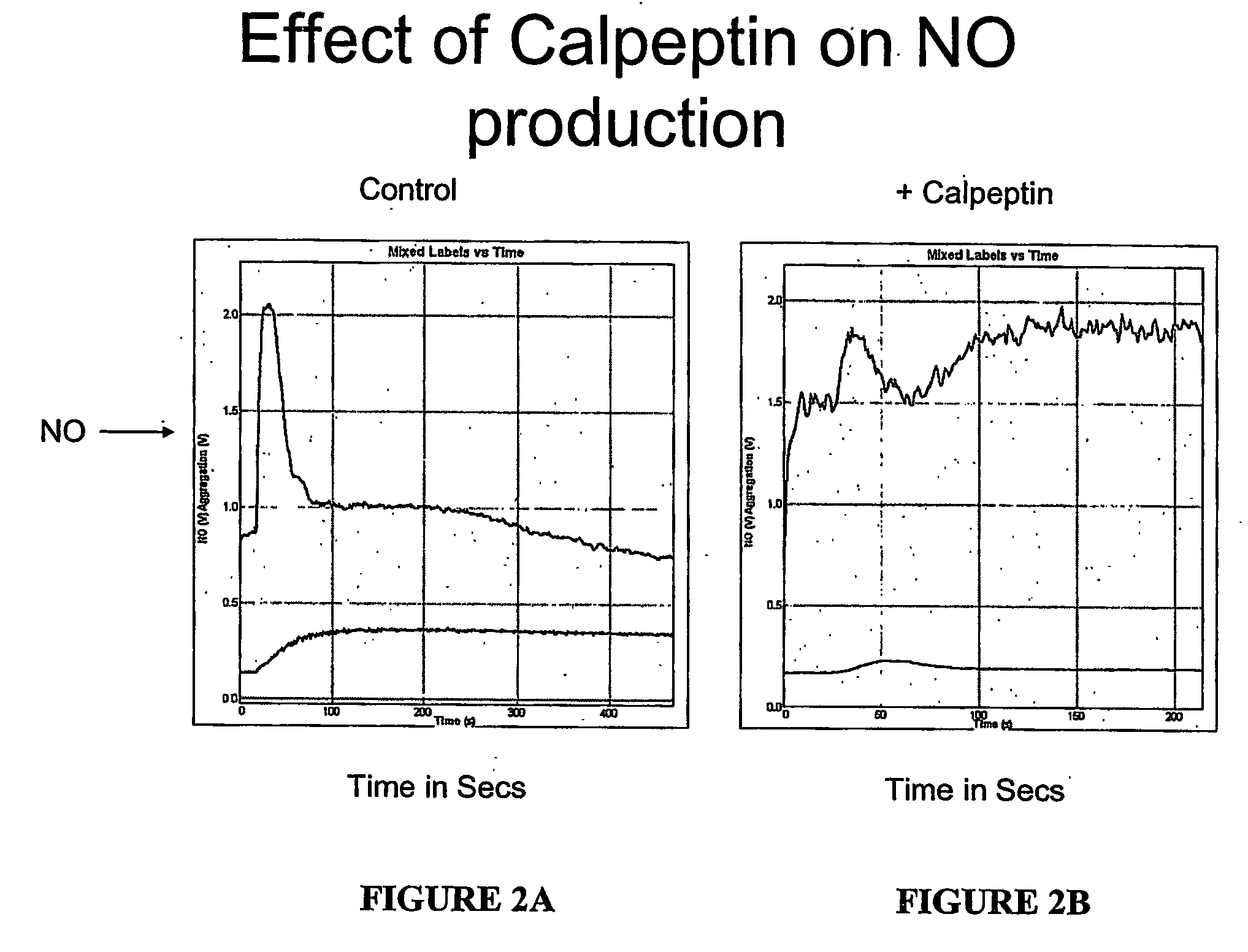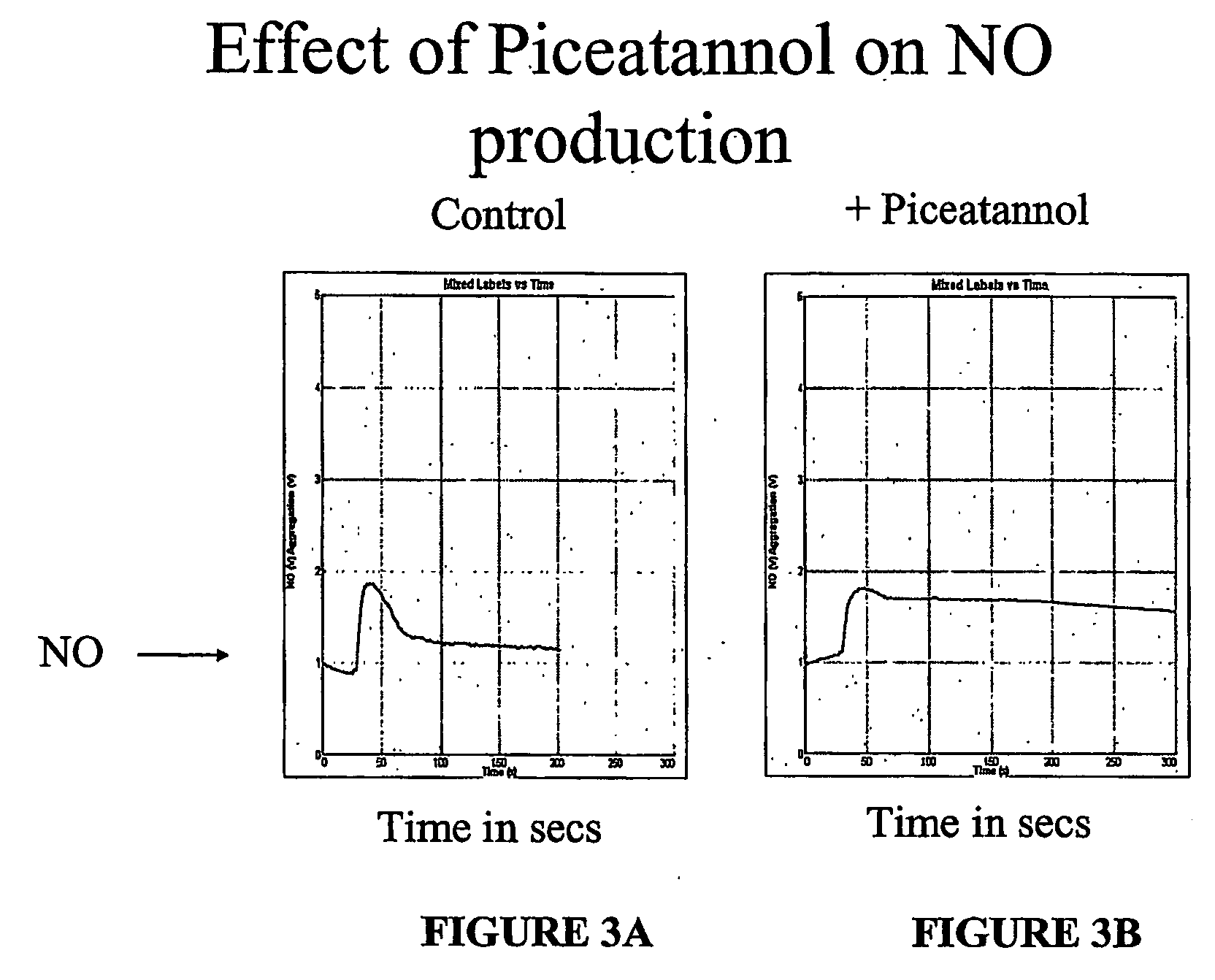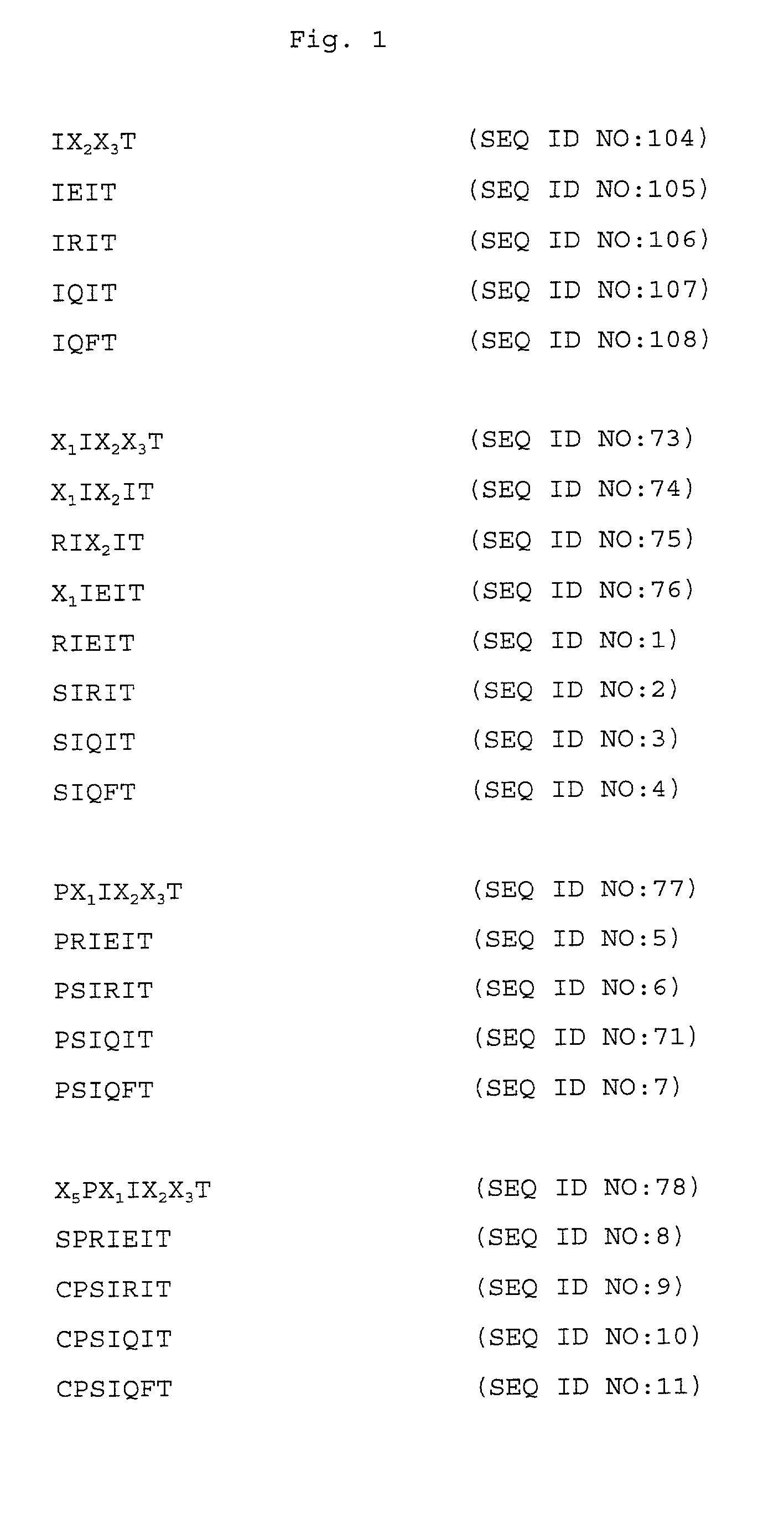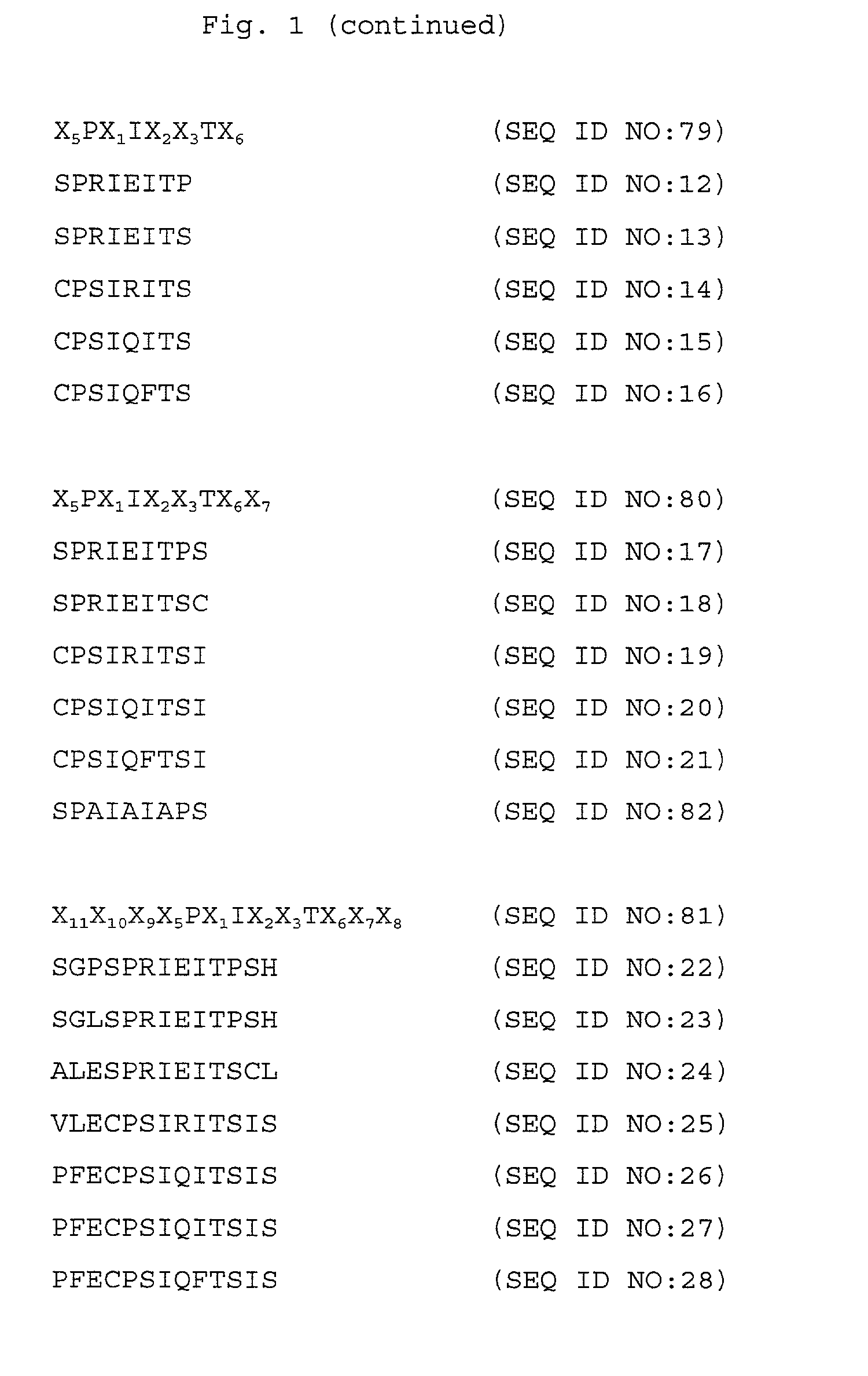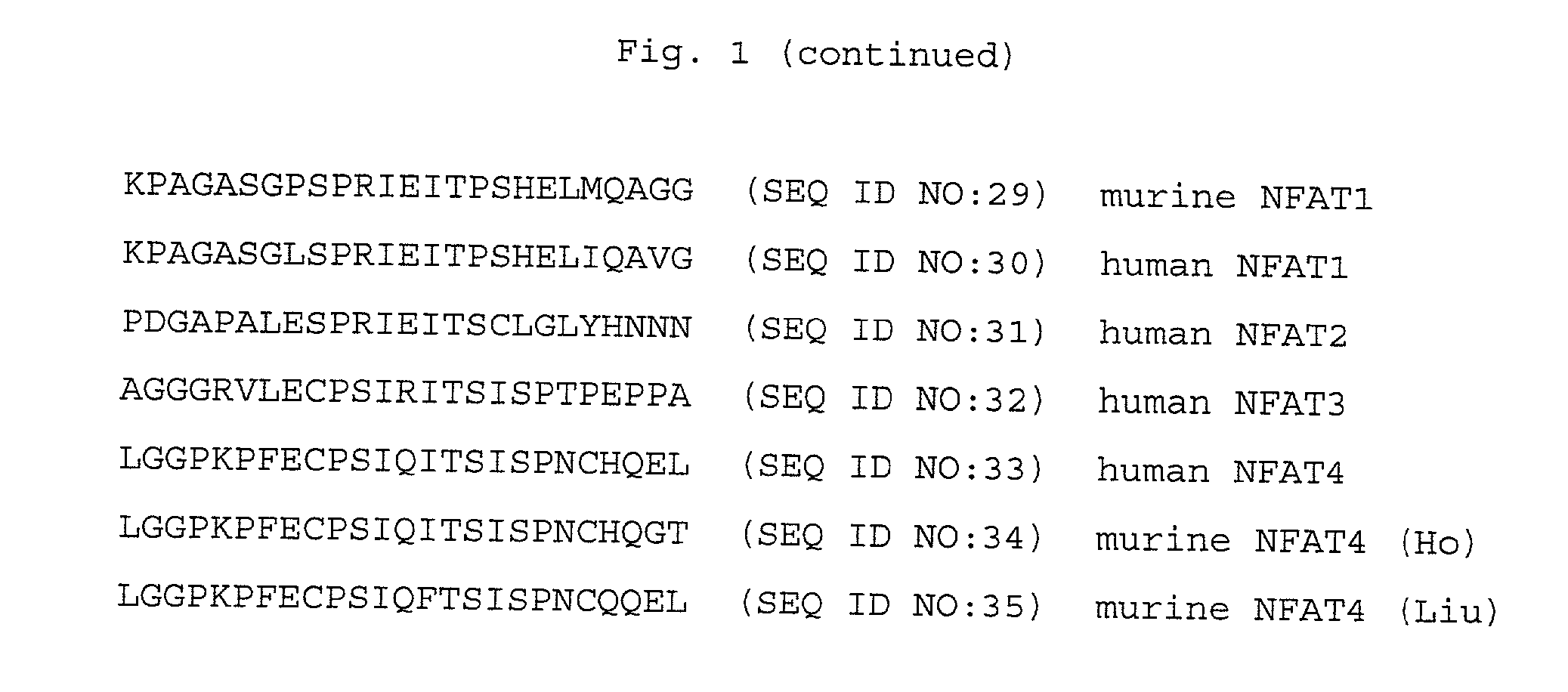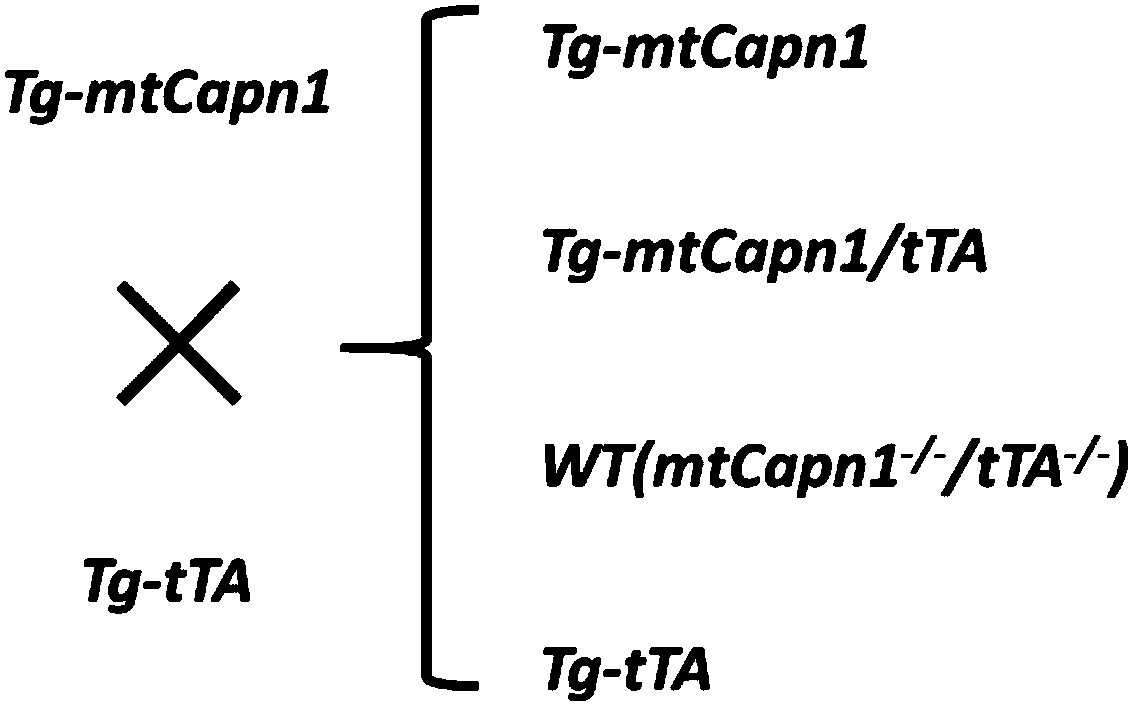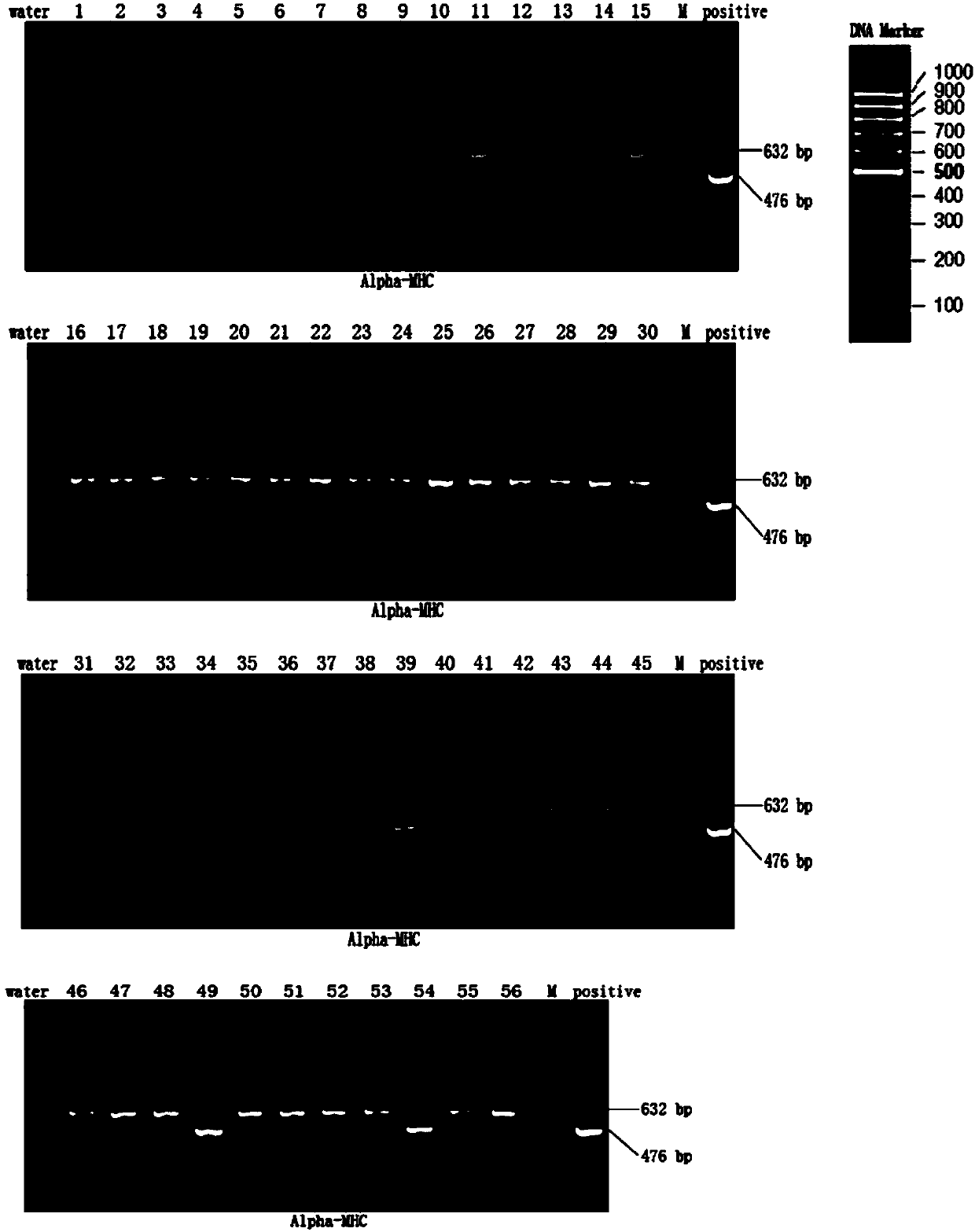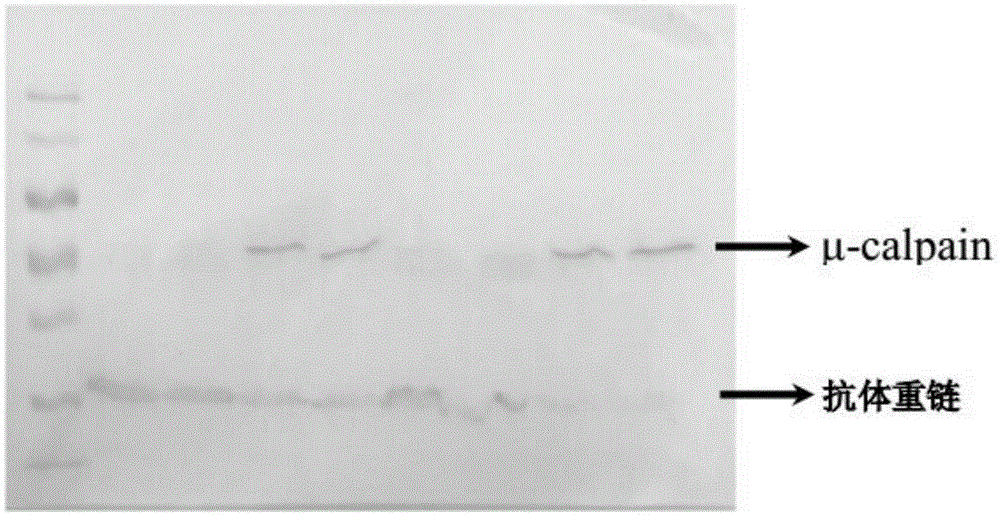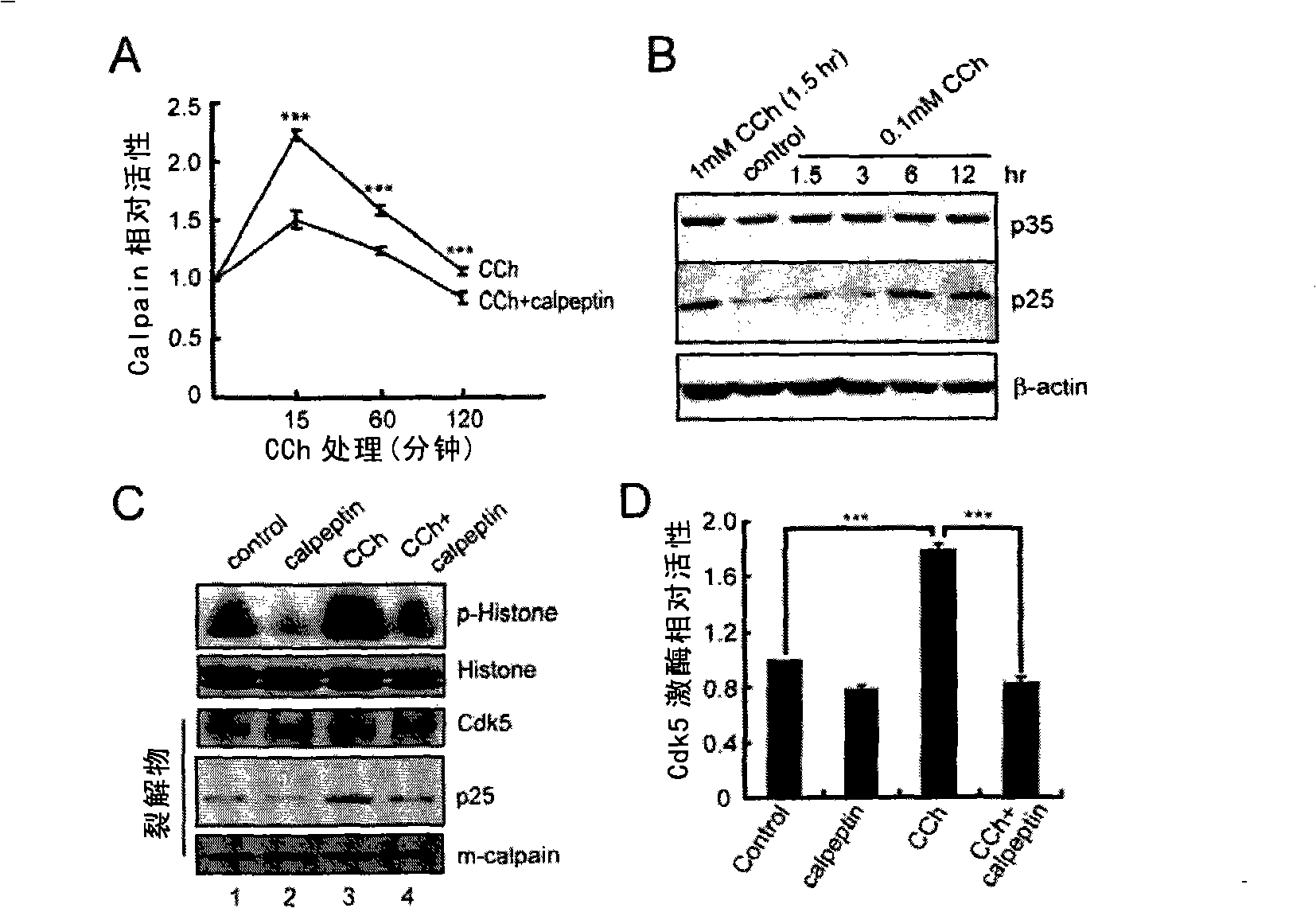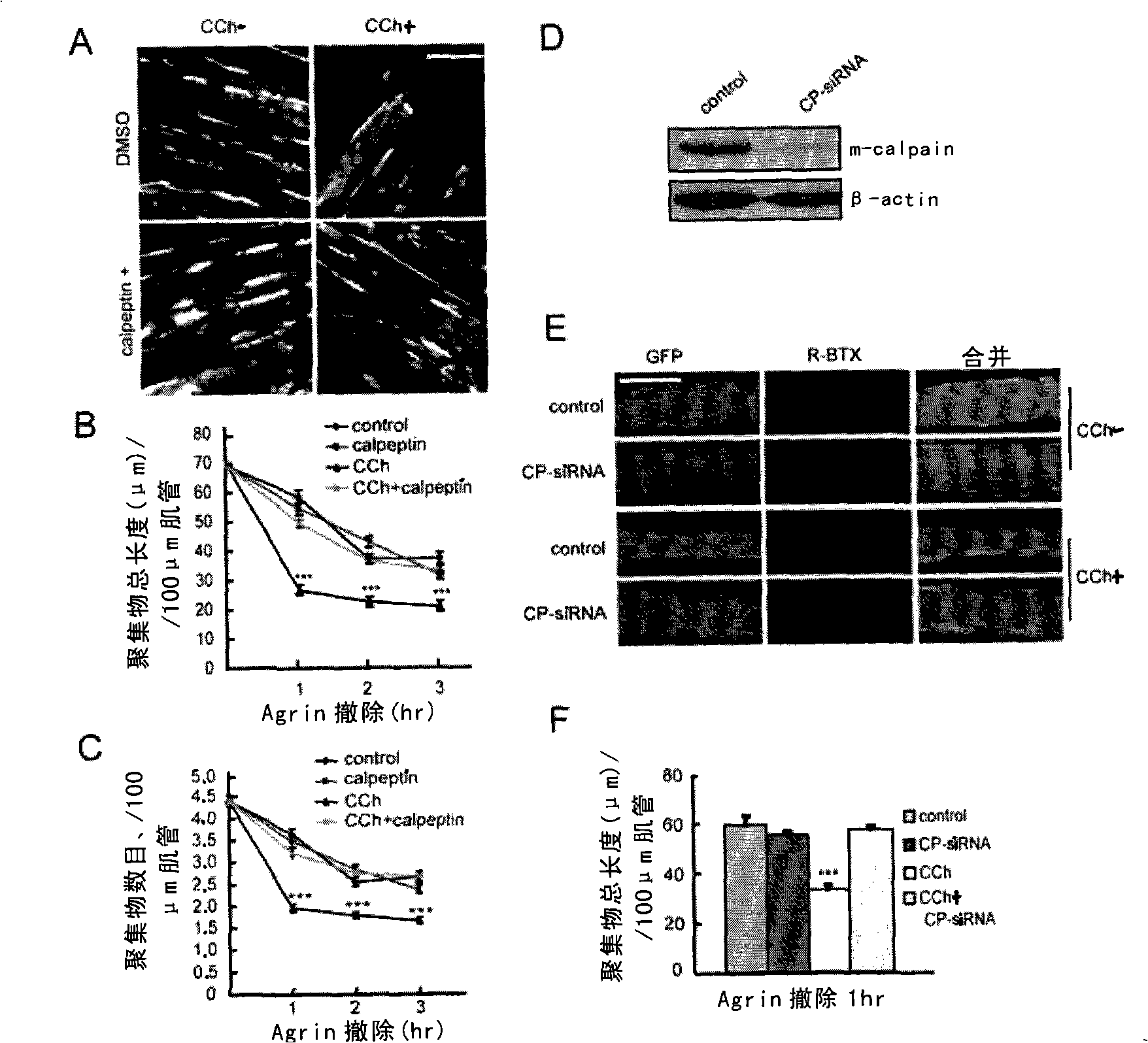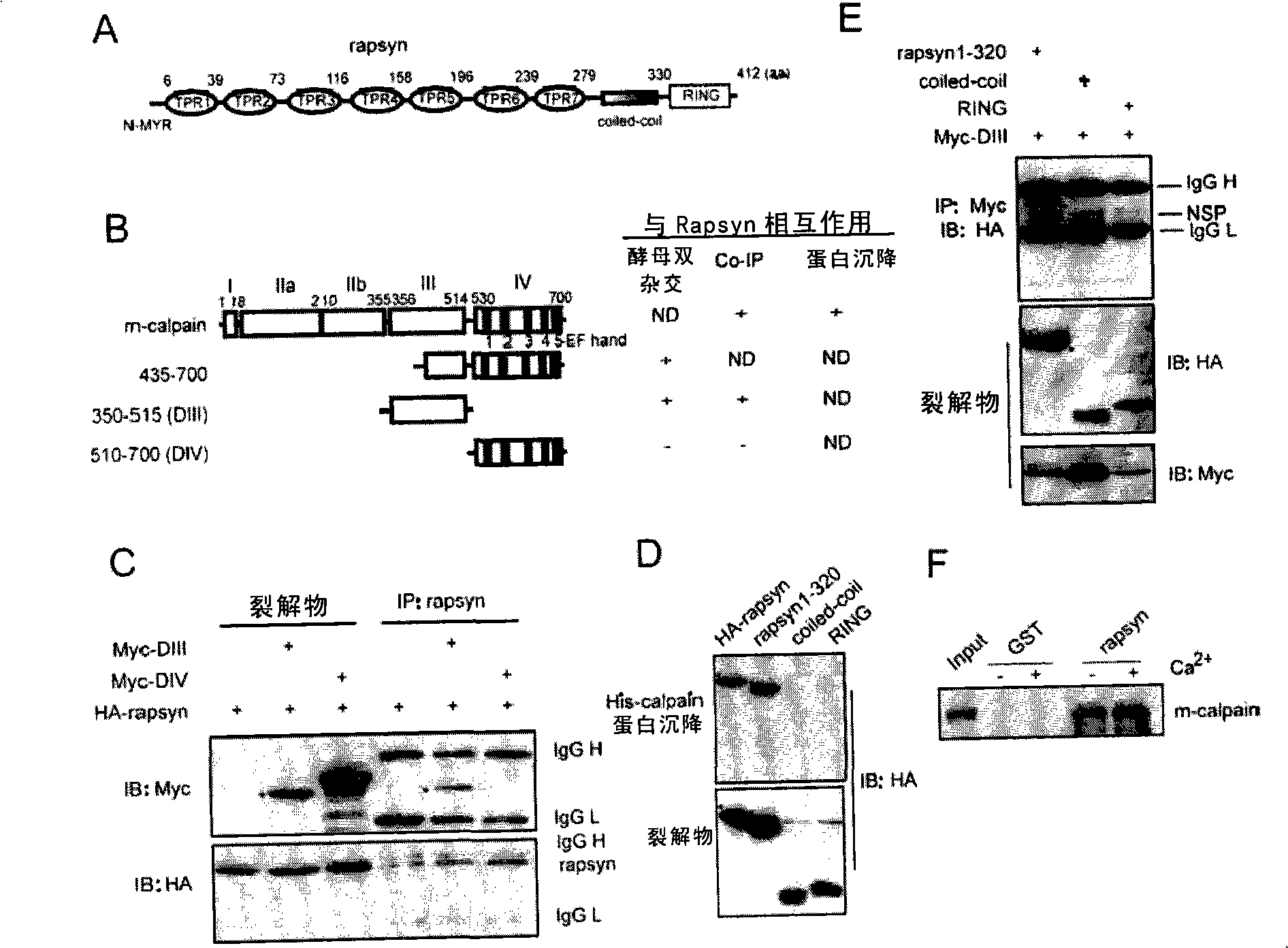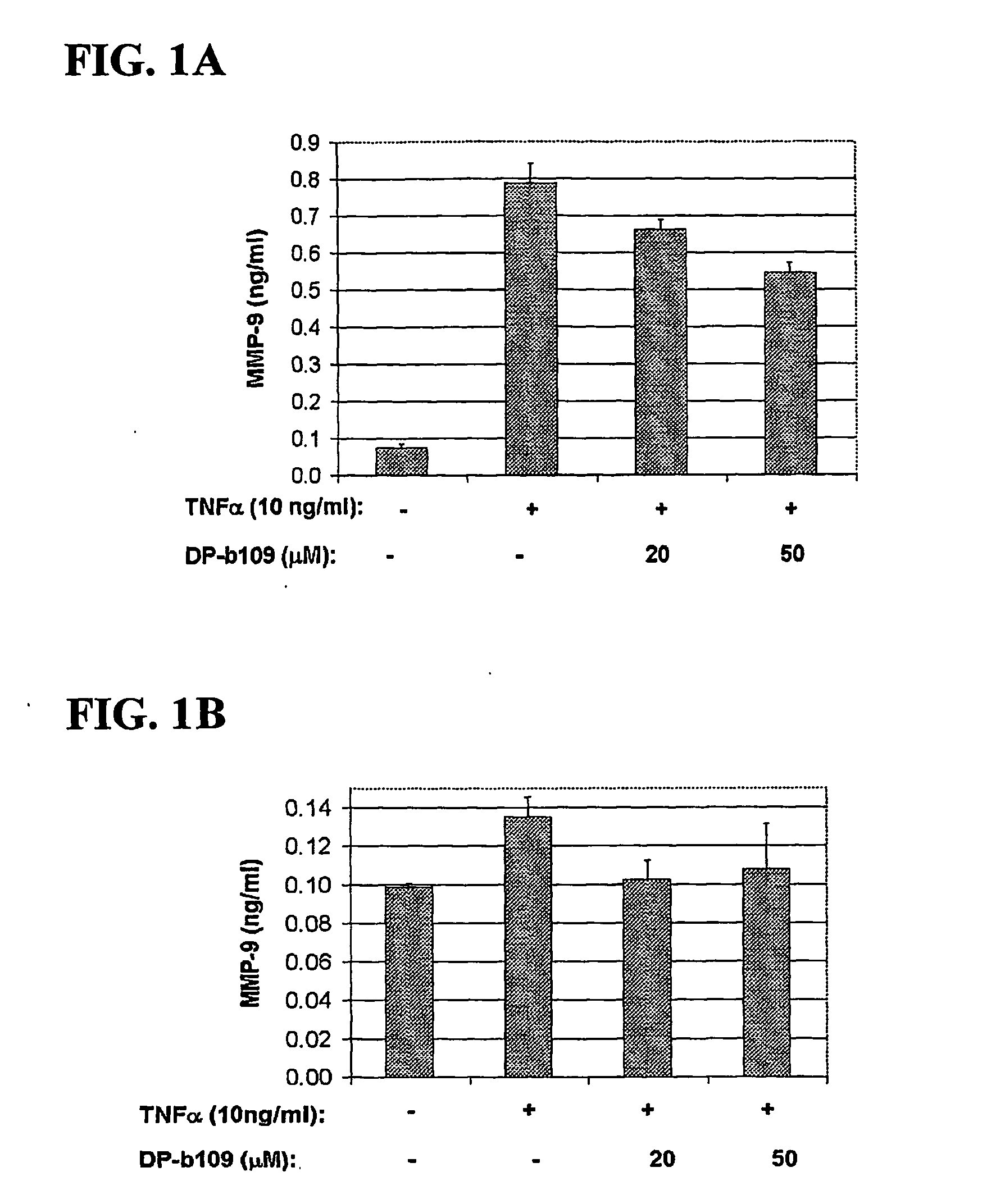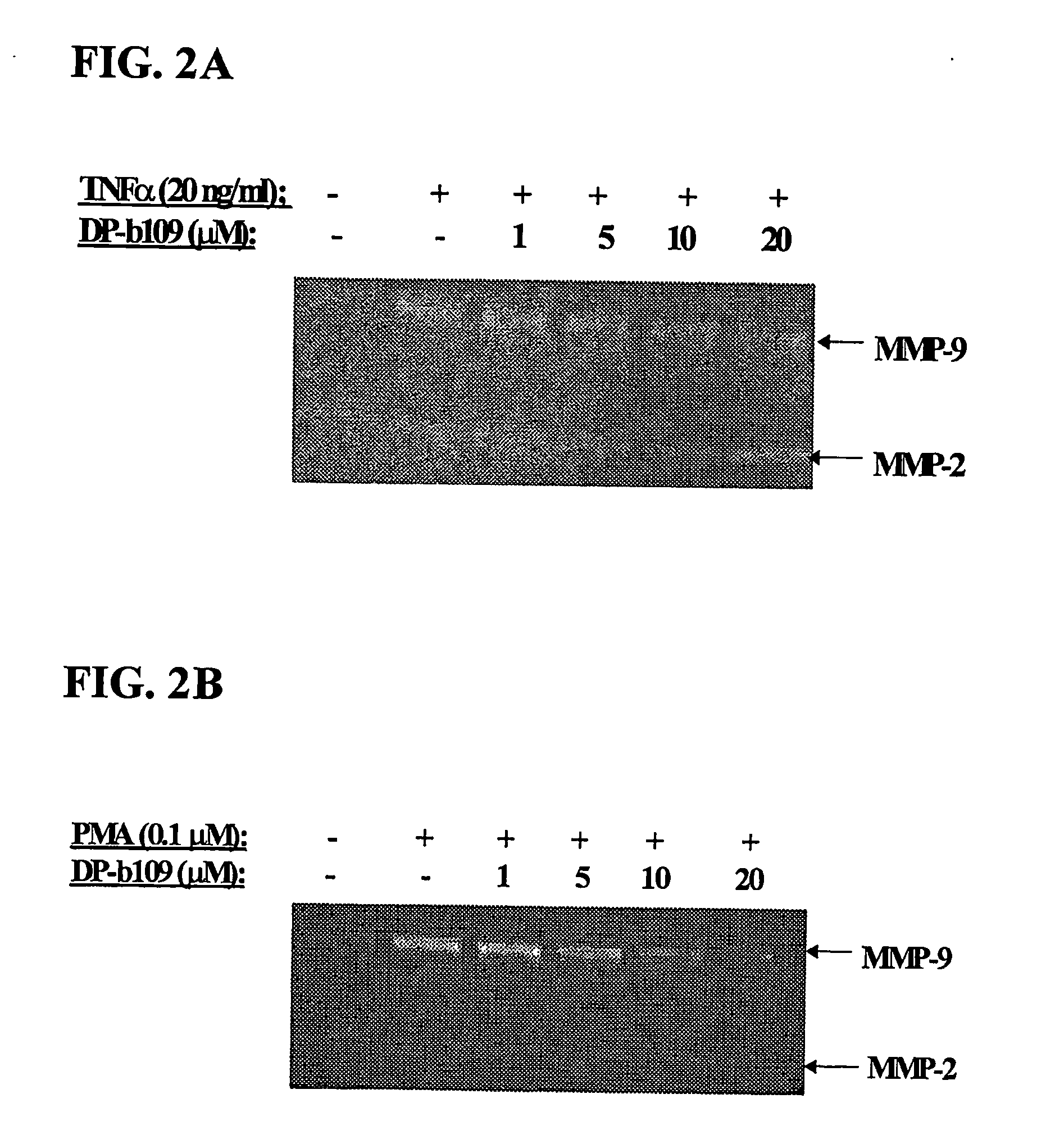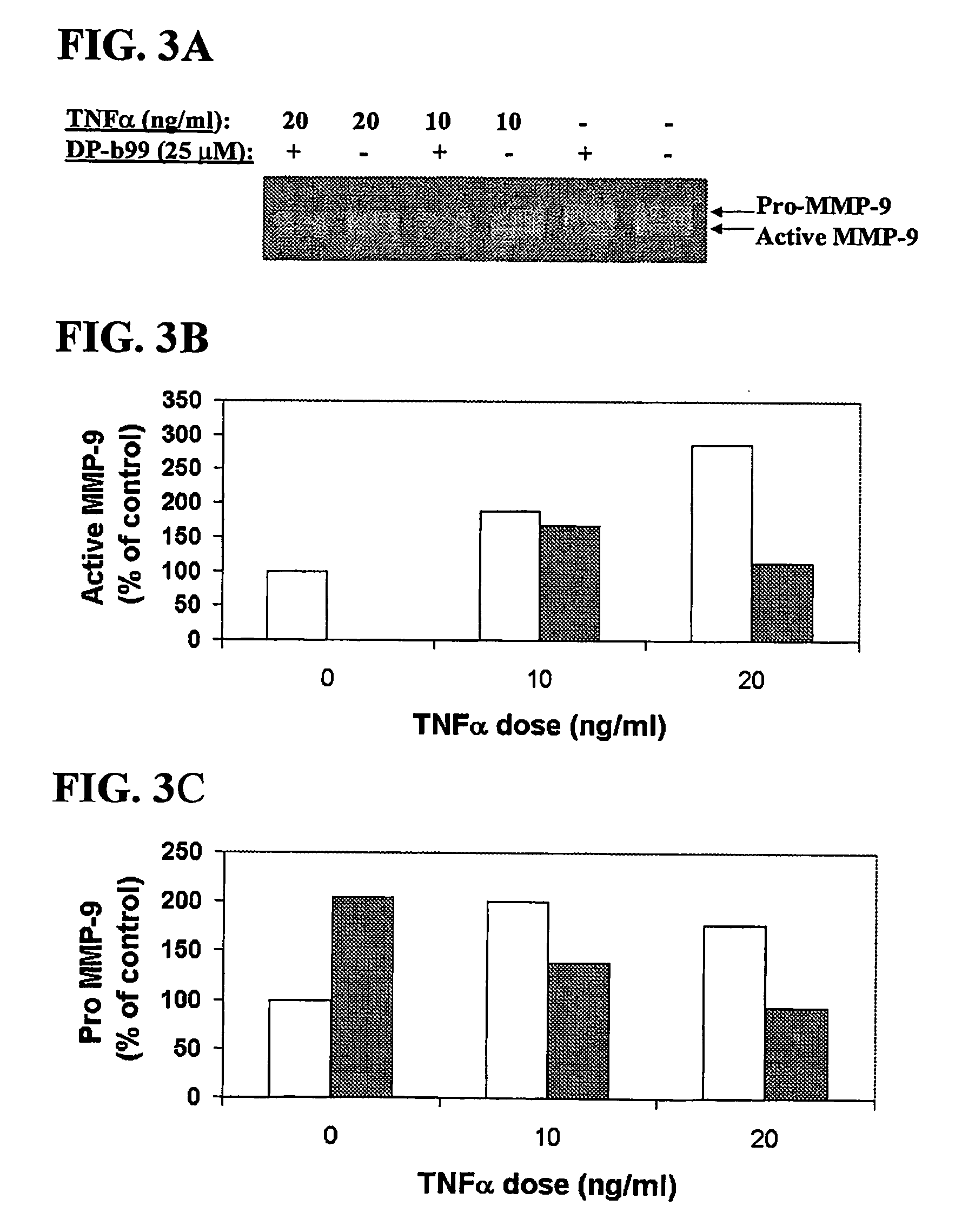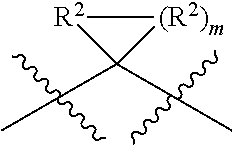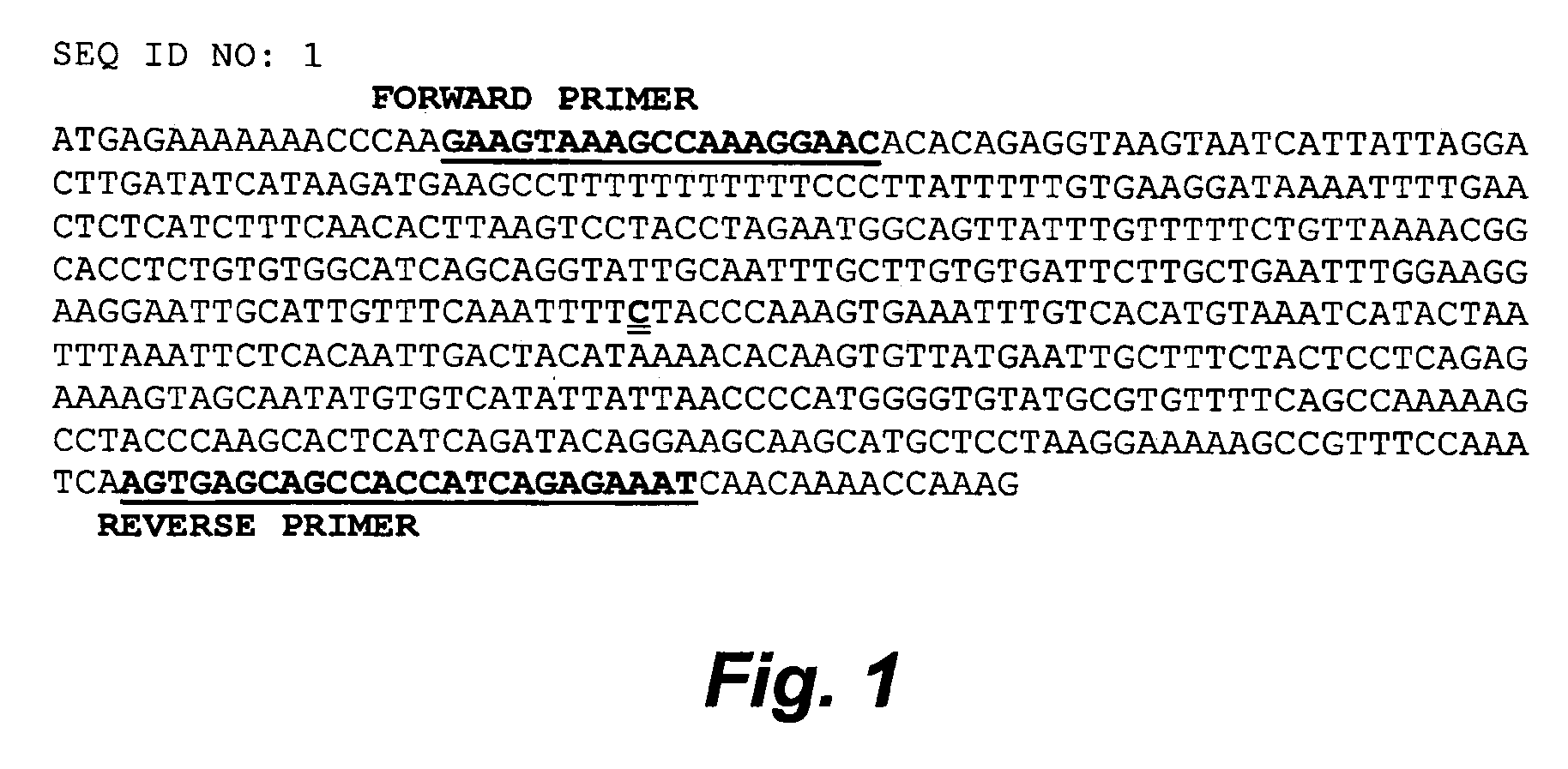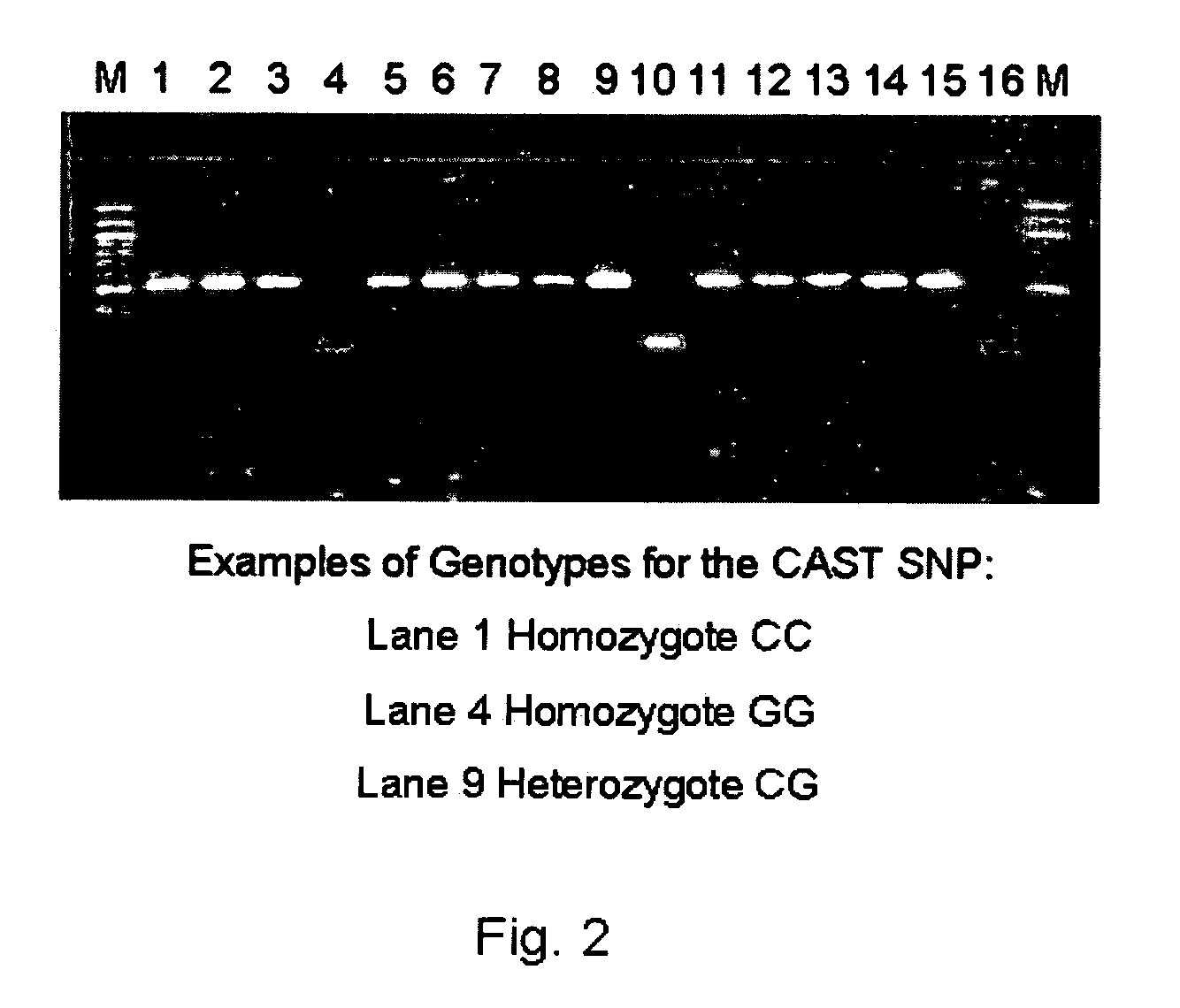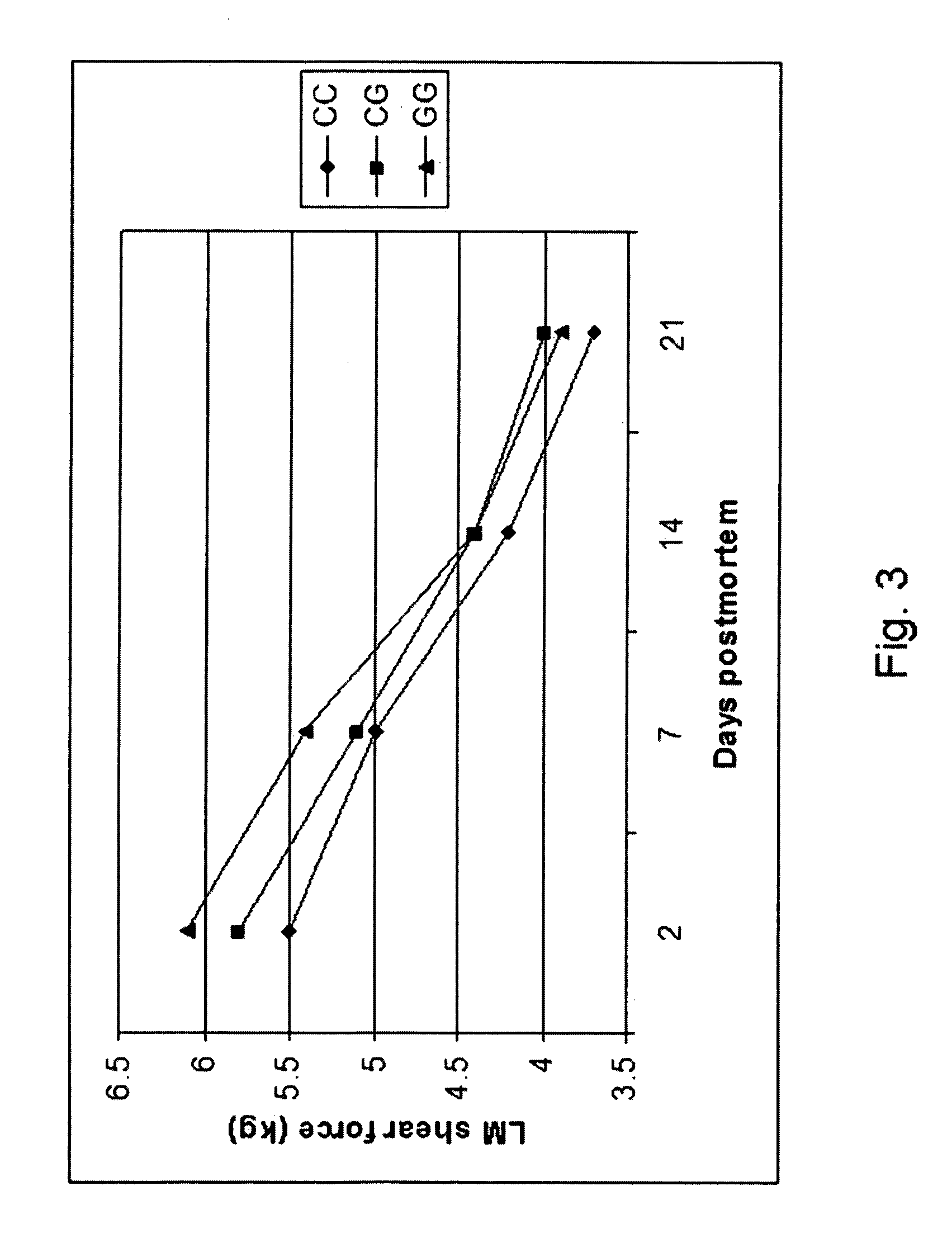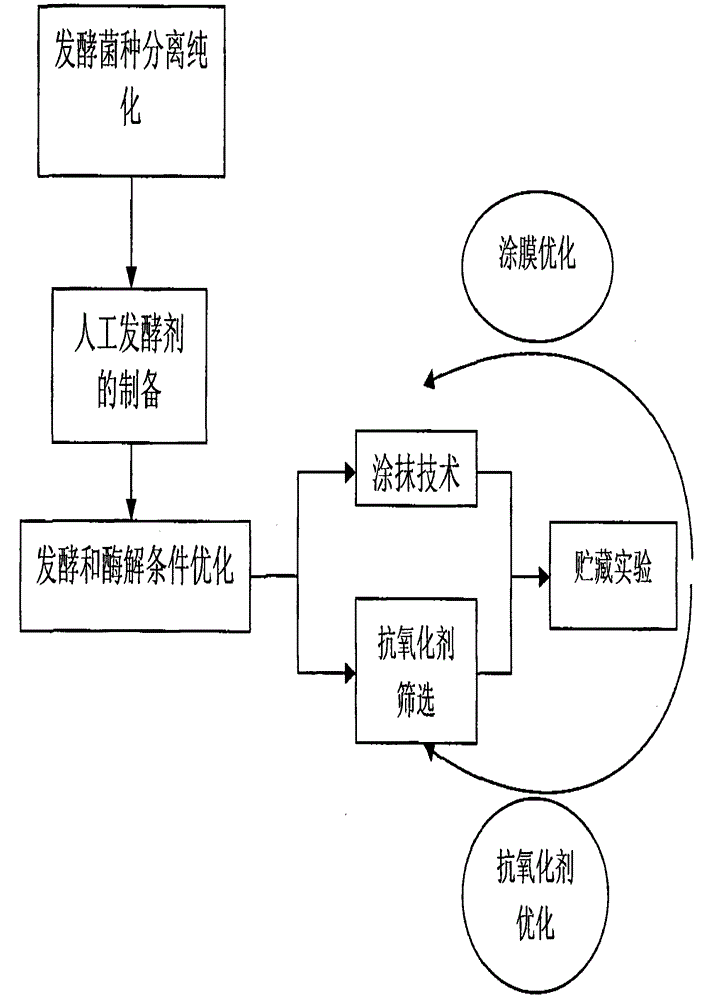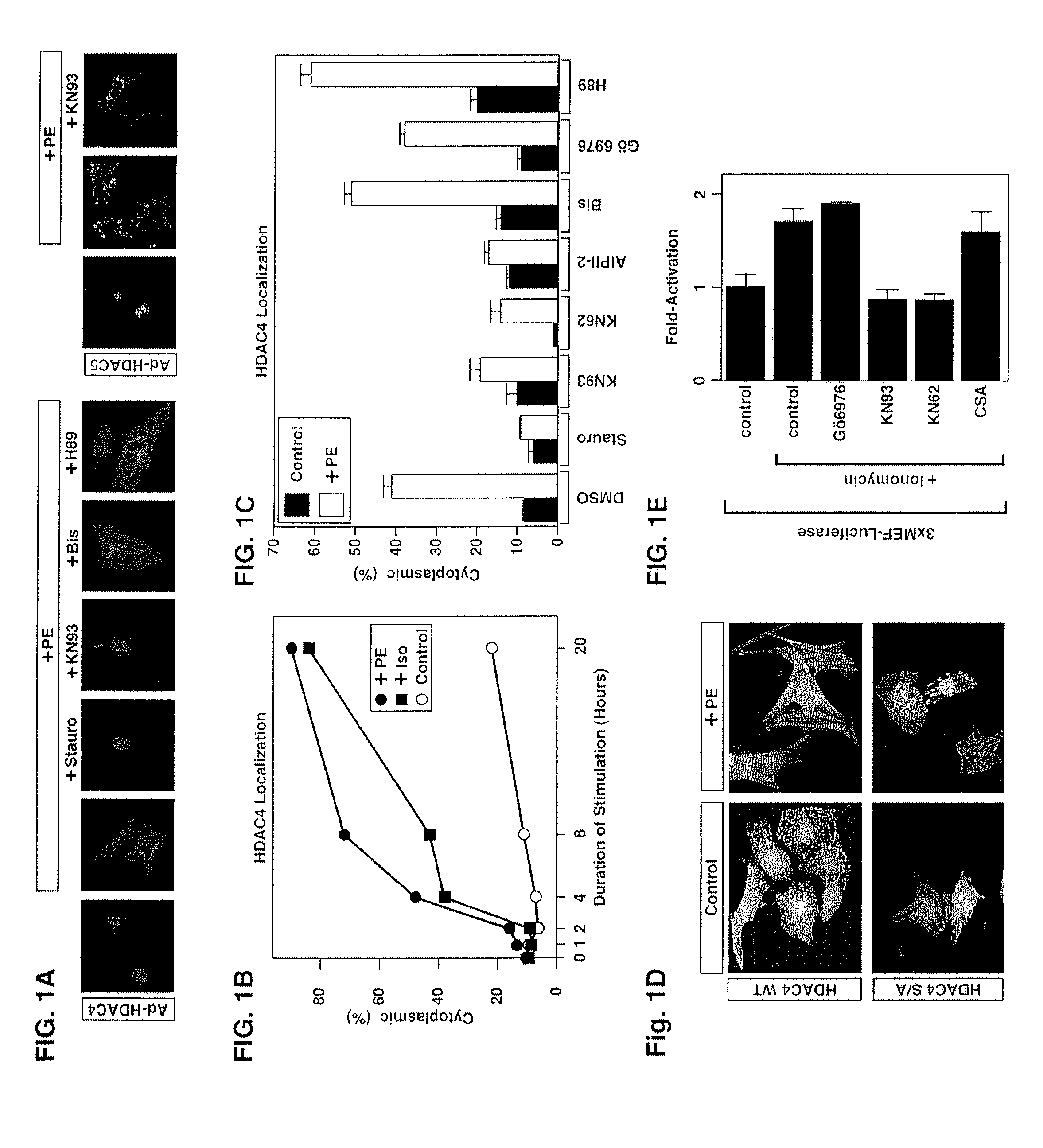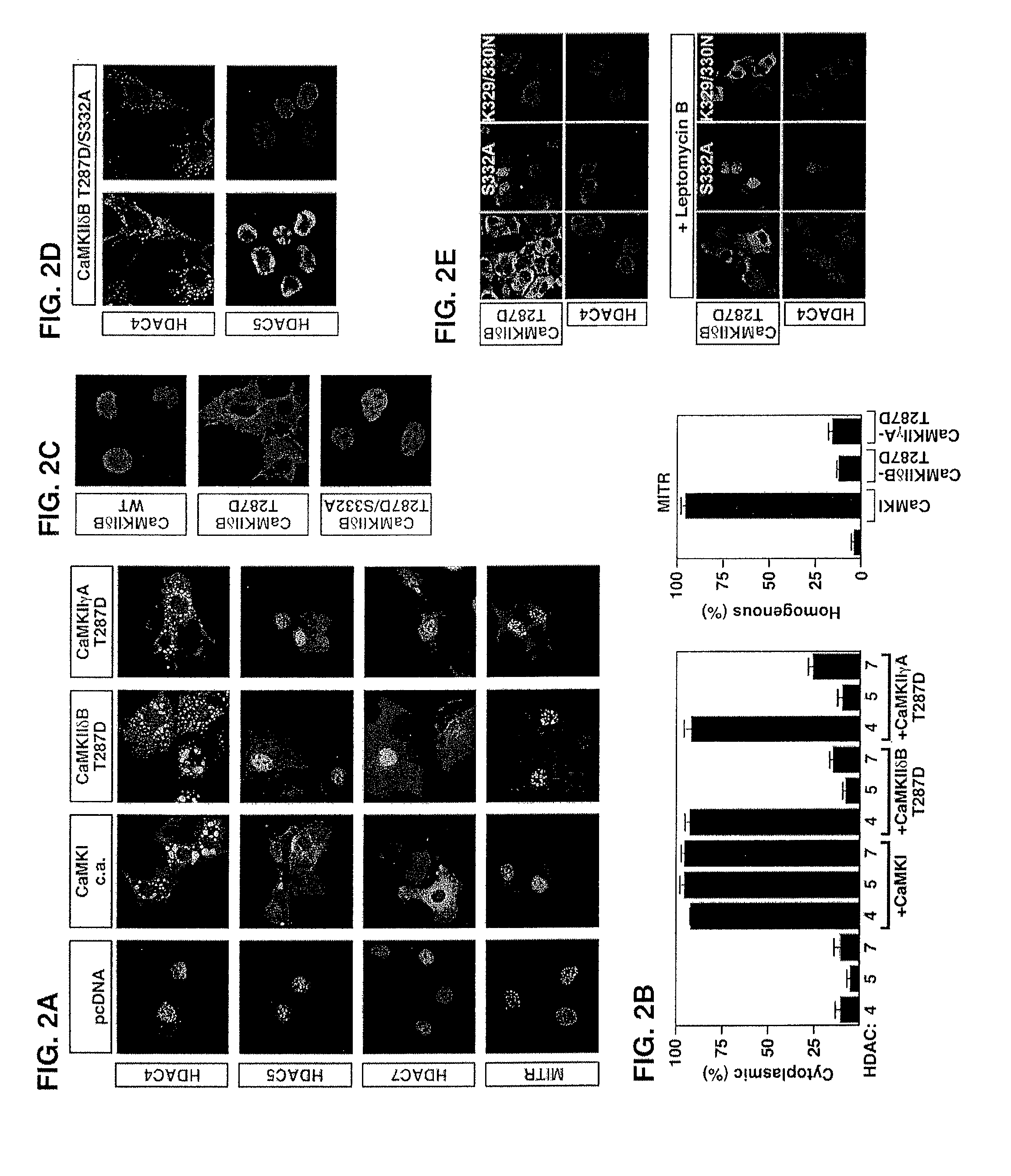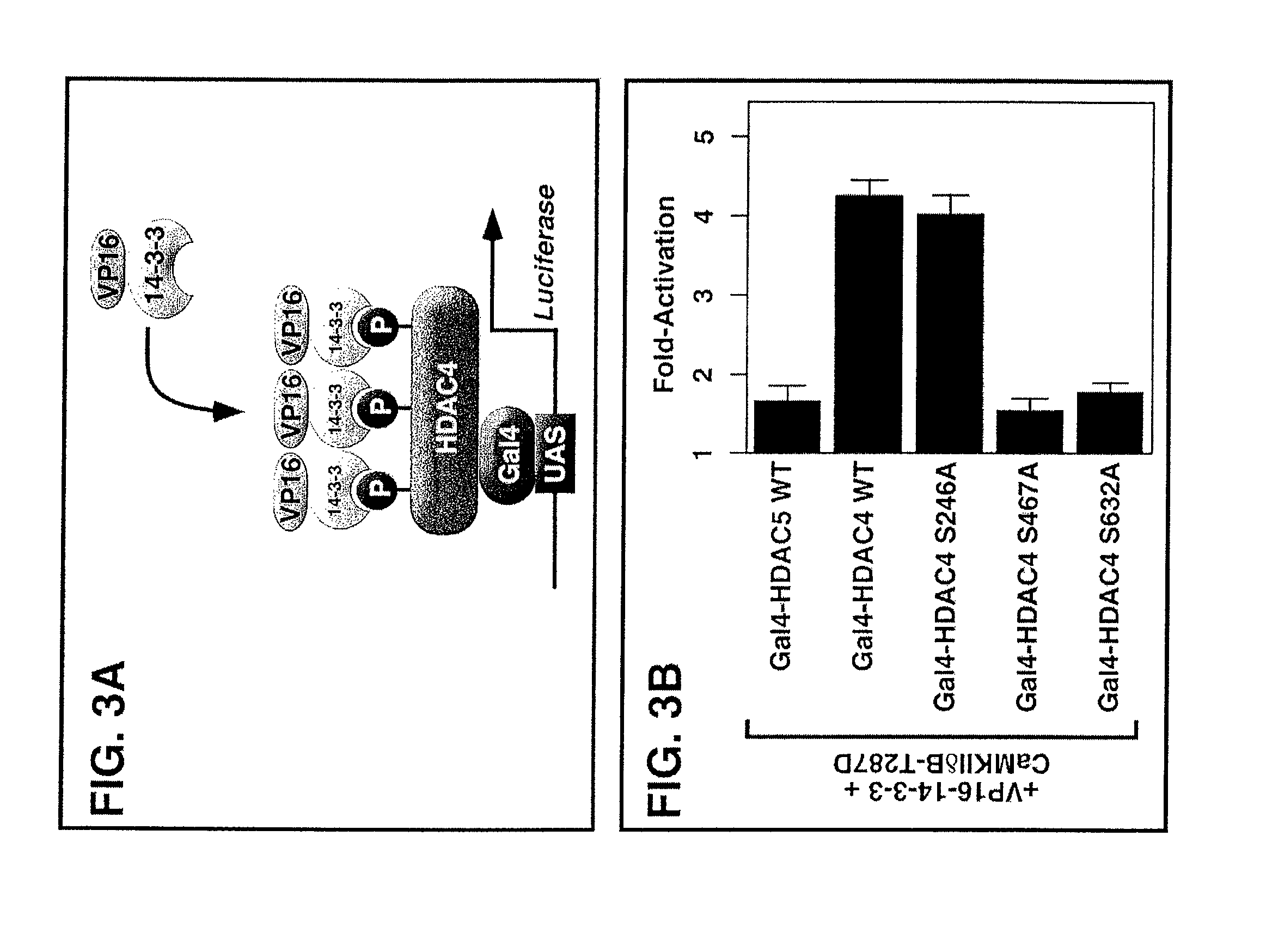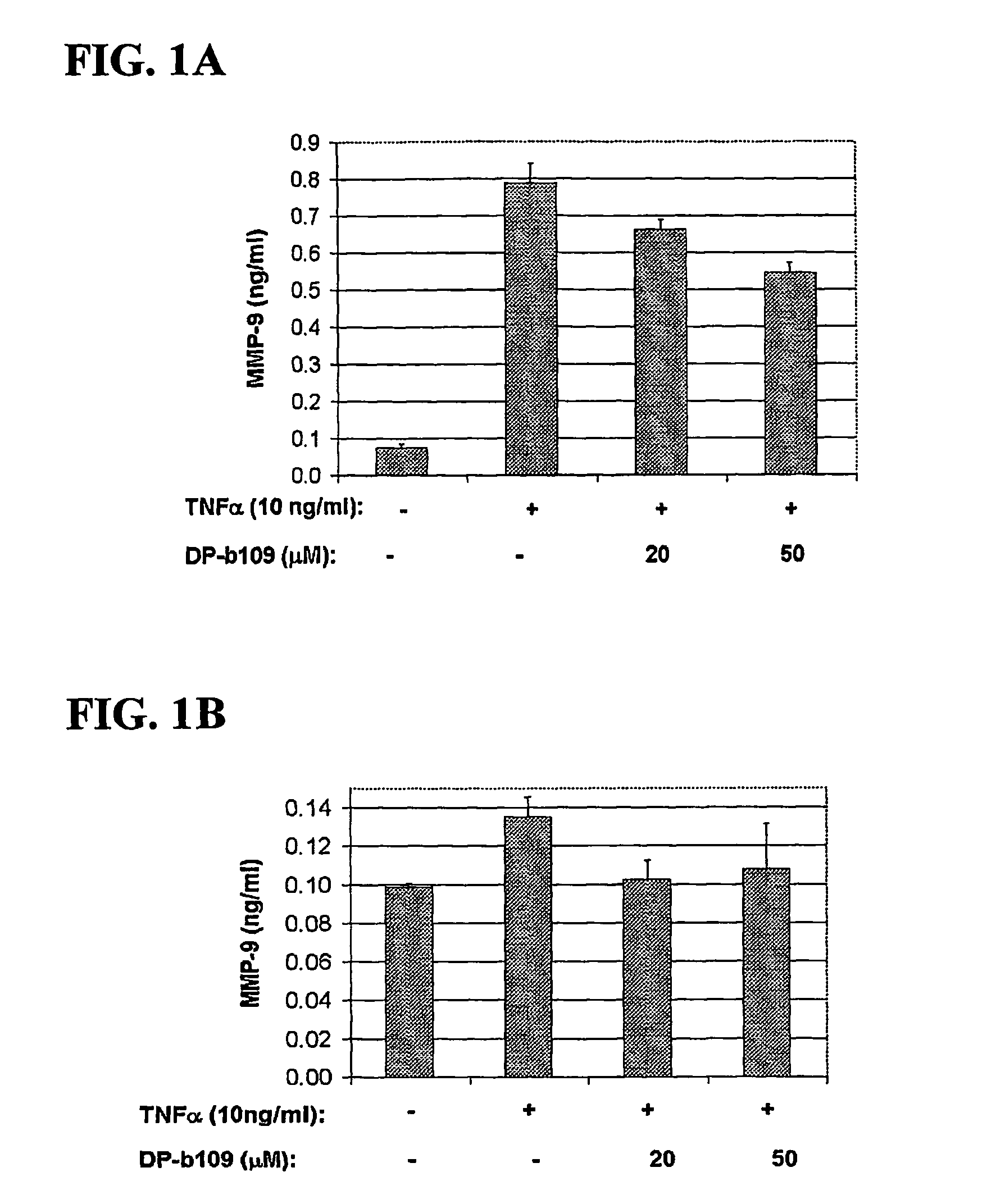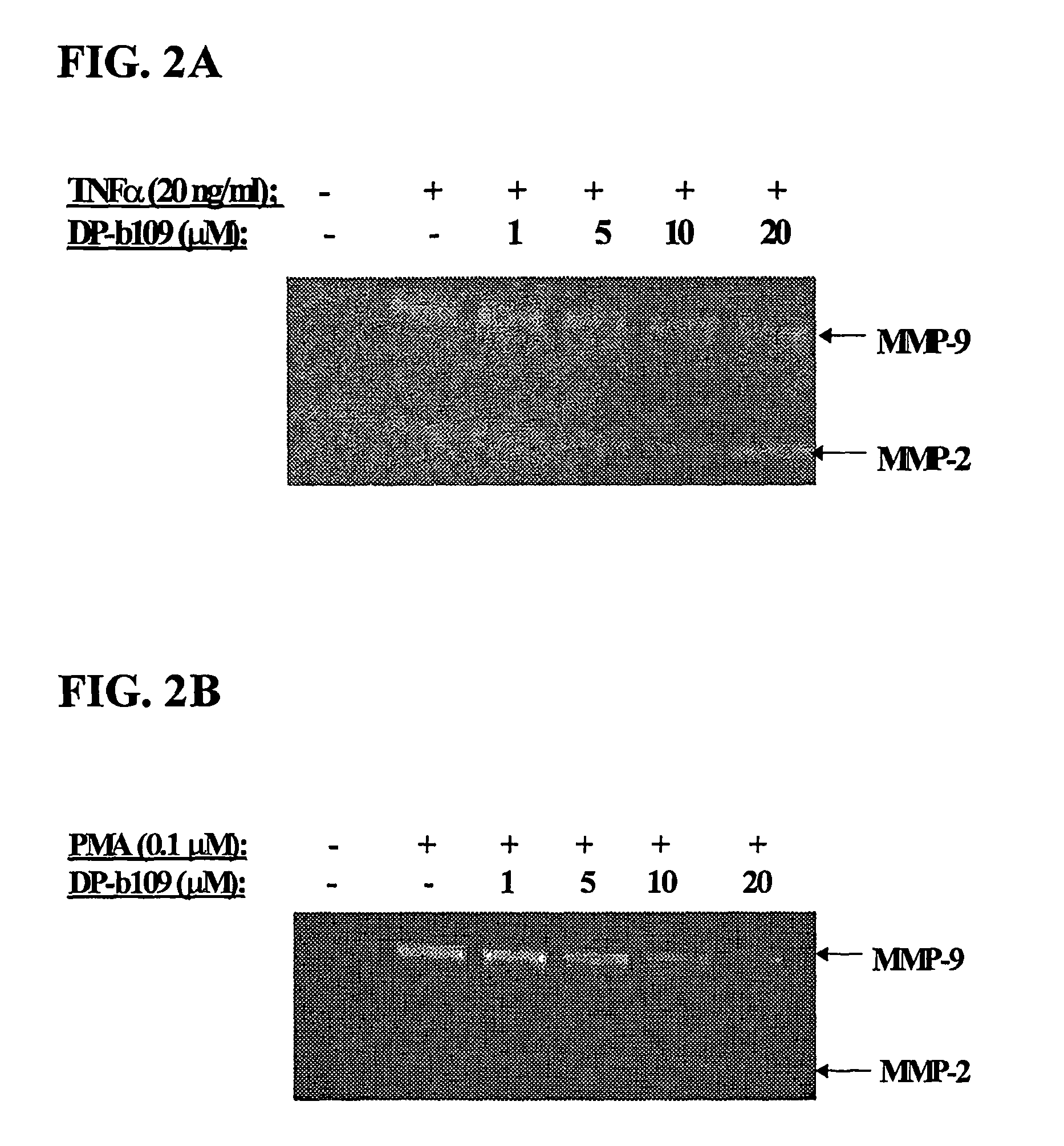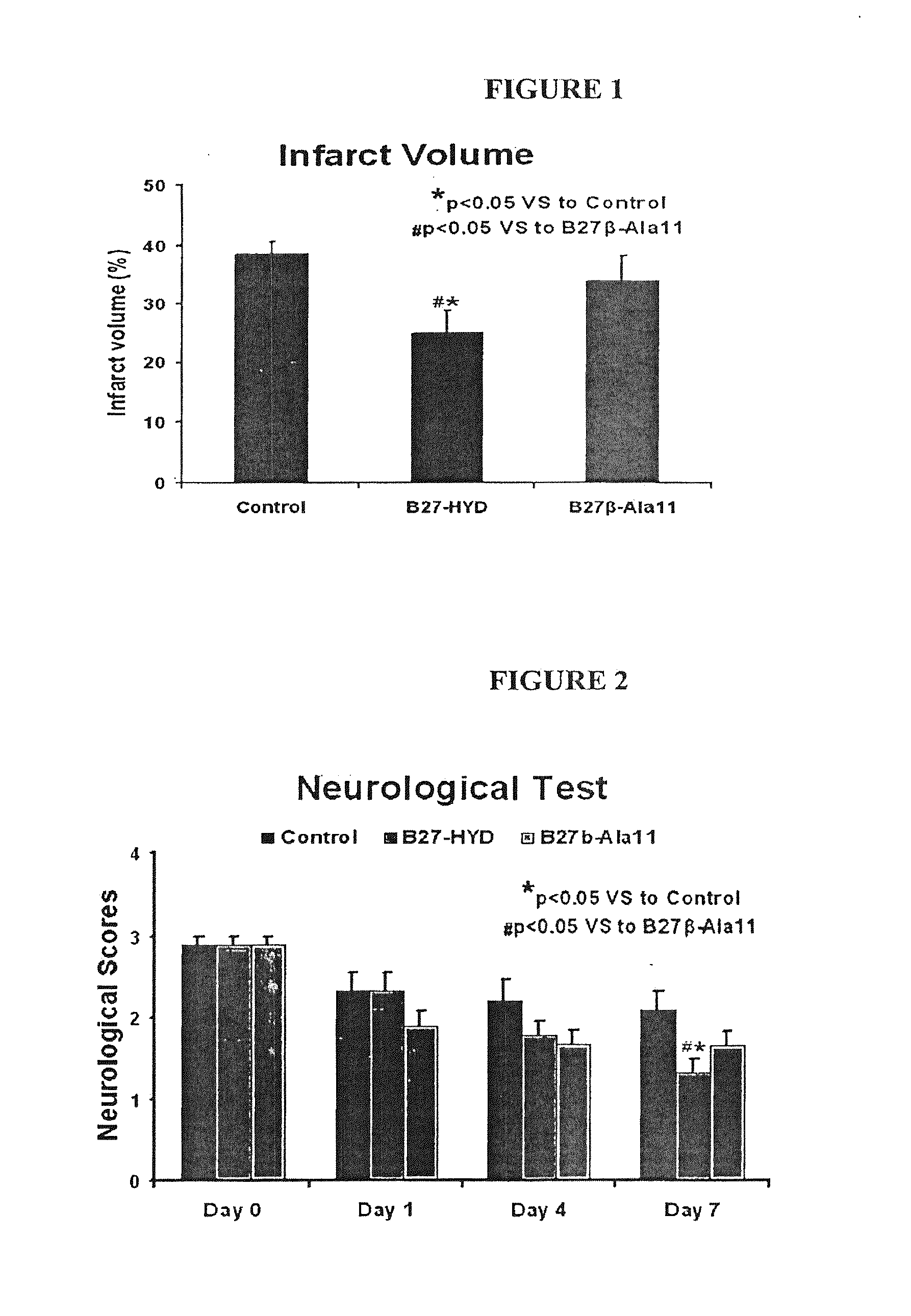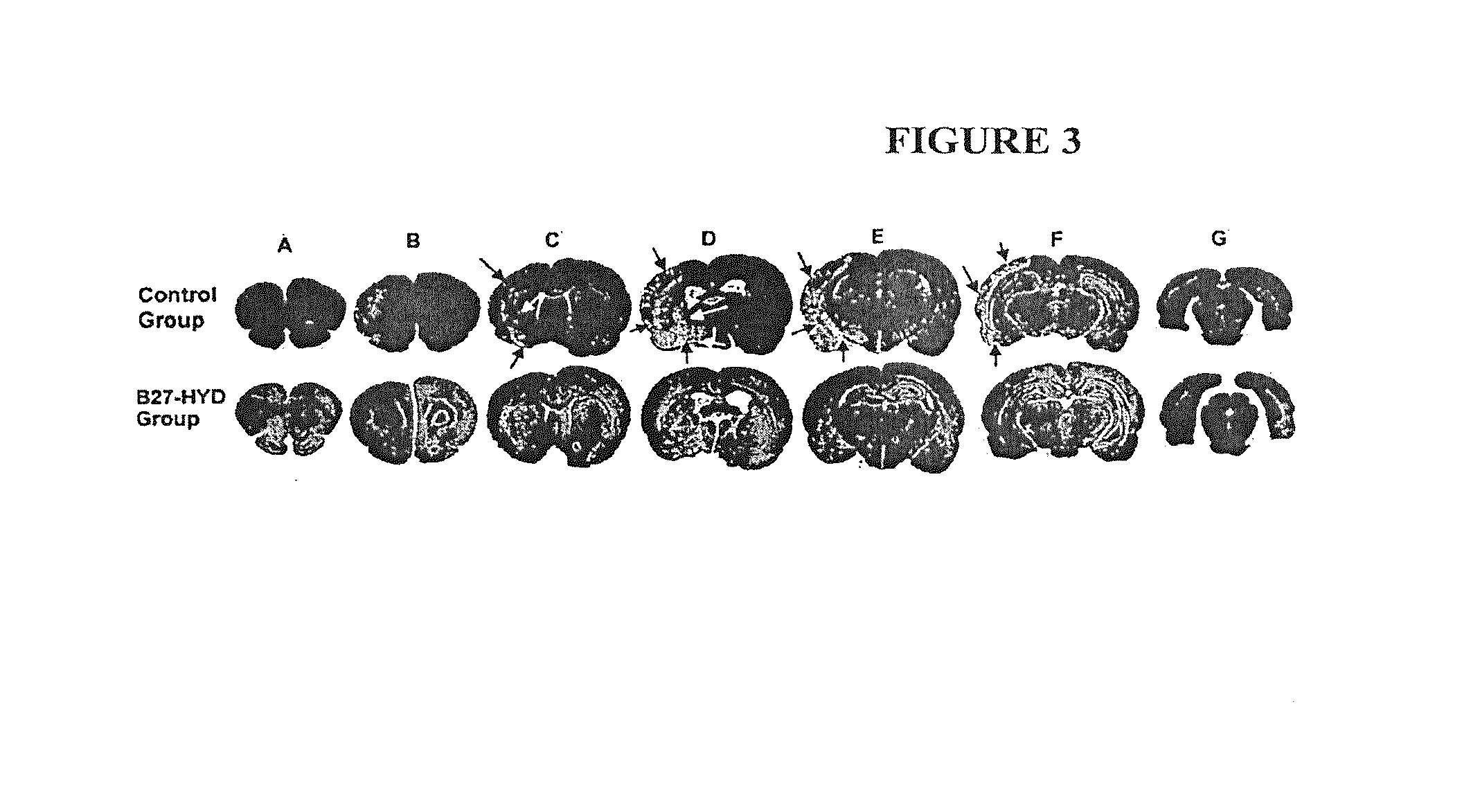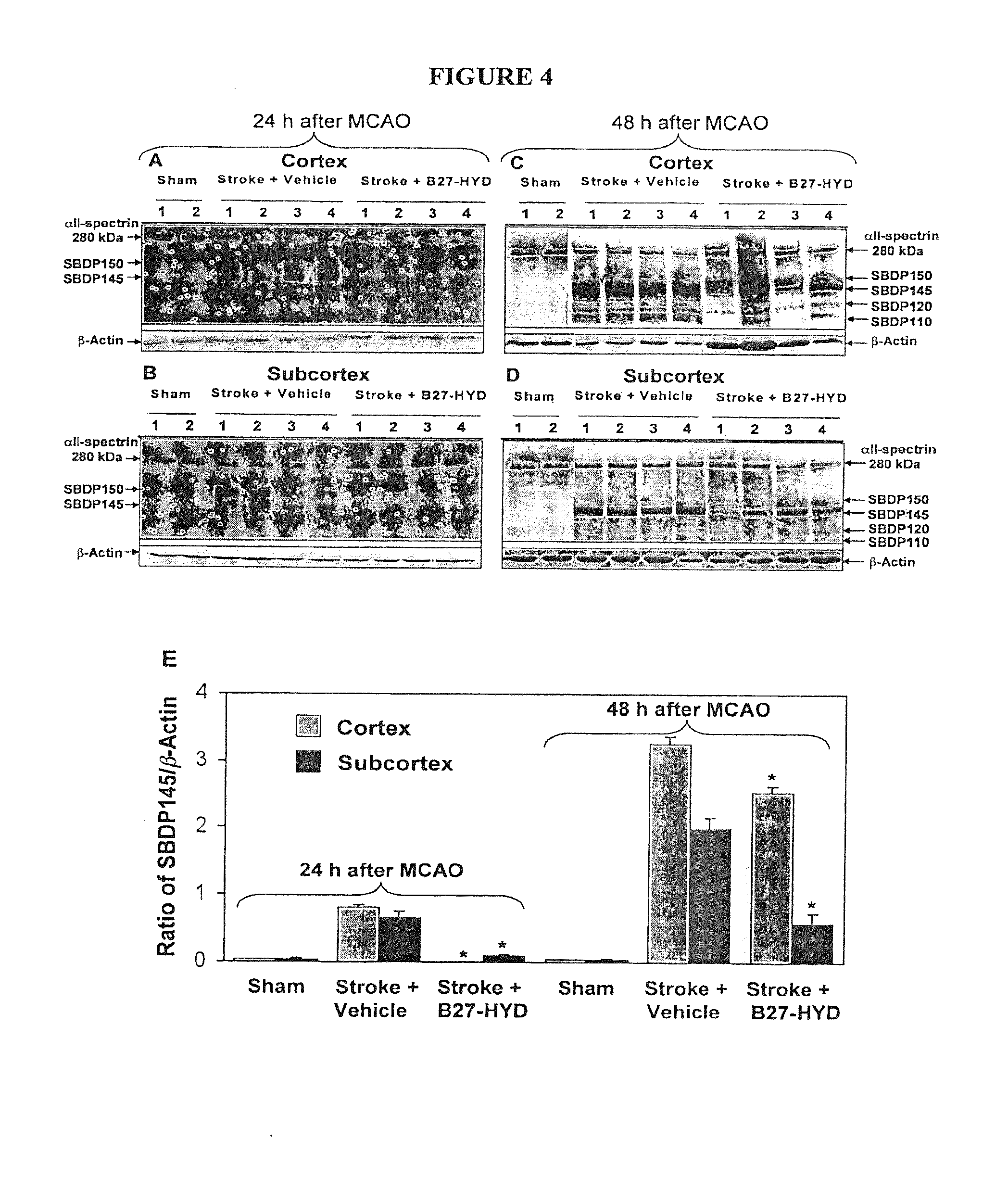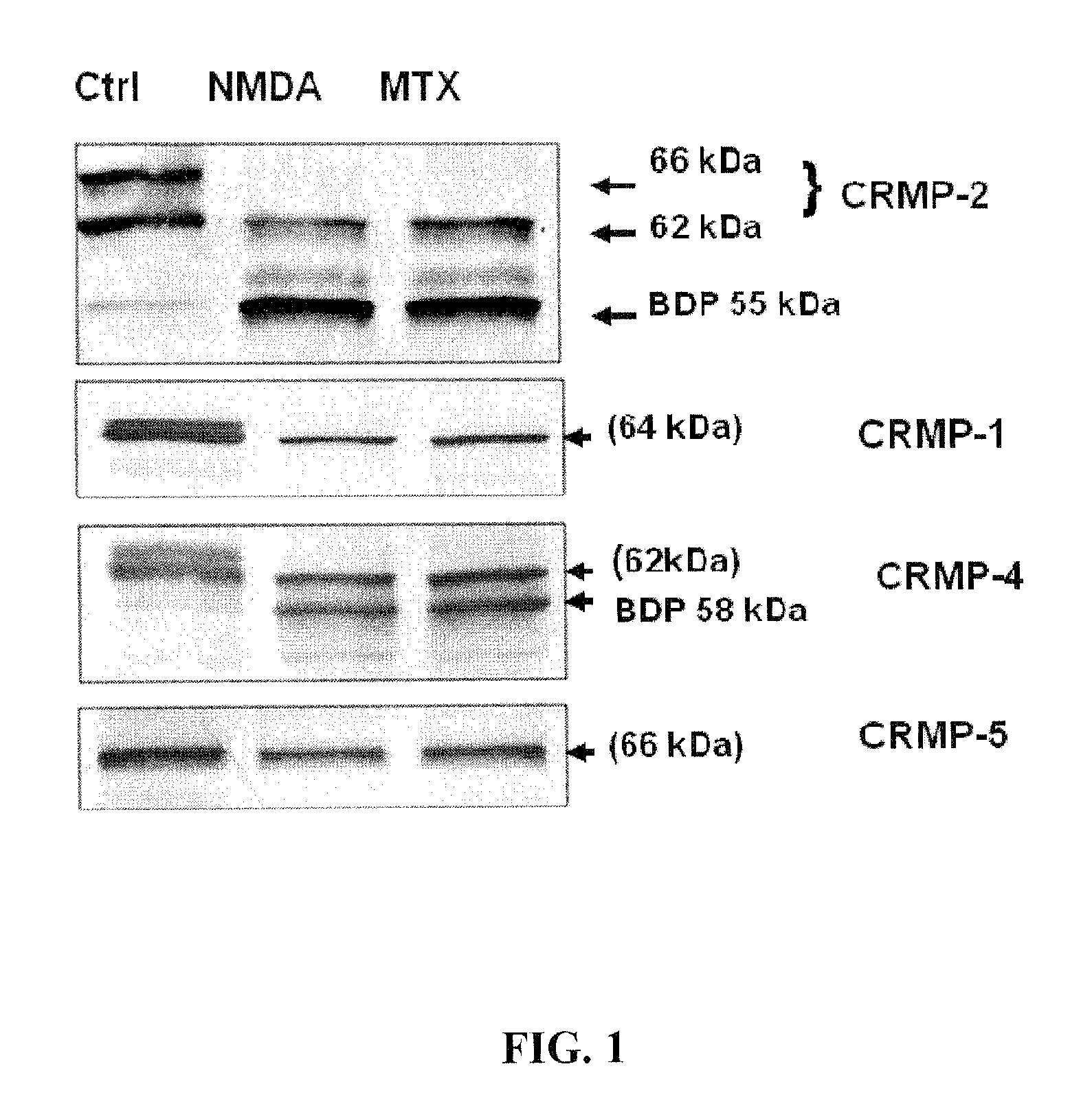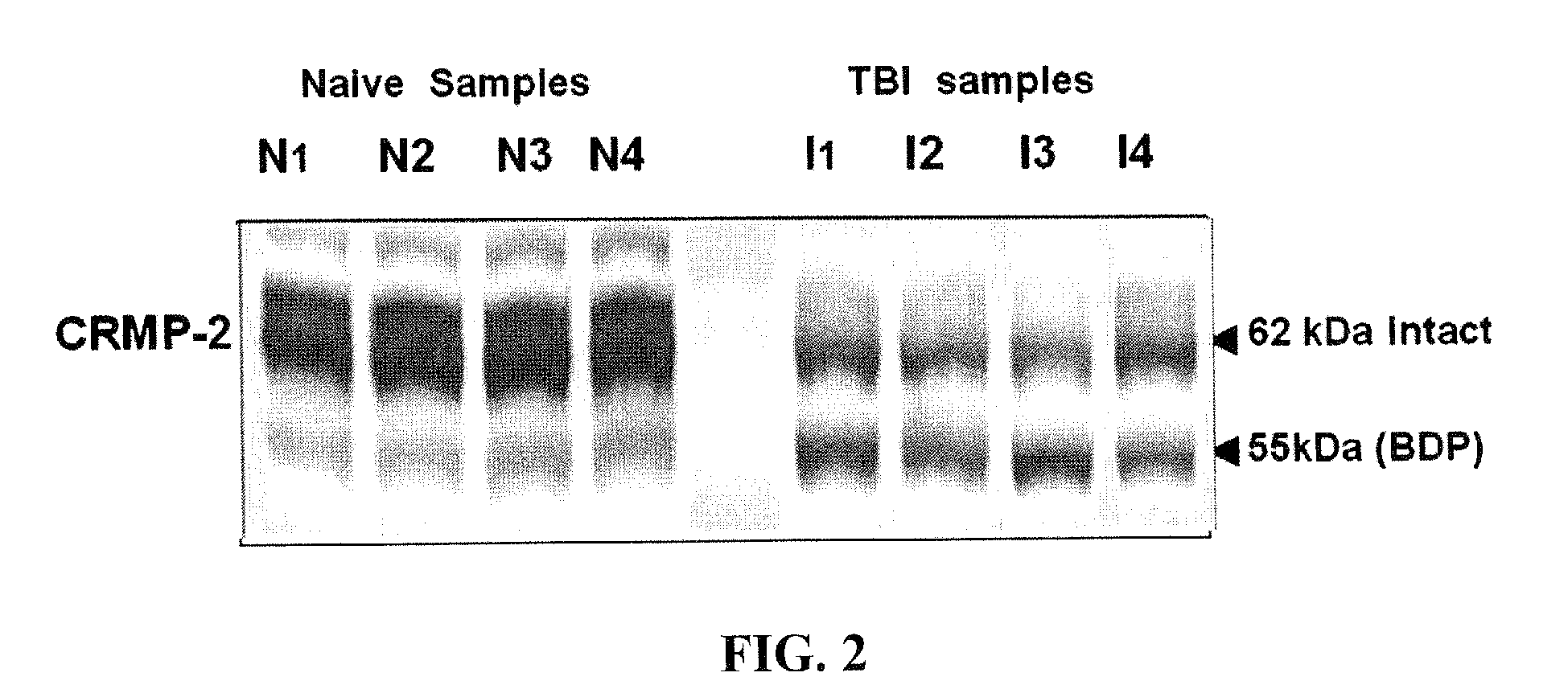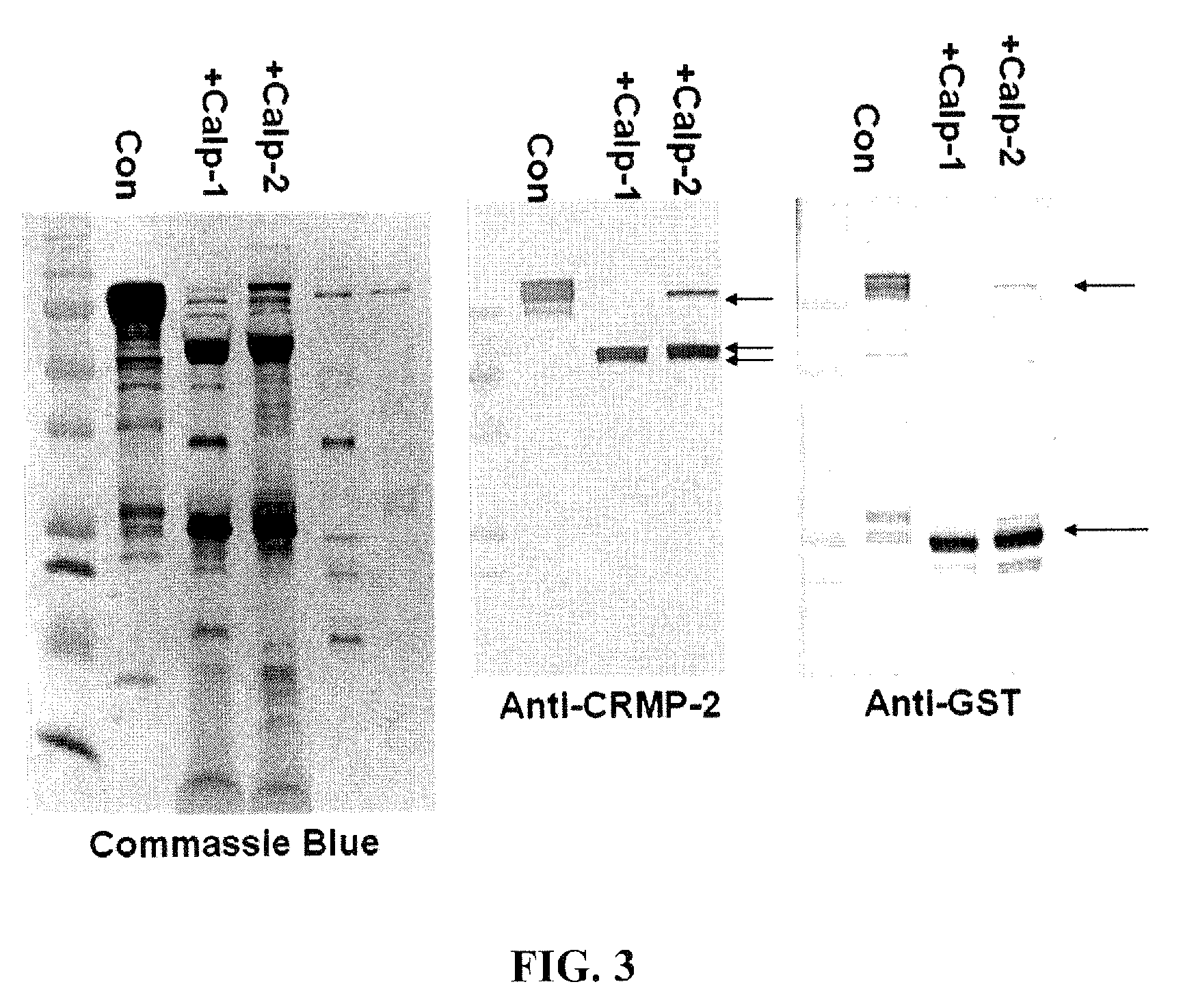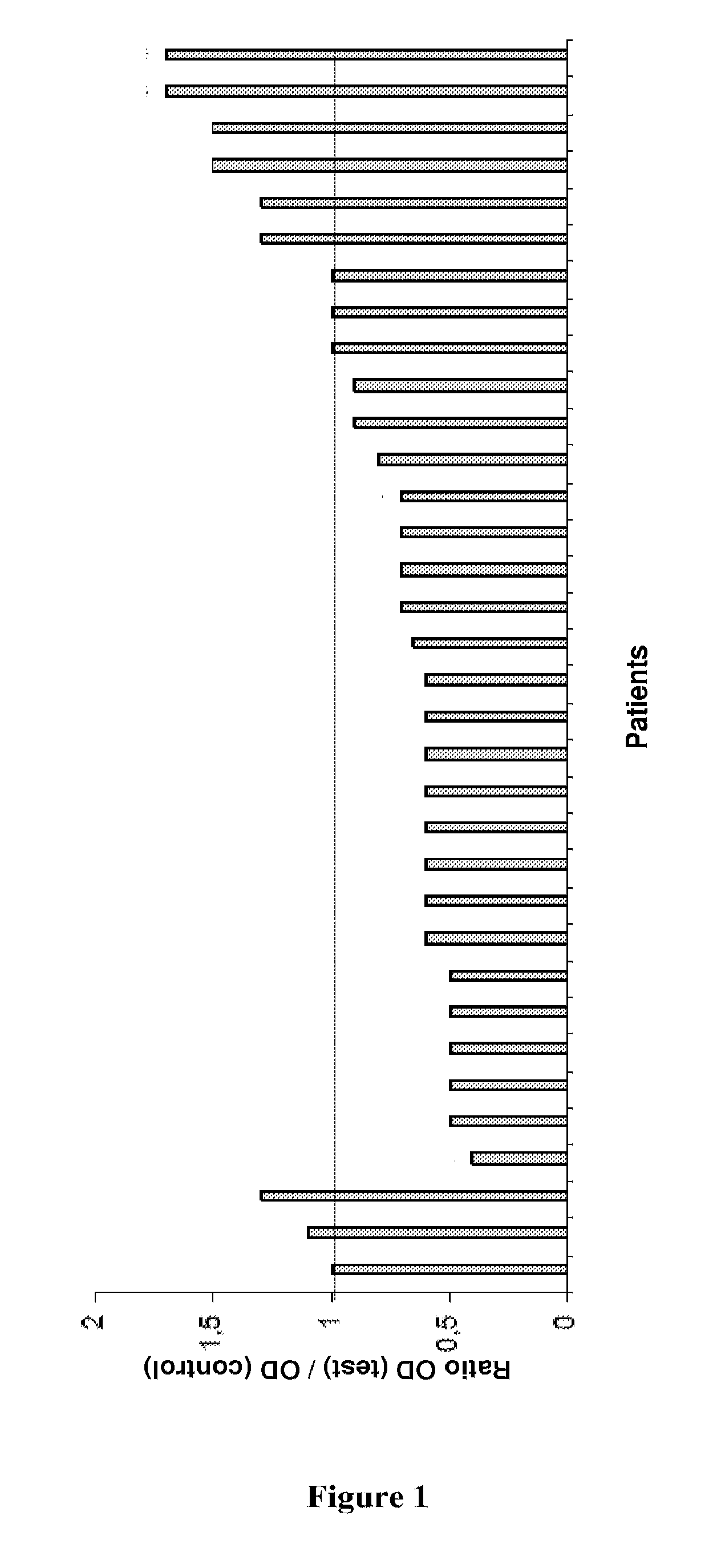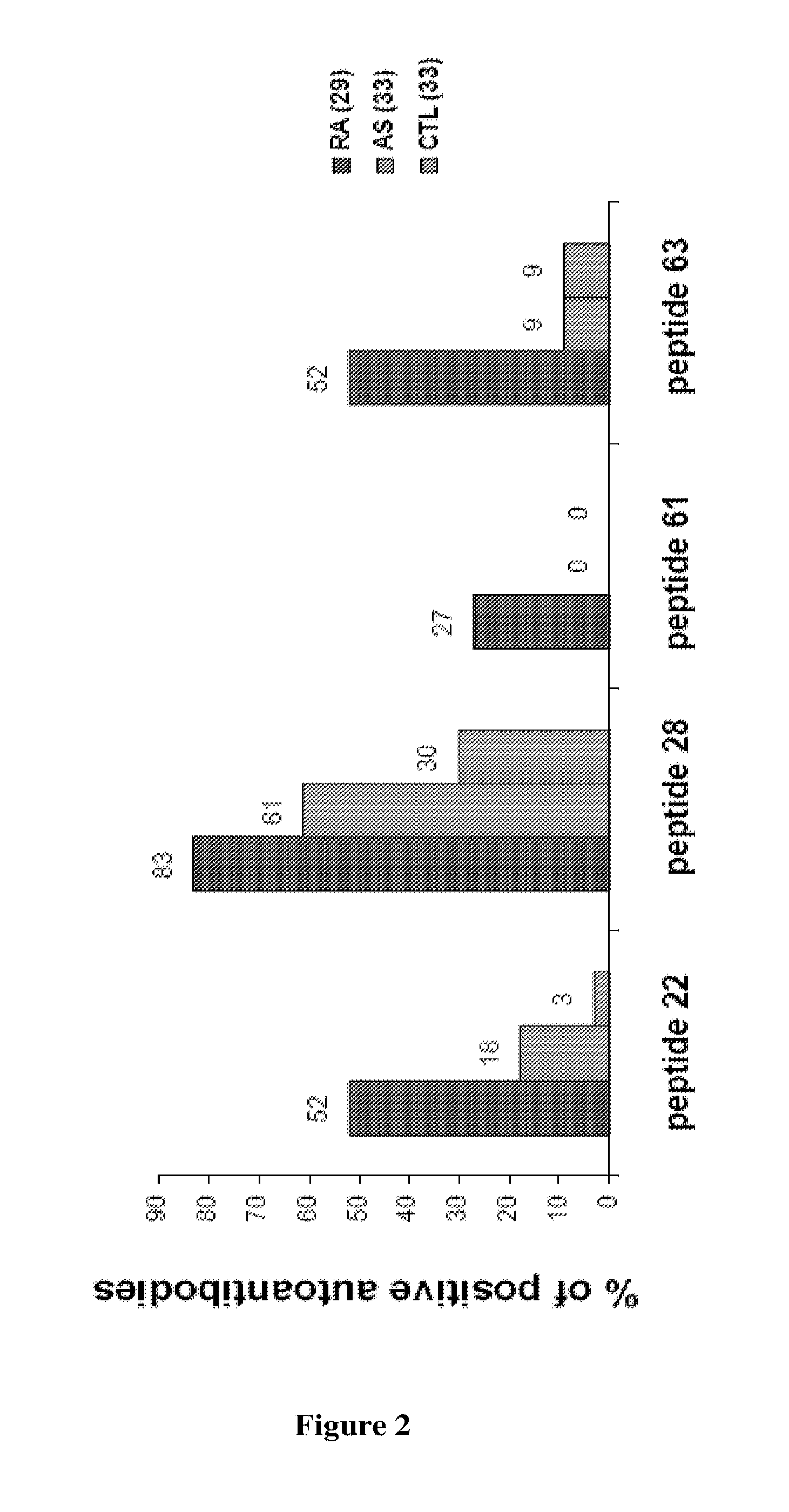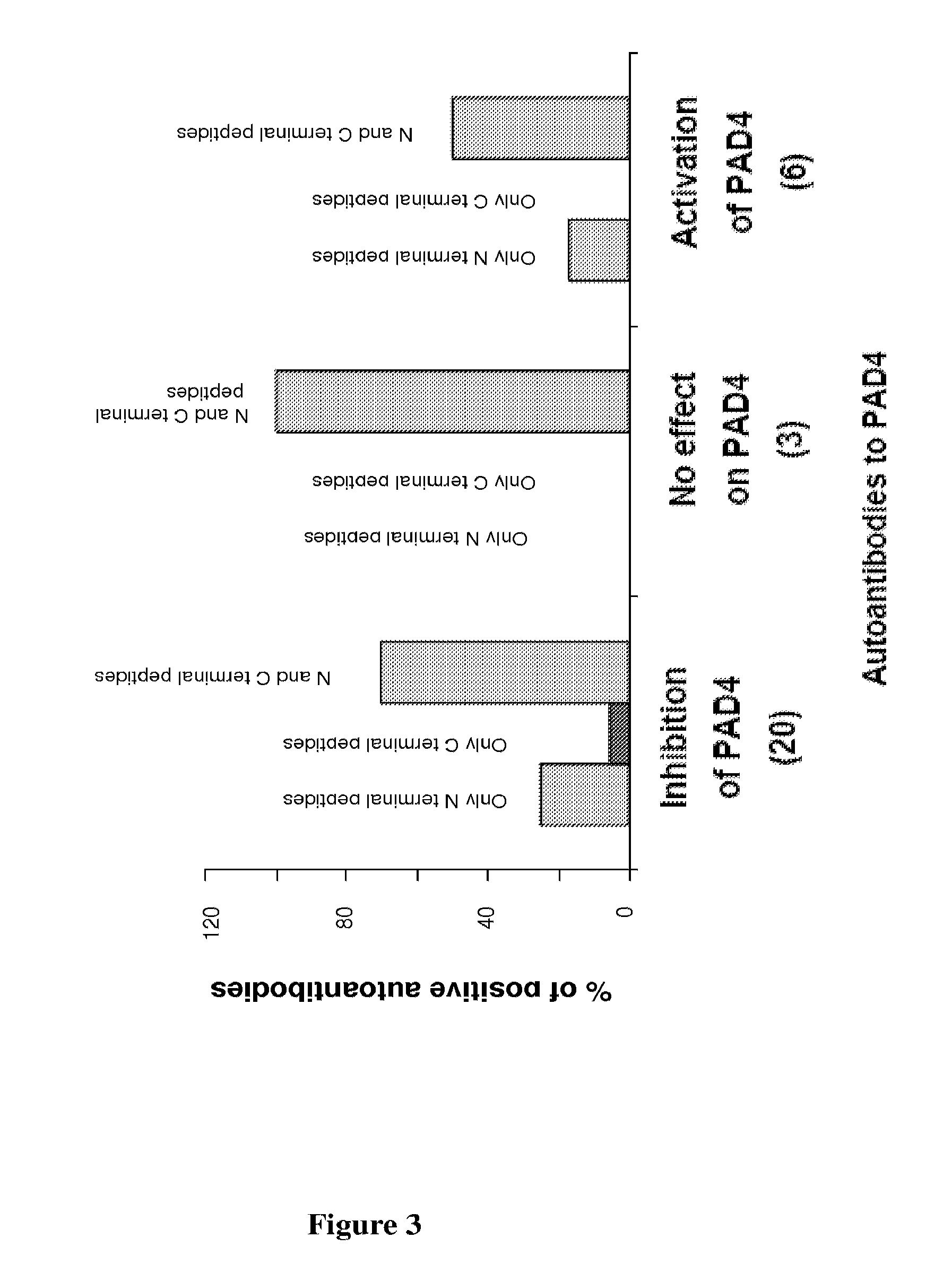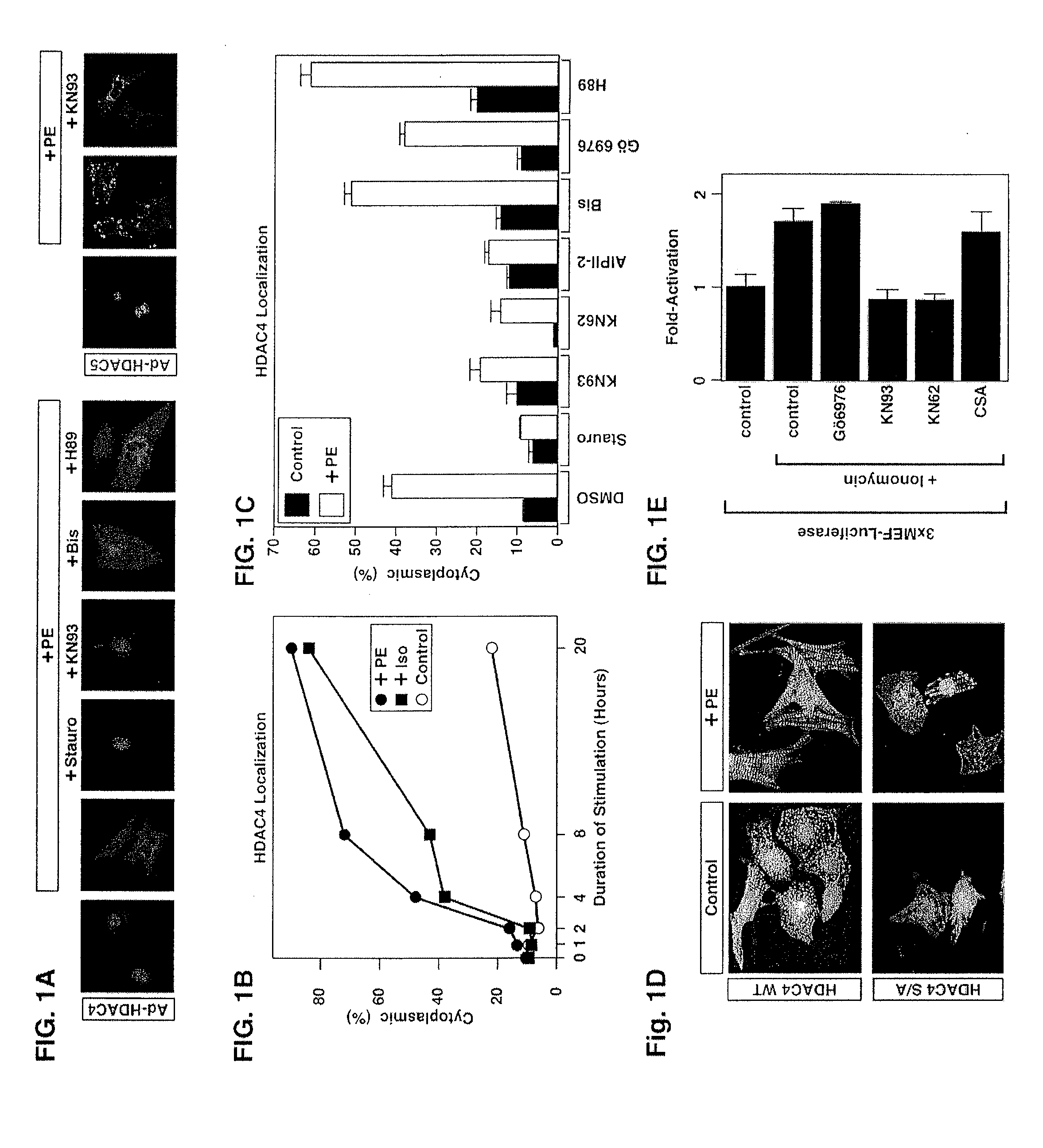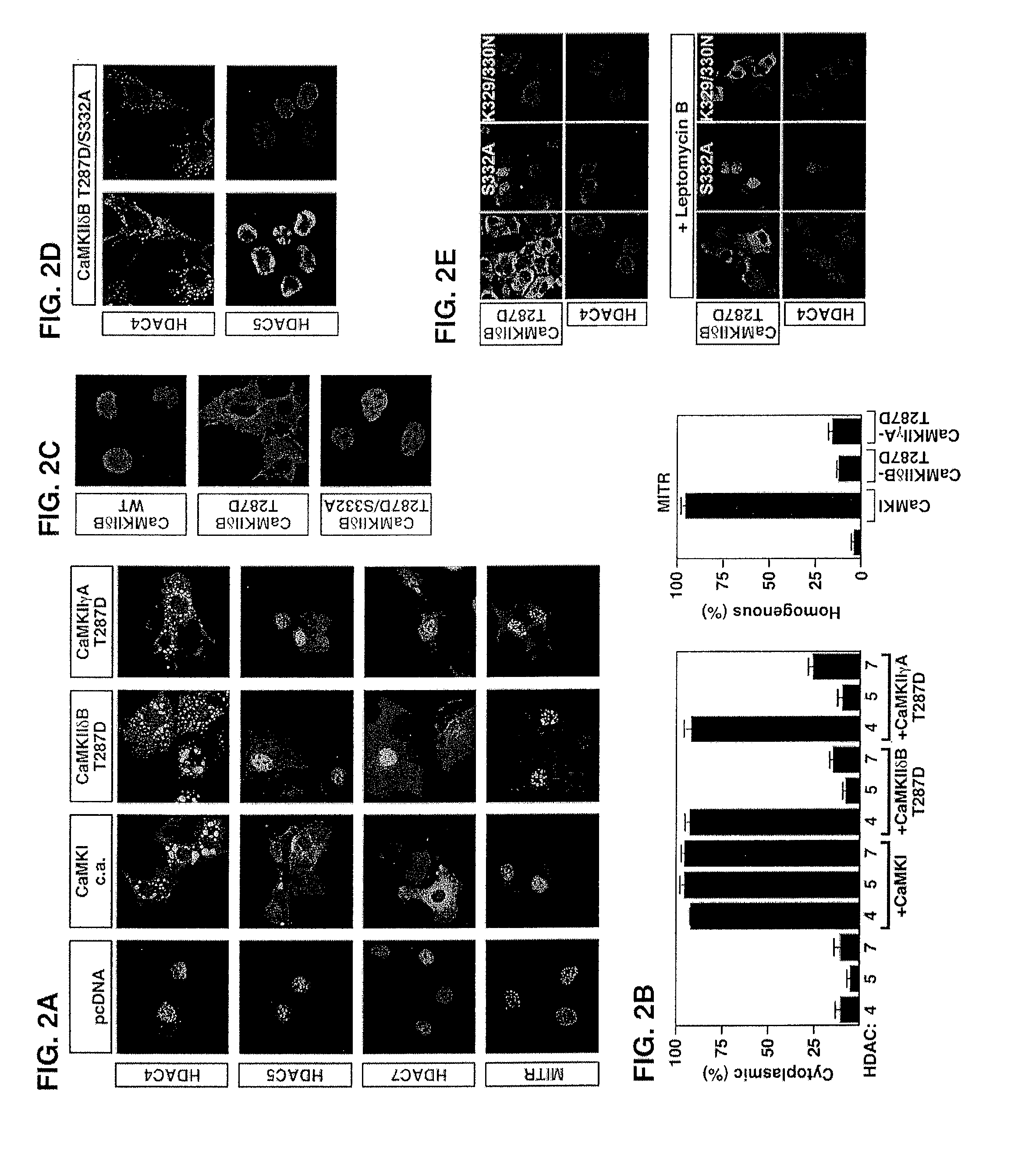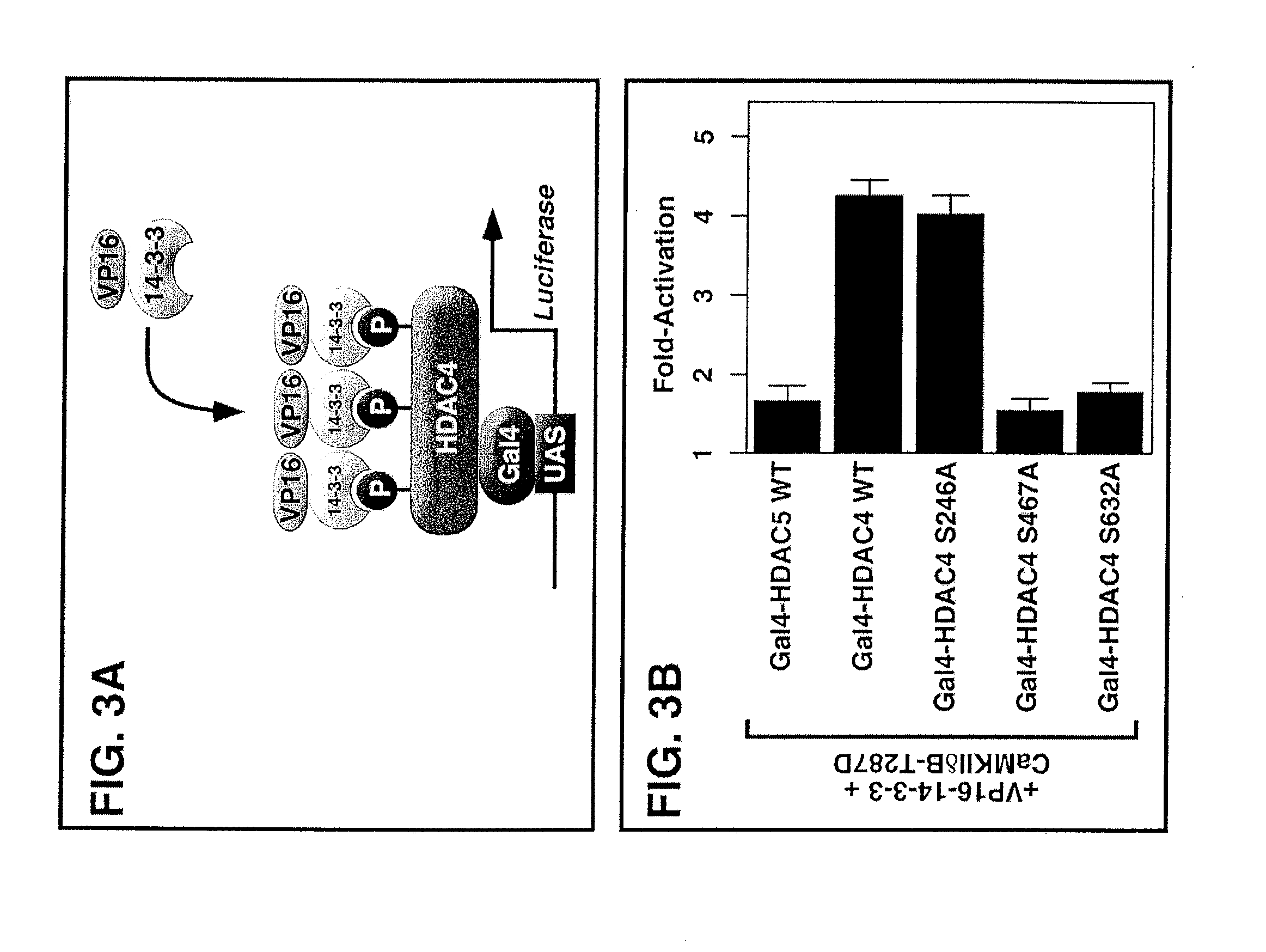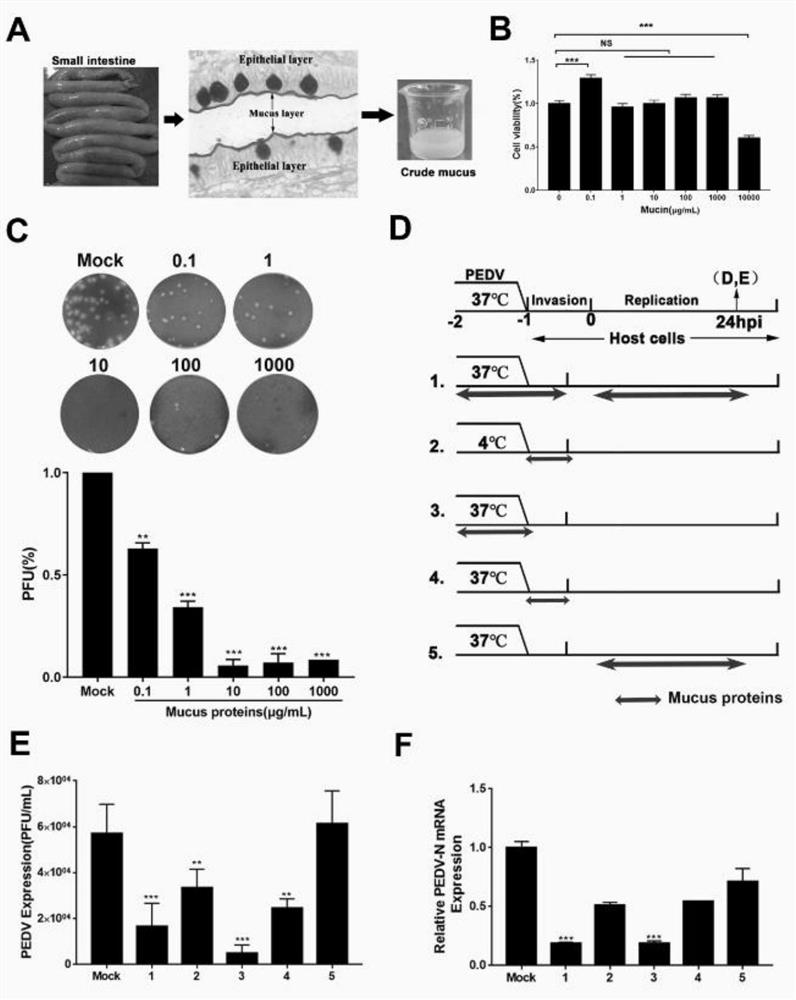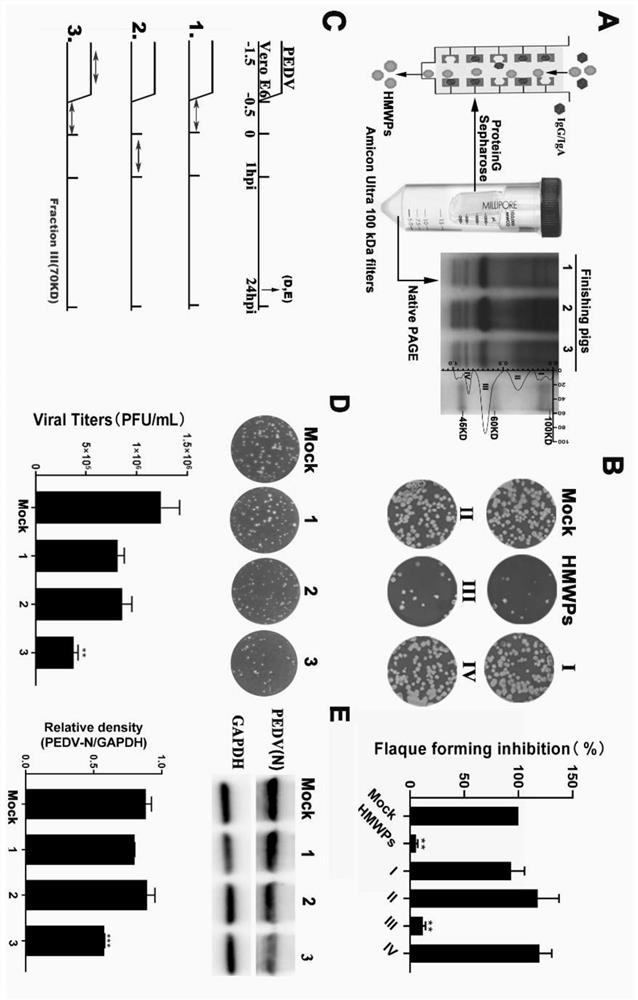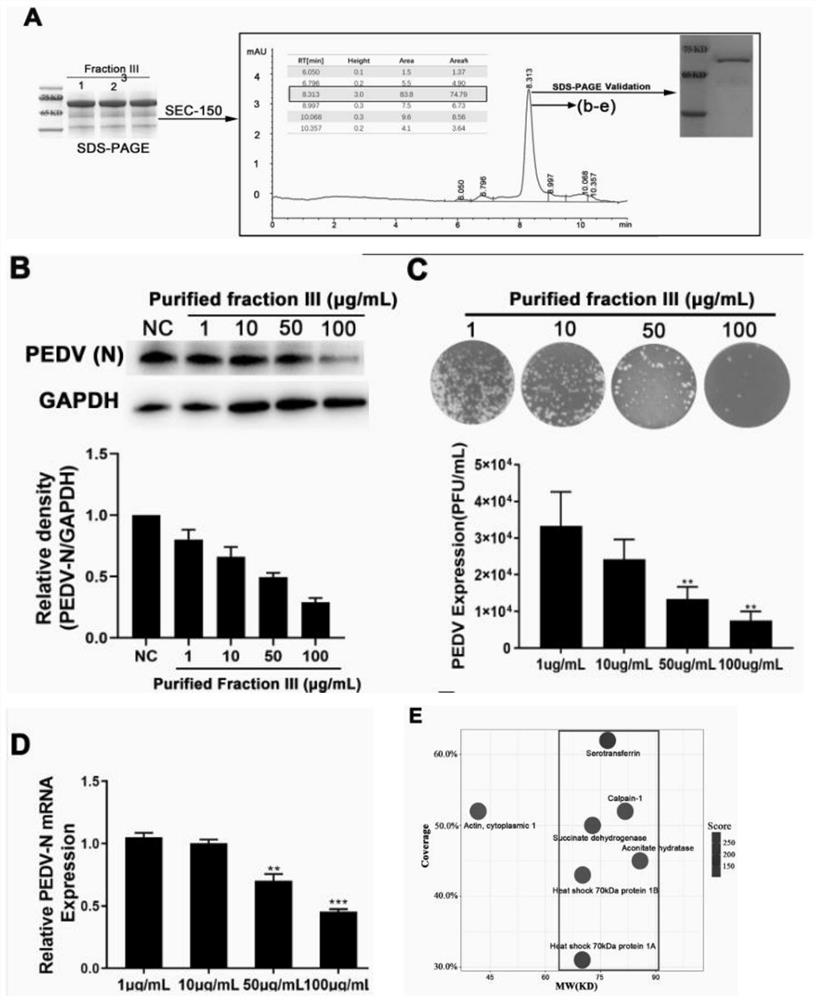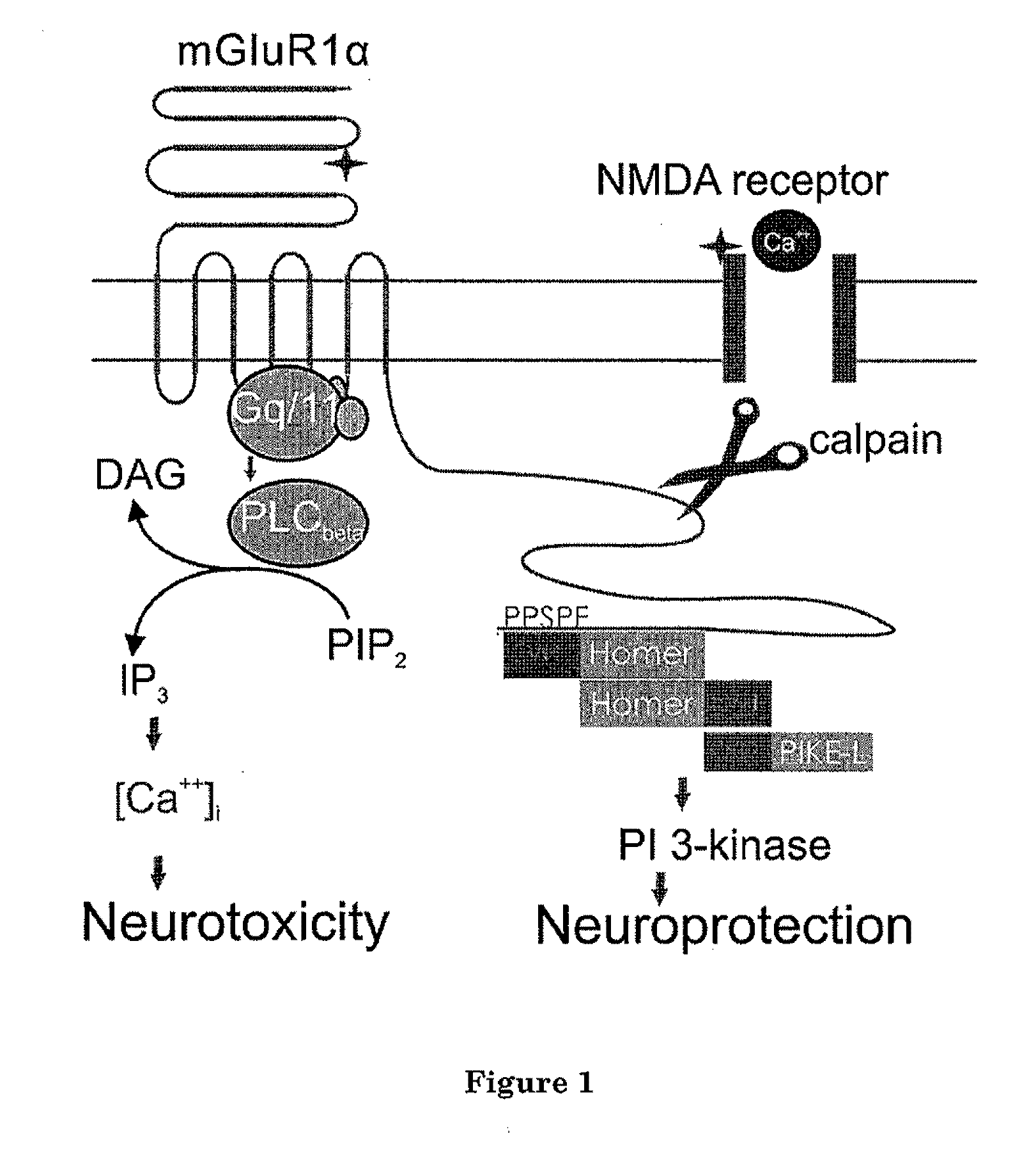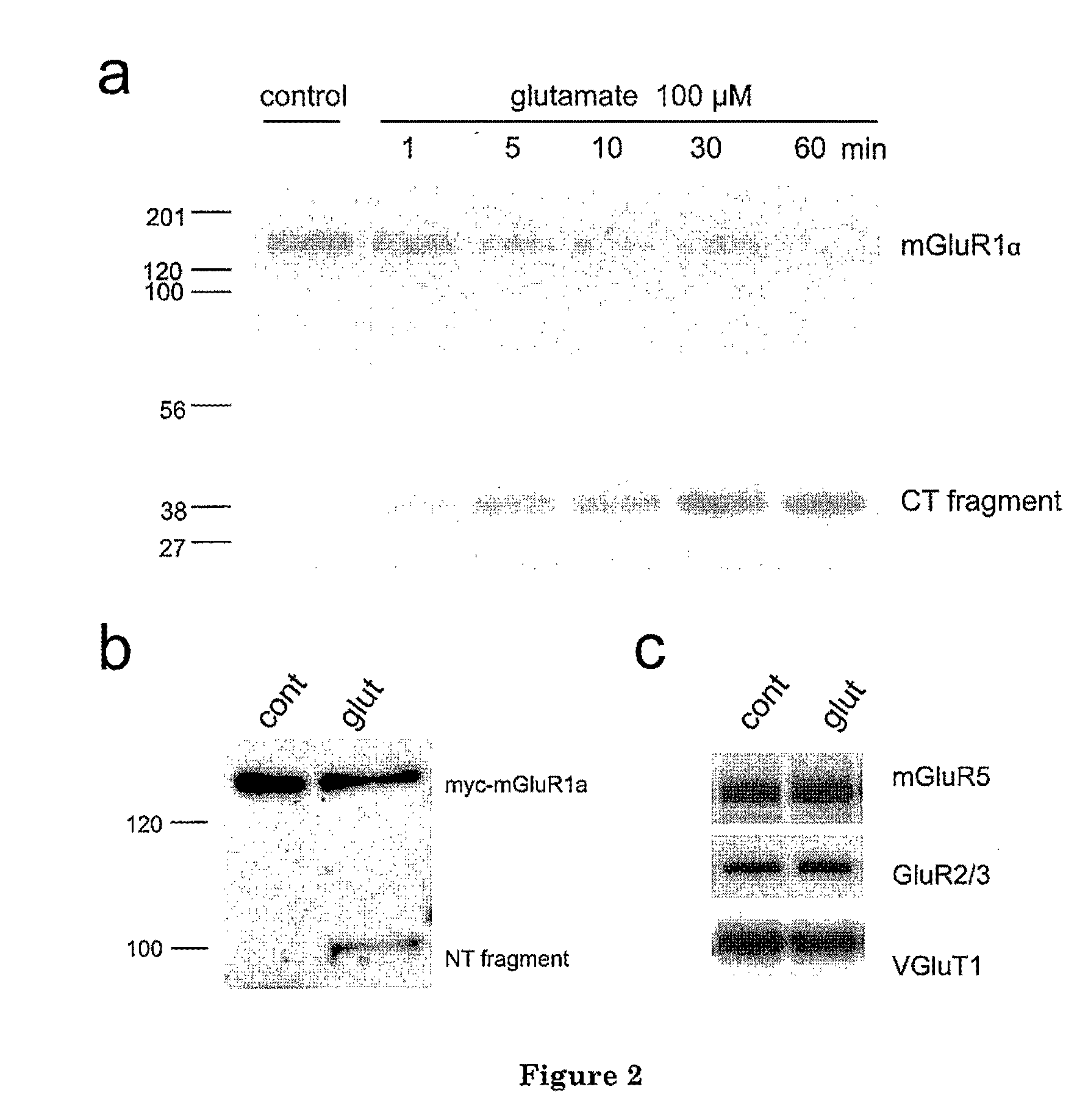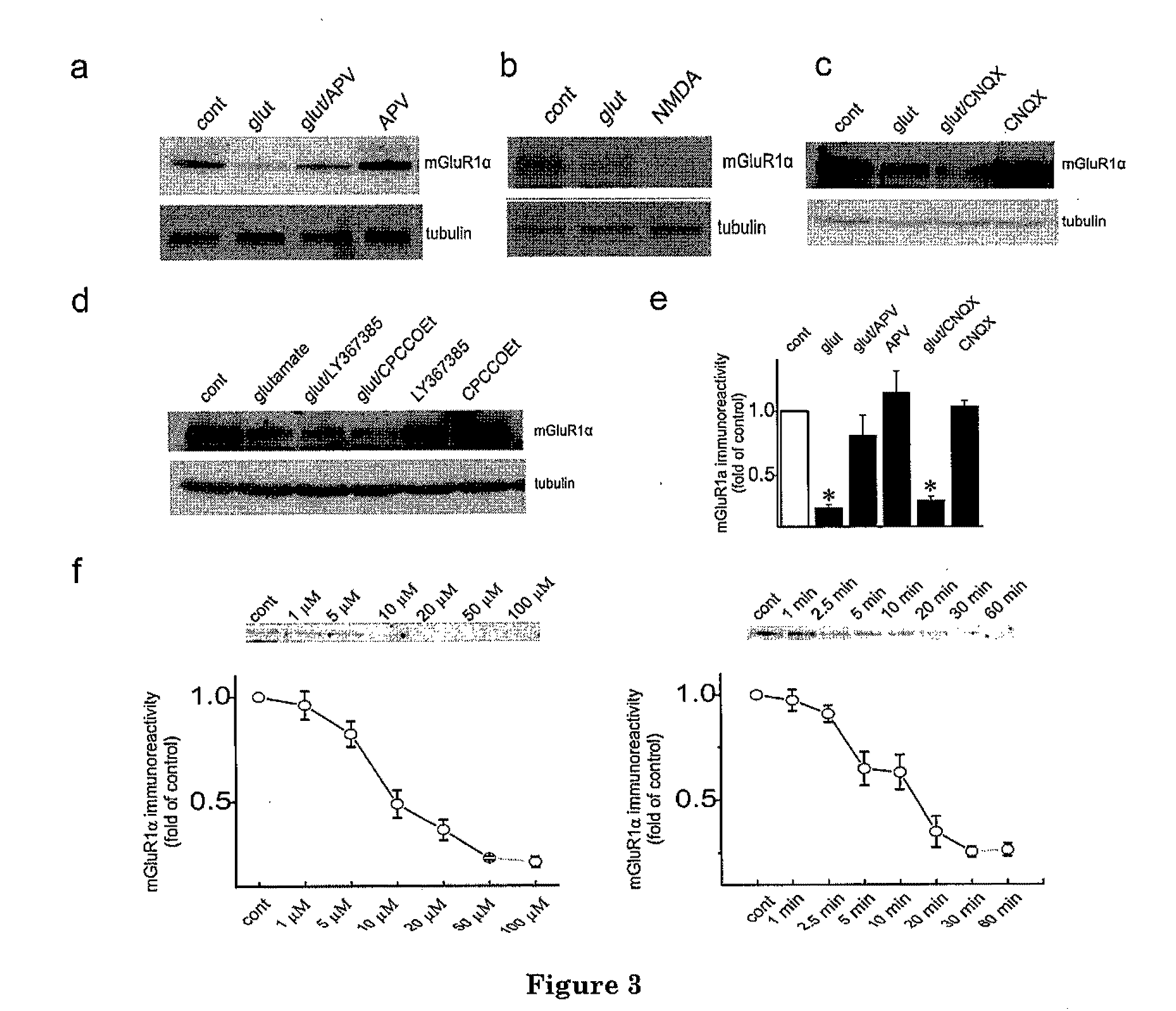Patents
Literature
62 results about "Calpain" patented technology
Efficacy Topic
Property
Owner
Technical Advancement
Application Domain
Technology Topic
Technology Field Word
Patent Country/Region
Patent Type
Patent Status
Application Year
Inventor
A calpain (/ˈkælpeɪn/; EC 3.4.22.52, EC 3.4.22.53) is a protein belonging to the family of calcium-dependent, non-lysosomal cysteine proteases (proteolytic enzymes) expressed ubiquitously in mammals and many other organisms. Calpains constitute the C2 family of protease clan CA in the MEROPS database. The calpain proteolytic system includes the calpain proteases, the small regulatory subunit CAPNS1, also known as CAPN4, and the endogenous calpain-specific inhibitor, calpastatin.
Fluorogenic or fluorescent reporter molecules and their applications for whole-cell fluorescence screening assays for caspases and other enzymes and the use thereof
The present invention relates to novel fluorescent dyes, novel fluorogenic and fluorescent reporter molecules and new enzyme assay processes that can be used to detect the activity of caspases and other enzymes involved in apoptosis in whole cells, cell lines and tissue samples derived from any living organism or organ. The reporter molecules and assay processes can be used in drug screening procedures to identify compounds which act as inhibitors or inducers of the caspase cascade in whole cells or tissues. The reagents and assays described herein are also useful for determining the chemosensitivity of human cancer cells to treatment with chemotherapeutic drugs. The present invention also relates to novel fluorogenic and fluorescent reporter molecules and new enzyme assay processes that can be used to detect the activity of type 2 methionine aminopeptidase, dipeptidyl peptidase IV, calpain, aminopeptidase, HIV protease, adenovirus protease, HSV-1 protease, HCMV protease and HCV protease.
Owner:CYTOVIA INC
Fluorogenic or fluorescent reporter molecules and their applications for whole-cell fluorescence screening assays for capsases and other enzymes and the use thereof
InactiveUS6342611B1Organic chemistryMicrobiological testing/measurementScreening proceduresApoptosis
The present invention relates to novel fluorescent dyes, novel fluorogenic and fluorescent reporter molecules and new enzyme assay processes that can be used to detect the activity of caspases and other enzymes involved in apoptosis in whole cells, cell lines and tissue samples derived from any living organism or organ. The reporter molecules and assay processes can be used in drug screening procedures to identify compounds which act as inhibitors or inducers of the caspase cascade in whole cells or tissues. The reagents and assays described herein are also useful for determining the chemosensitivity of human cancer cells to treatment with chemotherapeutic drugs. The present invention also relates to novel fluorogenic and fluorescent reporter molecules and new enzyme assay processes that can be used to detect the activity of type 2 methionine aminopeptidase, dipeptidyl peptidase IV, calpain, aminopeptidase, HIV protease, adenovirus protease, HSV-1 protease, HCMV protease and HCV protease.
Owner:CYTOVIA INC
Single nucleotide polymorphism markers in the bovine CAPN1 gene to identify meat tenderness
InactiveUS7238479B2Sugar derivativesMicrobiological testing/measurementInteinCalcium-Activated Neutral Protease
Single nucleotide polymorphisms (SNPs) in the gene encoding micromolar calcium activated neutral protease (mu-calpain) effect meat tenderness in bovine. These SNPs correspond to position 18 of exon 9 of Seq. ID No. 3, position 17 of exon 14 of Seq. ID No. 4, and position 185 on intron 19 of Seq. ID No. 4, of the CAPN1 gene encoding mu-calpain. Alleles wherein the SNP at position 18 of exon 9 encodes alanine at amino acid 316 of bovine mu-calpain, the SNP at position 17 on exon 14 encodes valine at amino acid 530 of bovine mu-calpain, and the SNP at position 185 on intron 19 is an cytosine, are all indicative of increased meat tenderness. Any one or all of these SNPs may be used as markers for selecting bovines having superior meat tenderness, and selecting animals for breeding purposes.
Owner:US SEC AGRI
Cyclic keto-amide compounds as calpain modulators and methods of production and use thereof
ActiveUS10590084B2Ameliorate corresponding medical conditionsPeptide/protein ingredientsSkeletal disorderDiseaseMyofibroblast
The present technology relates to cyclic keto-amide compounds of general formulae I to XXXII, compositions and kits thereof as calpain modulators and methods useful for the treatment of various diseases or disorders such as fibrotic disease or cancer which are associated or mediated, by calpains, such as CAPN1, CAPN2, and / or CAPN9. The present technology is also applicable to cyclic keto-amide compounds which inhibit myofibroblast differentiation.
Owner:BLADE THERAPEUTICS INC
High-quality compound feed with low nitrogen and phosphorus emission for Lateolabrax
ActiveCN102362635AGood for fast feedingGood effectClimate change adaptationAnimal feeding stuffPhytaseAntioxidant
The invention discloses a high-quality compound feed with low nitrogen and phosphorus emission for Lateolabrax, and aims at providing the high-quality compound feed with low nitrogen and phosphorus emission for the Lateolabrax, which has the advantages of balanced nutrition and low nitrogen and phosphorus emission, and can be used for protecting liver and enhancing immunity. The high-quality compound feed comprises the following components in percentage by weight: 38-46% of steamed fish powder, 29-35% of bean pulp, 15-25% of flour, 1-4% of kelp powder, 2-6% of fish oil, 0.5-1.5% of monocalcium phosphate, 0.01-0.04% of protease, 0.01-0.04% of phytase, 0.2-0.4% of galactooligosaccharide, 0.20-0.35% of choline chloride, and the remaining of additives containing composite vitamin, composite minerals, Vc phosphate, salt, mildewcide and antioxidant. The high-quality compound feed can be widely applied to the field of the cultivation of the Lateolabrax.
Owner:ZHUHAI SHIHAI FEED
Calpain modulators and therapeutic uses thereof
Disclosed herein are small molecule calpain modulator compositions, pharmaceutical compositions, the use and preparation thereof.
Owner:BLADE THERAPEUTICS INC
Fluorescent probe for detecting activity of calpain
InactiveUS20160102336A1Silicon organic compoundsPeptide/protein ingredientsFluorescencePhotochemistry
[Problem]To provide a novel fluorescent probe for detecting the activity of calpain.[Solution]A compound represented by general formula (I) or a salt thereof.
Owner:THE UNIV OF TOKYO
N-terminal truncation of cardiac troponin subunits and their roles in cardiovascular disease
The invention provides methods for diagnosing, preventing, treating, determining the likelihood of developing, or ameliorating a symptom associated with, cardiac disease by administering a therapeutically effective amount of a modulator, such as an inducer, of the posttranslational production of N-terminally truncated forms of cardiac troponin T. An exemplary modulator in the form of an inducer is a Calpain inducer; an exemplary modulator in the form of an inhibitor is an inhibitor of aCalpain inhibitor, such as a mu-Calpain inhibitor.
Owner:NORTHSHORE UNIV HEALTHSYST
Method for treating tissue damaged from ischemia
InactiveUS6458760B1Improve solubilityOrganic active ingredientsNervous disorderCathepsin LCathepsin B
The present invention relates to a method for treating tissue damage caused by ischemia in a patient which comprises administering to said patient a therapeutically effective amount of a compound which is an inhibitor of cathepsin B or cathepsin L, but which is not as an effective inhibitor of calpain relative to cathepsin B or cathepsin L or both and which compound is a peptidyl diazomethyl ketone.
Owner:ANAGLI JOHN +1
Synaptotagmin and collapsin response mediator protein as biomarkers for traumatic brain injury
ActiveUS8557526B2Information can be usedReduce in quantityDisease diagnosisBiological testingIntact proteinNeurological injury
Collapsin response mediator proteins (CRMPs) decreased in tissue and increased in biological fluids after neural injury from traumatic brain injury (TBI). Significant decreases of CRMP1, CRMP2, CRMP4 and CRMP5 were accompanied by the appearance of distinct 58 kDa (CRMP-2) or 55 kDa (CRMP-4) breakdown products from proteolytic cleavage by calpain. Synaptotagmin breakdown products were also associated with TBI and could be detected along with intact protein in human cerebral spinal fluid (CSF). Both biomarkers were detected in human biofluid and related to recovery from traumatic brain injury.
Owner:UNIV OF FLORIDA RES FOUNDATION INC +1
Method for sustaining enos activity
The present invention is directed to methods for sustaining eNOS activity to inhibit platelet aggregation, clot retraction, and enhance fibrinolysis. One embodiment of the invention provides methods of treating thrombosis by inhibiting the activity of the syk kinase. Another embodiment provides assays for the discovery of improved compounds to treat thrombosis, by screening for compounds which sustain eNOS activity. Yet another embodiment provides assays for the discovery of improved compounds to treat thrombosis, by identifying inhibitors of calpain and IIbIIIa by screening for compounds which act through calpain or IIbIIIa to sustain eNOS activity. Yet another embodiment provides for enhancing fibrinolysis, by inhibiting the activity of the syk kinase or calpain.
Owner:SARKAR SIBAJI
Specific inhibitors of NFAT activation by calcineurin and their use in treating immune-related diseases
Isolated peptide fragments of the conserved regulatory domain of NFAT protein capable of inhibiting protein—protein interaction between calcineurin and NFAT, or a biologically active analog thereof are described. Isolated polynucleotides and gene therapy vectors encoding such peptide fragments are also described. In addition, methods for treating immune-related diseases or conditions and methods for high throughput screening of candidate agents are described. Pharmaceutical compositions are also provided.
Owner:CENT FOR BLOOD RES
Construction method and applications of inducible transgenic mouse cardiomyopathy animal model
ActiveCN108018310AIncrease success rateGenetic stabilityVector-based foreign material introductionAnimal husbandryGestationOperon
The invention relates to an expression vector containing a calpain-1 gene. The expression vector comprises a Tet operon, an alpha-MHC promoter nucleotide sequence, a mitochondrial signal peptide sequence and a gene segment of calpain-1 which are connected in sequence. The invention further provides a construction method of an inducible transgenic mouse cardiomyopathy animal model. The constructionmethod comprises the following steps: importing the expression vector containing the calpain-1 gene into oosperms of a mouse, and transferring the oosperms into the uterus of the receptor mouse for gestation, thus obtaining the positive offspring transgenic mouse; and mating the positive offspring transgenic mouse with a transgenic mouse with specific expression of tTA or a transgenic mouse withspecific expression of rtTA, and picking out the inducible transgenic mouse cardiomyopathy animal model from the hybrid offsprings. The invention further discloses applications of the transgenic mousecardiomyopathy animal model obtained through the construction method in screening medicines for treating cardiomyopathy. According to the technical scheme provided by the invention, the modeling success rate is high, the phenotype is stable, the cost is ow, and whether inducting for the generation of cardiomyopathy is needed or not can be selected according to the actual demands.
Owner:SUZHOU UNIV
Determining method for phosphorylation level of calpain
ActiveCN105334329ASmall amount of sampleReduce the potential for damageBiological testingImmune complex depositionPhosphorylation
The invention discloses a determining method for the phosphorylation level of calpain. The determining method includes the steps that 1, the protein concentration of a protein sample containing calpain is adjusted to 5.83-12.5 micrograms / microliter, a phosphorylated antibody is added into the protein sample, the mass ratio of the phosphorylated antibody to the total reacting weight of protein in the protein sample containing calpain is 1 to 1750-2500, then the phophorylated antibody and the protein sample are subjected to vibration hatching at 4 DEG C to form an immune complex, and then through a protein immune precipitation method, a phosphorylated calpain sample is obtained through gathering; 2, through a protein western blot method, the phosphorylation level of the phosphorylated calpain sample obtained in the step1 is detected. Through the protein immune precipitation technology and the western blot technology, phosphorylated calpain in post-slaughter muscles can be detected, the number of needed muscle samples is small, the operation process is simple, repeatability is good, stripes obtained through detection are clear, and the test method is small in potential hurt to the human body.
Owner:INST OF AGRO FOOD SCI & TECH CHINESE ACADEMY OF AGRI SCI
Method for aggregating acetylcholinergic receptor for stabilizing neuromuscular junction
InactiveCN101347615APeptide/protein ingredientsMicrobiological testing/measurementAgonistNeuromuscular junction
The invention discloses the stability application of Calpain or the excitant or antagonist of Calpain in preparing AchR aggregate that regulates neuromuscular junction. The invention also discloses a method for screening the agent that regulates the stability of the AchR aggregate of neuromuscular junction by using the Calpain.
Owner:SHANGHAI INST OF BIOLOGICAL SCI CHINESE ACAD OF SCI
Processing method of raw material meat for small crispy meat and method for preparing small crispy meat by using raw material meat
The invention discloses a processing method of raw material meat for small crispy meat, and belongs to the technical field of meat processing. The processing method comprises the following steps of S1: rinsing live pigs, performing slaughtering so as to obtain bodies, and performing spraying and disinfecting on the bodies; S2: performing heat bone removing, fat removing and pig skin removing on pig hind legs obtained in the step S1, and injecting a calcium chloride solution of which the concentration is 145-155ppm and the mass is 0.2%-0.5% of that of lean meat to the obtained lean meat; and S3: cooling the lean meat processed in step S1 under minus 40 to minus 35 DEG C for 30-40 minutes, so that thin ice is generated on the surfaces of the lean meat, and then putting the cooled lean meat in a precooling storage of which the temperature is 2-4 DEG C and the humidity is 85-95% for 18-24 hours. According to the processing method disclosed by the invention, the calcium chloride solution isinjected to the hot fresh pig hind legs, so that the activity of calpains in muscles is improved, and the mature of the meat of the pig hind legs is accelerated. The invention further provides a method of preparing the small crispy meat by using the raw material meat. The invention further provides the method for preparing the small crispy meat by using the raw material meat, and the method can realize industrial production of the small crispy meat.
Owner:HENAN INST OF SCI & TECH
Lipophilic diesters of chelating agent for inhibition of enzyme activity
The present invention relates to the use of lipophilic diesters of the chelating agent 1,2-bis(2 aminophenoxy)ethane-N,N,N′,N′-tetraacetic acid (BAPTA) for inhibition of proteolytic activities of certain metalloproteinases and of calpain. The invention further relates to methods for preventing, treating or managing MMP-related and calpain-related diseases or disorders in mammals comprising administering to a mammal in need thereof, a pharmaceutical composition comprising a therapeutically effective amount of said lipophilic diesters of the chelating agent BAPTA.
Owner:D PHARMA LTD
Process of calpain inhibiting protein gene 475 site SNP label screening swine
InactiveCN1824807AImprove detection efficiencyReduce testing costsMicrobiological testing/measurementBiotechnologyFiltration
This invention relates to a method of calcium protease restrain albumen gene 475 place SNP mark filtration of pig, it belongs to domestic animal molecular biology technique field. The procedures includes that distilling of pig gene group RNA, reverse transcription PCR amplification of calcium protease restrain albumen gene, detecting of SNP mark and its correlative analysis to pork tenderness. The feature is that new SNP mark of pig calcium protease restrain albumen gene is separated and determined, one SNP mark propitious to pork is filtrated (475 place C to T), prime used to amplify the place us designed, and kit used for this method is designed. This invention used the correlative characters between the SNP of 475 place in encoding area of calcium protease restrain albumen gene and pork tenderness to provides a new molecule mark method for pig mark assistant selection and matching.
Owner:SHANGHAI JIAO TONG UNIV
Cyclic keto-amide compounds as calpain modulators and methods of production and use thereof
ActiveUS20190194139A1Ameliorate corresponding medical conditionsPeptide/protein ingredientsSkeletal disorderDiseaseMethods of production
The present technology relates to cyclic keto-amide compounds of general formulae I to XXXII, compositions and kits thereof as calpain modulators and methods useful for the treatment of various diseases or disorders such as fibrotic disease or cancer which are associated or mediated, by calpains, such as CAPN1, CAPN2, and / or CAPN9. The present technology is also applicable to cyclic keto-amide compounds which inhibit myofibroblast differentiation.
Owner:BLADE THERAPEUTICS INC
Bovine CAST gene SNP and meat tenderness
ActiveUS7655776B2Increase productivityHigh frequencySugar derivativesMicrobiological testing/measurementHerdComputer-aided
The present invention relates to the identification of a single nucleotide polymorphism (SNP) within the bovine CAST locus encoding the calpastatin protein, wherein the allelic variation of the SNP is a G / C transversion associated with post-mortem muscle tenderness. The invention further relates to oligonucleotides useful in identifying the genotype of bovines as it relates to the CAST locus polymorphic site. The invention also encompasses computer-assisted methods and systems for improving the production efficiency for livestock having marketably tender meat using multiple data, and in particular the genotype of the animals as it relates to the CAST SNP. These methods of the invention encompass obtaining a genetic sample from each animal in a herd of livestock, determining the genotype of each animal with respect to specific quality traits as defined by a panel of at least two single polynucleotide polymorphisms (SNPs), one SNP corresponding to a site between exons 5 and 6 of the bovine CAST locus, grouping animals with like genotypes, and optionally, further sub-grouping animals based on like phenotypes.
Owner:UNIVERSITY OF GUELPH
Preserved meat product preservation method
InactiveCN104522142AAdd flavorShorten the production cycleMeat/fish preservation by coatingPancrelipaseAntioxidant
The invention discloses a preserved meat product preservation method. The method comprises the following steps: (1) screening a culture for fermenting a preserved meat product, and establishing preserved meat fermentation conditions; (2) determining the types and the amount of enzymes and enzymolysis conditions, adding papain, pancrelipase, calpains, pronase and other enzyme preparations into the salting process by taking the texture, flavor, color and the like as indexes, and determining the enzyme addition amount, the enzymolysis time, the enzymolysis temperature and other enzymolysis method conditions; (3) analyzing the acid value and change of peroxide value in the preserved meat production process, and selecting an antioxidant; and (4) preparing an edible film, establishing a coating technology, wherein microbes, the acid value, the peroxide value and the TBA value are used as indexes, different composite edible film materials such as chitosan, modified starch and soy isolate protein are used, and nisin or nisin are added, and performing antiseptic validity treatment on the product by adopting dipping, spraying and other different coating technologies. The method is easy to operate and obvious in effect.
Owner:徐泽润
Methods of treatment and uses for CaMKII and its interaction with HDACs and calpain
The present invention provides for methods of treating and cardiac hypertrophy, heart failure, dilated cardiomyopathy or hypertension comprising the use of CaMKII-HDAC binding domains. The present invention discloses not only the fact that CaMKII binds to HDAC4 at a specific site, but that HDAC4 may dimerize with other HDACs. Both events can lead to export of HDACs from the nucleus to the cytoplasm, an event associated with the development of heart disease. Thus the methods of treatment and the screening methods of the present invention are novel attempts to prevent, treat or identify therapies for cardiac hypertrophy, heart failure, dilated cardiomyopathy or hypertension.
Owner:GILEAD SCI INC +1
Lipophilic diesters of chelating agent for inhibition of enzyme activity
The present invention relates to the use of lipophilic diesters of the chelating agent 1,2-bis(2 aminophenoxy)ethane-N,N,N′,N′-tetraacetic acid (BAPTA) for inhibition of proteolytic activities of certain metalloproteinases and of calpain. The invention further relates to methods for preventing, treating or managing MMP-related and calpain-related diseases or disorders in mammals comprising administering to a mammal in need thereof, a pharmaceutical composition comprising a therapeutically effective amount of said lipophilic diesters of the chelating agent BAPTA.
Owner:D PHARMA LTD
Methods, systems, and compositions for calpain inhibition
Methods, systems and compositions comprising novel peptidomimetics are disclosed that can be used to inhibit calpain and, more specifically, to treat tissue damage caused by pathologic activation of calpains.
Owner:HENRY FORD HEALTH SYST
Synaptotagmin and Collapsin Response Mediator Protein as Biomarkers for Traumatic Brain Injury
ActiveUS20100047817A1Information can be usedReduce in quantityDisease diagnosisBiological testingIntact proteinBiomarker (petroleum)
Collapsin response mediator proteins (CRMPs) decreased in tissue and increased in biological fluids after neural injury from traumatic brain injury (TBI). Significant decreases of CRMP1, CRMP2, CRMP4 and CRMP5 were accompanied by the appearance of distinct 58 kDa (CRMP-2) or 55 kDa (CRMP-4) breakdown products from proteolytic cleavage by calpain. Synaptotagmin breakdown products were also associated with TBI and could be detected along with intact protein in human cerebral spinal fluid (CSF). Both biomarkers were detected in human biofluid and related to recovery from traumatic brain injury.
Owner:UNIV OF FLORIDA RES FOUNDATION INC +1
Biomarkers, methods and kits for the diagnosis of rheumatoid arthritis
The present invention relates to peptides biomarkers that are specifically recognized by autoantibodies present in the sera of patients with Rheumatoid Arthritis (RA). More specifically, the invention provides epitopes of PAD4, of BRAF, and of calpastatin as well as methods and kits for using these sequences for the diagnosis of RA, in particular for the diagnosis of RA in CCP-negative subjects.
Owner:INST NAT DE LA SANTE & DE LA RECHERCHE MEDICALE (INSERM) +1
Process of calpain inhibiting protein gene 1836 site SNP label screening swine
InactiveCN1824806AImprove detection efficiencyReduce testing costsMicrobiological testing/measurementBiotechnologyProteinase activity
This invention relates to a method of calcium protease restrain albumen gene 1836 place SNP mark filtration of pig, it belongs to domestic animal molecular biology technique field. The procedures includes that distilling of pig gene group RNA, reverse transcription PCR amplification of calcium protease restrain albumen gene, detecting of SNP mark and its correlative analysis to pork tenderness. The feature is that new SNP mark of pig calcium protease restrain albumen gene is separated and determined, one SNP mark propitious to pork is filtrated (1836 place C to T), prime used to amplify the place us designed, and kit used for this method is designed. This invention used the correlative characters between the SNP of 1836 place in encoding area of calcium protease restrain albumen gene and pork tenderness to provides a new molecule mark method for pig mark assistant selection and matching.
Owner:SHANGHAI JIAO TONG UNIV
Methods of Treatment and Uses for CaMKII and Its Interaction with HDACs and Calpain
The present invention provides for methods of treating and cardiac hypertrophy, heart failure, dilated cardiomyopathy or hypertension comprising the use of CaMKII-HDAC binding domains. The present invention discloses not only the fact that CaMKII binds to HDAC4 at a specific site, but that HDAC4 may dimerize with other HDACs. Both events can lead to export of HDACs from the nucleus to the cytoplasm, an event associated with the development of heart disease. Thus the methods of treatment and the screening methods of the present invention are novel attempts to prevent, treat or identify therapies for cardiac hypertrophy, heart failure, dilated cardiomyopathy or hypertension.
Owner:GILEAD SCI INC +1
Application of calpain protein-1 in resisting porcine epidemic diarrhea virus infection
InactiveCN113621598AHigh activitySignificant anti-PEDV virus functionPeptide/protein ingredientsGenetically modified cellsCalpactinsTotal protein
The invention discloses Calpain-1 and application thereof in inhibiting porcine epidemic diarrhea virus infection, and belongs to the technical field of biological engineering. On the basis of finding that pig small intestine mucus total protein can inhibit PEDV infection, the proteinase-1 capable of inhibiting PEDV invasion into host cells is obtained through identification and purification from pig small intestine mucus, the nucleotide sequence of the protein coding gene is as shown in SEQ ID No.1 in a sequence table, and the amino acid sequence of the protein coding gene is as shown in SEQ ID No.2. The porcine calpain protein-1 further obtained through eukaryotic expression also has a remarkable antiviral function, and the porcine calpain protein-1 is mainly used for inhibiting PEDV from invading host cells through enzymolysis of PEDV spike protein. The Calpain-1 disclosed by the invention can also be applied to the preparation of PEDV infection resisting medicines or antiviral feed additives.
Owner:NANJING AGRICULTURAL UNIVERSITY
C-Terminal Domain Truncation of mGluR1a By Calpain and Uses Thereof
A composition comprising a peptide or a peptidomimetic thereof that inhibits the C-terminal domain truncation of mGluR1α by calpain, wherein the peptide is 10-30 amino acids in length and contains a sequence that is at least 70% homologous to VIKPLTKSYQGSGK. Also disclosed are methods of detecting the C-terminal domain truncation of mGluR1α by calpain, methods of inhibiting the C-terminal domain truncation of mGluR1α in a neuron, and methods of identifying a compound that inhibits the C-terminal domain truncation of mGluR1α.
Owner:UNIV OF SOUTHERN CALIFORNIA
Features
- R&D
- Intellectual Property
- Life Sciences
- Materials
- Tech Scout
Why Patsnap Eureka
- Unparalleled Data Quality
- Higher Quality Content
- 60% Fewer Hallucinations
Social media
Patsnap Eureka Blog
Learn More Browse by: Latest US Patents, China's latest patents, Technical Efficacy Thesaurus, Application Domain, Technology Topic, Popular Technical Reports.
© 2025 PatSnap. All rights reserved.Legal|Privacy policy|Modern Slavery Act Transparency Statement|Sitemap|About US| Contact US: help@patsnap.com
